- How it works
Published by Robert Bruce at August 29th, 2023 , Revised On September 5, 2023

Biology Research Topics
Are you in need of captivating and achievable research topics within the field of biology? Your quest for the best biology topics ends right here as this article furnishes you with 100 distinctive and original concepts for biology research, laying the groundwork for your research endeavor.
Table of Contents
Our proficient researchers have thoughtfully curated these biology research themes, considering the substantial body of literature accessible and the prevailing gaps in research.
Should none of these topics elicit enthusiasm, our specialists are equally capable of proposing tailor-made research ideas in biology, finely tuned to cater to your requirements.
Thus, without further delay, we present our compilation of biology research topics crafted to accommodate students and researchers.
Research Topics in Marine Biology
- Impact of climate change on coral reef ecosystems.
- Biodiversity and adaptation of deep-sea organisms.
- Effects of pollution on marine life and ecosystems.
- Role of marine protected areas in conserving biodiversity.
- Microplastics in marine environments: sources, impacts, and mitigation.
Biological Anthropology Research Topics
- Evolutionary implications of early human migration patterns.
- Genetic and environmental factors influencing human height variation.
- Cultural evolution and its impact on human societies.
- Paleoanthropological insights into human dietary adaptations.
- Genetic diversity and population history of indigenous communities.
Biological Psychology Research Topics
- Neurobiological basis of addiction and its treatment.
- Impact of stress on brain structure and function.
- Genetic and environmental influences on mental health disorders.
- Neural mechanisms underlying emotions and emotional regulation.
- Role of the gut-brain axis in psychological well-being.
Cancer Biology Research Topics
- Targeted therapies in precision cancer medicine.
- Tumor microenvironment and its influence on cancer progression.
- Epigenetic modifications in cancer development and therapy.
- Immune checkpoint inhibitors and their role in cancer immunotherapy.
- Early detection and diagnosis strategies for various types of cancer.
Also read: Cancer research topics
Cell Biology Research Topics
- Mechanisms of autophagy and its implications in health and disease.
- Intracellular transport and organelle dynamics in cell function.
- Role of cell signaling pathways in cellular response to external stimuli.
- Cell cycle regulation and its relevance to cancer development.
- Cellular mechanisms of apoptosis and programmed cell death.
Developmental Biology Research Topics
- Genetic and molecular basis of limb development in vertebrates.
- Evolution of embryonic development and its impact on morphological diversity.
- Stem cell therapy and regenerative medicine approaches.
- Mechanisms of organogenesis and tissue regeneration in animals.
- Role of non-coding RNAs in developmental processes.
Also read: Education research topics
Human Biology Research Topics
- Genetic factors influencing susceptibility to infectious diseases.
- Human microbiome and its impact on health and disease.
- Genetic basis of rare and common human diseases.
- Genetic and environmental factors contributing to aging.
- Impact of lifestyle and diet on human health and longevity.
Molecular Biology Research Topics
- CRISPR-Cas gene editing technology and its applications.
- Non-coding RNAs as regulators of gene expression.
- Role of epigenetics in gene regulation and disease.
- Mechanisms of DNA repair and genome stability.
- Molecular basis of cellular metabolism and energy production.
Research Topics in Biology for Undergraduates
- 41. Investigating the effects of pollutants on local plant species.
- Microbial diversity and ecosystem functioning in a specific habitat.
- Understanding the genetics of antibiotic resistance in bacteria.
- Impact of urbanization on bird populations and biodiversity.
- Investigating the role of pheromones in insect communication.
Synthetic Biology Research Topics
- Design and construction of synthetic biological circuits.
- Synthetic biology applications in biofuel production.
- Ethical considerations in synthetic biology research and applications.
- Synthetic biology approaches to engineering novel enzymes.
- Creating synthetic organisms with modified functions and capabilities.
Animal Biology Research Topics
- Evolution of mating behaviors in animal species.
- Genetic basis of color variation in butterfly wings.
- Impact of habitat fragmentation on amphibian populations.
- Behavior and communication in social insect colonies.
- Adaptations of marine mammals to aquatic environments.
Also read: Nursing research topics
Best Biology Research Topics
- Unraveling the mysteries of circadian rhythms in organisms.
- Investigating the ecological significance of cryptic coloration.
- Evolution of venomous animals and their prey.
- The role of endosymbiosis in the evolution of eukaryotic cells.
- Exploring the potential of extremophiles in biotechnology.
Biological Psychology Research Paper Topics
- Neurobiological mechanisms underlying memory formation.
- Impact of sleep disorders on cognitive function and mental health.
- Biological basis of personality traits and behavior.
- Neural correlates of emotions and emotional disorders.
- Role of neuroplasticity in brain recovery after injury.
Biological Science Research Topics:
- Role of gut microbiota in immune system development.
- Molecular mechanisms of gene regulation during development.
- Impact of climate change on insect population dynamics.
- Genetic basis of neurodegenerative diseases like Alzheimer’s.
- Evolutionary relationships among vertebrate species based on DNA analysis.
Biology Education Research Topics
- Effectiveness of inquiry-based learning in biology classrooms.
- Assessing the impact of virtual labs on student understanding of biology concepts.
- Gender disparities in science education and strategies for closing the gap.
- Role of outdoor education in enhancing students’ ecological awareness.
- Integrating technology in biology education: challenges and opportunities.
Biology-Related Research Topics
- The intersection of ecology and economics in conservation planning.
- Molecular basis of antibiotic resistance in pathogenic bacteria.
- Implications of genetic modification of crops for food security.
- Evolutionary perspectives on cooperation and altruism in animal behavior.
- Environmental impacts of genetically modified organisms (GMOs).
Biology Research Proposal Topics
- Investigating the role of microRNAs in cancer progression.
- Exploring the effects of pollution on aquatic biodiversity.
- Developing a gene therapy approach for a genetic disorder.
- Assessing the potential of natural compounds as anti-inflammatory agents.
- Studying the molecular basis of cellular senescence and aging.
Biology Research Topic Ideas
- Role of pheromones in insect mate selection and behavior.
- Investigating the molecular basis of neurodevelopmental disorders.
- Impact of climate change on plant-pollinator interactions.
- Genetic diversity and conservation of endangered species.
- Evolutionary patterns in mimicry and camouflage in organisms.
Biology Research Topics for Undergraduates
- Effects of different fertilizers on plant growth and soil health.
- Investigating the biodiversity of a local freshwater ecosystem.
- Evolutionary origins of a specific animal adaptation.
- Genetic diversity and disease susceptibility in human populations.
- Role of specific genes in regulating the immune response.
Cell and Molecular Biology Research Topics
- Molecular mechanisms of DNA replication and repair.
- Role of microRNAs in post-transcriptional gene regulation.
- Investigating the cell cycle and its control mechanisms.
- Molecular basis of mitochondrial diseases and therapies.
- Cellular responses to oxidative stress and their implications in ageing.
These topics cover a broad range of subjects within biology, offering plenty of options for research projects. Remember that you can further refine these topics based on your specific interests and research goals.
Frequently Asked Questions
What are some good research topics in biology?
A good research topic in biology will address a specific problem in any of the several areas of biology, such as marine biology, molecular biology, cellular biology, animal biology, or cancer biology.
A topic that enables you to investigate a problem in any area of biology will help you make a meaningful contribution.
How to choose a research topic in biology?
Choosing a research topic in biology is simple.
Follow the steps:
- Generate potential topics.
- Consider your areas of knowledge and personal passions.
- Conduct a thorough review of existing literature.
- Evaluate the practicality and viability.
- Narrow down and refine your research query.
- Remain receptive to new ideas and suggestions.
Who Are We?
For several years, Research Prospect has been offering students around the globe complimentary research topic suggestions. We aim to assist students in choosing a research topic that is both suitable and feasible for their project, leading to the attainment of their desired grades. Explore how our services, including research proposal writing , dissertation outline creation, and comprehensive thesis writing , can contribute to your college’s success.
You May Also Like
Welcome to the most comprehensive resource page of climate change research topics, a crucial field of study central to understanding […]
How many universities in Canada? Over 100 private universities and 96 public ones, the top ones include U of T, UBC, and Western University.
A preliminary literature review is an initial exploration of existing research on a topic, setting the foundation for in-depth study.
Ready to place an order?
USEFUL LINKS
Learning resources, company details.
- How It Works
Automated page speed optimizations for fast site performance
200+ Unique And Interesting Biology Research Topics For Students In 2023

Are you curious about the fascinating world of biology and its many research possibilities? Well, you are in the right place! In this blog, we will explore biology research topics, exploring what biology is, what constitutes a good research topic, and how to go about selecting the perfect one for your academic journey.
So, what exactly is biology? Biology is the study of living organisms and their interactions with the environment. It includes everything from the tiniest cells to the largest ecosystems, making it a diverse and exciting field of study.
Stay tuned to learn more about biology research topics as we present over 200 intriguing research ideas for students, emphasizing the importance of selecting the right one. In addition, we will also share resources to make your quest for the perfect topic a breeze. Let’s embark on this scientific journey together!
If you are having trouble with any kind of assignment or task, do not worry—we can give you the best microbiology assignment help at a value price. Additionally, you may look at nursing project ideas .
What Is Biology?
Table of Contents
Biology is the study of living things, like animals, plants, and even tiny organisms too small to see. It helps us understand how these living things work and how they interact with each other and their environment. Biologists, or scientists who study biology, explore topics like how animals breathe, how plants grow, and how our bodies function. By learning about biology, we can better care for the Earth and all its living creatures.
What Is A Good Biology Research Topic?
A good biology research topic is a question or problem in the field of biology that scientists want to investigate and learn more about. It should be interesting and important, like studying how a new medicine can treat a disease or how animals adapt to changing environments. The topic should also be specific and clear, so researchers can focus on finding answers. Additionally, it’s helpful if the topic hasn’t been studied extensively before, so the research can contribute new knowledge to the field of biology and help us better understand the natural world.
Tips For Choosing A Biology Research Topics
Here are some tips for choosing a biology research topics:
1. Choose What Interests You
When picking a biology research topic, go for something that you personally find fascinating and enjoyable. When you’re genuinely curious about it, you’ll be more motivated to study and learn.
2. Select a Significant Topic
Look for a subject in biology that has real-world importance. Think about whether your research can address practical issues, like finding cures for diseases or understanding environmental problems. Research that can make a positive impact is usually a good choice.
3. Check If It’s Doable
Consider if you have the necessary tools and time to carry out your research. It’s essential to pick a topic that you can actually study with the resources available to you.
4. Add Your Unique Perspective
Try to find a fresh or different angle for your research. While you can build upon existing knowledge, bringing something new or unique to the table can make your research more exciting and valuable.
5. Seek Guidance
Don’t hesitate to ask for advice from your teachers or experienced researchers. They can provide you with valuable insights and help you make a smart decision when choosing your research topic in biology.
Biology Research Topics For College Students
1. Investigating the role of genetic mutations in cancer development.
2. Analyzing the impact of climate changes on wildlife populations.
3. Studying the ecology of invasive species in urban environments.
4. Investigating the microbiome of the human gut and its relationship to health.
5. Analyzing the genetic diversity of endangered species for conservation.
6. Studying the evolution of antibiotic resistance in bacteria.
7. Investigating the ecological consequences of deforestation.
8. Analyzing the behavior and communication of social insects like ants and bees.
9. Studying the physiology of extreme environments, such as deep-sea hydrothermal vents.
10. Investigating the molecular mechanisms of cell division and mitosis.
Plant Biology Research Topics For College Students
11. Studying the impact of different fertilizers on crop yields and soil health.
12. Analyzing the genetics of plant resistance to pests and diseases.
13. Investigating the role of plant hormones in growth and development.
14. Studying the adaptation of plants to drought conditions.
15. Analyzing the ecological interactions between plants and pollinators.
16. Investigating the use of biotechnology to enhance crop traits.
17. Studying the genetics of plant breeding for improved varieties.
18. Analyzing the physiology of photosynthesis and carbon fixation in plants.
19. Investigating the effects of soil microbiota on plant health.
20. Studying the evolution of plant species in response to changing environments.
Biotechnology Research Topics For College Students
21. Investigating the use of CRISPR-Cas9 technology for genome editing.
22. Analyzing the production of biofuels from microorganisms.
23. Studying the application of biotechnology in medicine, such as gene therapy.
24. Investigating the use of bioplastics as a sustainable alternative to conventional plastics.
25. Analyzing the role of biotechnology in food production, including GMOs.
26. Studying the development of biopharmaceuticals and monoclonal antibodies.
27. Investigating the use of bioremediation to clean up polluted environments.
28. Studying the potential of synthetic biology for creating novel organisms.
29. Analyzing the ethical and social implications of biotechnological advancements.
30. Investigating the use of biotechnology in forensic science, such as DNA analysis.
Molecular Biology Research Topics For Undergraduates
31. Studying the structure and function of DNA and RNA molecules.
32. Analyzing the regulation of gene expression in eukaryotic cells.
33. Investigating the mechanisms of DNA replication and repair.
34. Studying the role of non-coding RNAs in gene regulation.
35. Analyzing the molecular basis of genetic diseases like cystic fibrosis.
36. Investigating the epigenetic modifications that control gene activity.
37. Studying the molecular mechanisms of protein folding and misfolding.
38. Analyzing the molecular pathways involved in cancer progression.
39. Investigating the molecular basis of neurodegenerative diseases.
40. Studying the use of molecular markers in genetic diversity analysis.
Life Science Research Topics For High School Students
41. Investigating the effects of different diets on human health.
42. Analyzing the impact of exercise on cardiovascular fitness.
43. Studying the genetics of inherited traits and diseases.
44. Investigating the ecological interactions in a local ecosystem.
45. Analyzing the diversity of microorganisms in soil or water samples.
46. Studying the anatomy and physiology of a specific organ or system.
47. Investigating the life cycle of a local plant or animal species.
48. Studying the effects of environmental pollutants on aquatic organisms.
49. Analyzing the behavior of a specific animal species in its habitat.
50. Investigating the process of photosynthesis in plants.
Biology Research Topics For Grade 12
51. Investigating the genetic basis of a specific inherited disorder.
52. Analyzing the impact of climate change on a local ecosystem.
53.Studying the biodiversity of a particular rainforest region.
54. Investigating the physiological adaptations of animals to extreme temperatures.
55. Analyzing the effects of pollution on aquatic ecosystems.
56. Studying the life history and conservation status of an endangered species.
57. Investigating the molecular mechanisms of a specific disease.
58. Studying the ecological interactions within a coral reef ecosystem.
59. Analyzing the genetics of plant hybridization and speciation.
60. Investigating the behavior and communication of a particular bird species.
Marine Biology Research Topics
61. Studying the impact of ocean acidification on coral reefs.
62. Analyzing the migration patterns of marine mammals.
63. Investigating the physiology of deep-sea creatures under high pressure.
64. Studying the ecology of phytoplankton and their role in the marine food web.
65. Analyzing the behavior of different species of sharks.
66. Investigating the conservation of sea turtle populations.
67. Studying the biodiversity of deep-sea hydrothermal vent communities.
68. Analyzing the effects of overfishing on marine ecosystems.
69. Investigating the adaptation of marine organisms to extreme cold in polar regions.
70. Studying the bioluminescence and communication in marine organisms.
AP Biology Research Topics
71. Investigating the role of specific enzymes in cellular metabolism.
72. Analyzing the genetic variation within a population.
73. Studying the mechanisms of hormonal regulation in animals.
74. Investigating the principles of Mendelian genetics through trait analysis.
75. Analyzing the ecological succession in a local ecosystem.
76. Studying the physiology of the human circulatory system.
77. Investigating the molecular biology of a specific virus.
78. Studying the principles of natural selection through evolutionary simulations.
79. Analyzing the genetic diversity of a plant species in different habitats.
80. Investigating the effects of different environmental factors on plant growth.
Cell Biology Research Topics
81. Investigating the role of mitochondria in cellular energy production.
82. Analyzing the mechanisms of cell division and mitosis.
83. Studying the function of cell membrane proteins in signal transduction.
84. Investigating the cellular processes involved in apoptosis (cell death).
85. Analyzing the role of endoplasmic reticulum in protein synthesis and folding.
86. Studying the dynamics of the cytoskeleton and cell motility.
87. Investigating the regulation of cell cycle checkpoints.
88. Analyzing the structure and function of cellular organelles.
89. Studying the molecular mechanisms of DNA replication and repair.
90. Investigating the impact of cellular stress on cell health and function.
Human Biology Research Topics
91. Analyzing the genetic basis of inherited diseases in humans.
92. Investigating the physiological responses to exercise and physical activity.
93. Studying the hormonal regulation of the human reproductive system.
94. Analyzing the impact of nutrition on human health and metabolism.
95. Investigating the role of the immune system in disease prevention.
96. Studying the genetics of human evolution and migration.
97. Analyzing the neural mechanisms underlying human cognition and behavior.
98. Investigating the molecular basis of aging and age-related diseases.
99. Studying the impact of environmental toxins on human health.
100. Analyzing the genetics of organ transplantation and tissue compatibility.
Molecular Biology Research Topics
101. Investigating the role of microRNAs in gene regulation.
102. Analyzing the molecular basis of genetic disorders like cystic fibrosis.
103. Studying the epigenetic modifications that control gene expression.
104. Investigating the molecular mechanisms of RNA splicing.
105. Analyzing the role of telomeres in cellular aging.
106. Studying the molecular pathways involved in cancer metastasis.
107. Investigating the molecular basis of neurodegenerative diseases.
108. Studying the molecular interactions in protein-protein networks.
109. Analyzing the molecular mechanisms of DNA damage and repair.
110. Investigating the use of CRISPR-Cas9 for genome editing.
Animal Biology Research Topics
111. Studying the behavior and communication of social insects like ants.
112. Analyzing the physiology of hibernation in mammals.
113. Investigating the ecological interactions in a predator-prey relationship.
114. Studying the adaptations of animals to extreme environments.
115. Analyzing the genetics of inherited traits in animal populations.
116. Investigating the impact of climate change on animal migration patterns.
117. Studying the diversity of marine life in coral reef ecosystems.
118. Analyzing the physiology of flight in birds and bats.
119. Investigating the molecular basis of animal coloration and camouflage.
120. Studying the behavior and conservation of endangered species.
- Neuroscience Research Topics
- Mental Health Research Topics
Plant Biology Research Topics
121. Investigating the role of plant hormones in growth and development.
122. Analyzing the genetics of plant resistance to pests and diseases.
123. Climate change and plant phenology are being examined.
124. Investigating the ecology of mycorrhizal fungi and their symbiosis with plants.
125. Investigating plant photosynthesis and carbon fixing.
126. Molecular analysis of plant stress responses.
127. Investigating the adaptation of plants to drought conditions.
128. Studying the role of plants in phytoremediation of polluted environments.
129. Analyzing the genetics of plant hybridization and speciation.
130. Investigating the molecular basis of plant-microbe interactions.
Environmental Biology Research Topics
131. Analyzing the effects of pollution on aquatic ecosystems.
132. Investigating the biodiversity of a particular ecosystem.
133. Studying the ecological consequences of deforestation.
134. Analyzing the impact of climate change on wildlife populations.
135. Investigating the use of bioremediation to clean up polluted sites.
136. Studying the environmental factors influencing species distribution.
137. Analyzing the effects of habitat fragmentation on wildlife.
138. Investigating the ecology of invasive species in new environments.
139. Studying the conservation of endangered species and habitats.
140. Analyzing the interactions between humans and urban ecosystems.
Chemical Biology Research Topics
141. Investigating the design and synthesis of new drug compounds.
142. Analyzing the molecular mechanisms of enzyme catalysis.
143.Studying the role of small molecules in cellular signaling pathways.
144. Investigating the development of chemical probes for biological research.
145. Studying the chemistry of protein-ligand interactions.
146. Analyzing the use of chemical biology in cancer therapy.
147. Investigating the synthesis of bioactive natural products.
148. Studying the role of chemical compounds in microbial interactions.
149. Analyzing the chemistry of DNA-protein interactions.
150. Investigating the chemical basis of drug resistance in pathogens.
Medical Biology Research Topics
151. Investigating the genetic basis of specific diseases like diabetes.
152. Analyzing the mechanisms of drug resistance in bacteria.
153. Studying the molecular mechanisms of autoimmune diseases.
154. Investigating the development of personalized medicine approaches.
155. Studying the role of inflammation in chronic diseases.
156. Analyzing the genetics of rare diseases and genetic syndromes.
157. Investigating the molecular basis of viral infections and vaccines.
158. Studying the mechanisms of organ transplantation and rejection.
159. Analyzing the molecular diagnostics of cancer.
160. Investigating the biology of stem cells and regenerative medicine.
Evolutionary Biology Research Topics
161. Studying the evolution of human ancestors and early hominids.
162. The genetic variety of species and between species is being looked at.
163. Investigating the role of sexual selection in animal evolution.
164. Studying the co-evolutionary relationships between parasites and hosts.
165. Analyzing the evolutionary adaptations of extremophiles.
166. Investigating the evolution of developmental processes (evo-devo).
167. Studying the biogeography and distribution of species.
168. Analyzing the evolution of mimicry in animals and plants.
169. Investigating the genetics of speciation and hybridization.
170. Studying the evolutionary history of domesticated plants and animals.
Cellular Biology Research Topics
171. Investigating the role of autophagy in cellular homeostasis.
172. Analyzing the mechanisms of cellular transport and trafficking.
173. Studying the regulation of cell adhesion & migration.
174. Investigating the cellular responses to DNA damage.
175. Analyzing the dynamics of cellular membrane structures.
176. Studying the role of cellular organelles in lipid metabolism.
177. Investigating the molecular mechanisms of cell-cell communication.
178. Studying the physiology of cellular respiration and energy production.
179. Analyzing the cellular mechanisms of viral entry and replication.
180. Investigating the role of cellular senescence in aging and disease.
Good Biology Research Topics Related To Brain Injuries
181. Analyzing the molecular mechanisms of traumatic brain injury.
182. Investigating the role of neuroinflammation in brain injury recovery.
183. Studying the impact of concussions on long-term brain health.
184. Analyzing the use of neuroimaging in diagnosing brain injuries.
185. Investigating the development of neuroprotective therapies.
186. Studying the genetics of susceptibility to brain injuries.
187. Analyzing the cognitive and behavioral effects of brain trauma.
188. Investigating the role of rehabilitation in brain injury recovery.
189. Studying the cellular and molecular changes in axonal injury.
190. Looking into how stem cell therapy might be used to help brain injuries.
Biology Quantitative Research Topics
191. Investigating the mathematical modeling of population dynamics.
192. Analyzing the statistical methods for biodiversity assessment.
193. Studying the use of bioinformatics in genomics research.
194. Investigating the quantitative analysis of gene expression data.
195. Studying the mathematical modeling of enzyme kinetics.
196. Analyzing the statistical approaches for epidemiological studies.
197. Investigating the use of computational tools in phylogenetics.
198. Studying the mathematical modeling of ecological systems.
199. Analyzing the quantitative analysis of protein-protein interactions.
200. Investigating the statistical methods for analyzing genetic variation.
Importance Of Choosing The Right Biology Research Topics
Here are some importance of choosing the right biology research topics:
1. Relevance to Your Interests and Goals
Choosing the right biology research topic is important because it should align with your interests and goals. Studying something you’re passionate about keeps you motivated and dedicated to your research.
2. Contribution to Scientific Knowledge
Your research should contribute something valuable to the world of science. Picking the right topic means you have the chance to discover something new or solve a problem, advancing our understanding of the natural world.
3. Availability of Resources
Consider the resources you have or can access. If you pick a topic that demands resources you don’t have, your research may hit a dead end. Choosing wisely means you can work efficiently.
4. Feasibility and Manageability
A good research topic should be manageable within your time frame and capabilities. If it’s too broad or complex, you might get overwhelmed. Picking the right topic ensures your research is doable.
5. Real-World Impact
Think about how your research might benefit the real world. Biology often has implications for health, the environment, or society. Choosing a topic with practical applications can make your work meaningful and potentially change lives.
Resources For Finding Biology Research Topics
There are numerous resources for finding biology research topics:
1. Online Databases
Look on websites like PubMed and Google Scholar. They have lots of biology articles. Type words about what you like to find topics.
2. Academic Journals
Check biology magazines. They talk about new research. You can find ideas and see what’s important.
3. University Websites
Colleges show what their teachers study. Find teachers who like what you like. Ask them about ideas for your own study.
4. Science News and Magazines
Read science news. They tell you about new things in biology. It helps you think of research ideas.
5. Join Biology Forums and Communities
Talk to other people who like biology online. You can ask for ideas and find friends to help you. Use websites like ResearchGate and Reddit for this.
Conclusion
Biology Research Topics offer exciting opportunities for exploration and learning. We’ve explained what biology is and stressed the importance of picking a good research topic. Our tips and extensive list of over 200 biology research topics provide valuable guidance for students.
Selecting the right topic is more than just getting good grades; it’s about making meaningful contributions to our understanding of life. We’ve also shared resources to help you discover even more topics. So, embrace the world of biology research, embark on a journey of discovery, and be part of the ongoing effort to unravel the mysteries of the natural world.
Related Posts

Step by Step Guide on The Best Way to Finance Car

The Best Way on How to Get Fund For Business to Grow it Efficiently
150 Actual Biology Research Paper Topics
Table of contents
- 1 What Is Biology? What Topics Might Biologists Study?
- 2 How to Choose a Topic for Biology Research Paper?
- 3.1 15 Developmental Biology Topics For Research
- 3.2 15 Immune System Biology Research Topics
- 3.3 15 Cell Biology Research Topics
- 3.4 15 DNA Research Topics
- 3.5 15 Molecular Biology Research Topics
- 3.6 15 Neurobiology Research Topics
- 3.7 15 Abortion, Human cloning, and Genetic Researches Topics
- 3.8 15 Environmental and Ecology Topics for Your Research
- 3.9 15 Plant Pathology Biology Research Topics
- 3.10 15 Animals Biology Research Topics
- 3.11 15 Marine Biology Research Topics
- 3.12 15 Zoology Research Topics
- 3.13 15 Genetics Research Topics
- 3.14 15 Biotechnology Research Topics
- 3.15 15 Evolutionary Biology Research Topics
Biology is one of the most magnetic fields of study these days. If you want to be a biologist or scientist in the future, there is no better time to start than right now. Biology research topics covered in this article will keep you busy and interested. Writing a research paper is one of the best ways to dip your toes into the field. Before doing that, you need to know some good topics for the research paper . They should be suitable for biology students rather than cutting-edge researchers. On Papersowl.com , we provide as many biology research paper examples as possible so that you have a huge choice.
What Is Biology? What Topics Might Biologists Study?
Biology is simply the study of everything that has a form of life. It includes investigations on plants, animals, and everything found in the environment. It is about studying how life forms grow, develop, and interact with each other. Biology essay topics for research encompass all these and more.
This science uncovers many fields where various life forms are studied. It makes sense to look through these fields to help you decide which suits you the best.
Plant Biology research topics are about studying the plants around us. They disclose information about their existence as a part of the ecosystem, their life cycle, resources they can give us, their ability to preserve them from climate changes, and so on. There are many ideas to choose from, but you must focus on a specific one.
Human Biology research topics are all about us. These topics focus on different body parts, such as the human brain, the human immunological system, the nervous system, etc. In addition, you can discuss DNA modifications in humans and explain why genetic disorders occur in your research projects. Various cell research is also common today.
Biology research topics on the environment are in great demand too. For example, climate change is becoming a more significant threat every day. By studying environmental topics in biology for projects and research, we can come up with ways to combat them and preserve ecosystems.
Microbiology research topics delve into things we can’t see. There are trillions of microbes and bacteria all around us. Knowing about them is essential to understanding what makes us sick and how to fight against them. All microbiology research paper topics are pretty complicated yet very engaging to include in your paper research.
Molecular biology topics dive even deeper into the level of atoms and molecules. The various medicines and drugs we take were all created through molecular-biology research. It is one of the areas full of ideas, but there is yet to be much evidence. Science is advancing in this realm but still needs a lot of time. Topics of molecular biology will need days for research only.
Keep in mind that there are more ideas and variations of this science. We offer more examples in further sections of the article about developmental biology, marine biology, evolutionary biology, etc. Explore them and make your writing appealing and meaningful in the eyes of a professor.
How to Choose a Topic for Biology Research Paper?
When choosing a biology project topic, you must be aware of one or more fields of science. Biology research is critical to the present world. By doing research, we can learn more about genetic disorders, immune disorders, mental health, natural disease resistance, etc. Knowing about each of these could save lives in the future.
For those who may not have the time or resources to do their own research, there are research paper writing services that can provide assistance with the project. And we are always here to help you find your own topic among interesting biology research topics. Here we prepared some useful tips to follow.
- Tip 1: The level of interest matters Pay attention to one that interests you, and you might have ideas on how to develop the topic. Passion is fundamental in research, after all.
- Tip 2: Explore the topic Try to narrow things down a bit. If the topic is too broad, you may not be able to cover all aspects of it in one research paper. If it is too narrow, the paper could end up too short. Analyze the topic and the ways to approach it. By doing so, you can strike a balance between the two.
- Tip 3: Discover the recent developments To make your research paper touchable with the present day, you must explore the latest developments in the field. You can find out what kind of research has been done recently by looking at journals. Check out research papers, topics, research articles, and other sources.
- Tip 4: Ensure to get enough resources When choosing a topic, make sure it has plenty of resources available. For example, a research paper on xenobiology or cutting-edge nanobiology might sound attractive. Still, you might have difficulties getting data and resources for those unless you are a researcher at a government lab. Data, resources, complex numbers, and statistics are all invaluable to writing a paper about these topics.
That is why we have selected a range of biological topics. The topics on this list are all hopefully exciting topics for research you could write an excellent paper on. We should also add that easy biology topics to research are rare, and a writer usually needs days to prepare and start writing. Yes, biology research topics for high school students are a bit easier, but still, they need time to explore them.
On the other hand, biology research topics for college students are far more complex and detailed. Some people prefer evolutionary biology research paper topics, and we can agree with this claim. These research areas do have a lot of potential and a lot of data to support the claims. Others prefer cell biology research topics that are a bit specific and fun. Anyway, with this article’s list of easy biology research topics, you will surely find the one matching your interest.
For those who may not have the time or resources to do their own research, there are provide assistance with the project.

Top Research Biology Paper Topics
This section contains a large selection of research biology paper topics. You will be able to find one that will suit you the best. The only thing left is to decide what variation of science you prefer. Whether you’re interested in microbiology, genetics, or any other type of science, you’ll find a topic to get you started. If you’re ever stuck or need some extra help, you can always pay someone to write your paper for you. So, take a look, and choose the perfect topic for your project!
15 Developmental Biology Topics For Research
Exploring the processes of how cells grow and develop is exciting. The human body contains millions of cells, and it’s interesting to research their behavior under different conditions. If you feel like writing about it, you can find some interesting biology topics below.
- How do stem cells form different tissues?
- How are tumors formed?
- Duplication of genomes
- Plasticity of development
- Different birth defects
- Interactions between genes and the environment
- Anticancer drugs mixtures
- Developmental diseases: Origin
- Drosophila Oogenesis
- Most deadly viruses
- Most deadly bacteria in the world
- How do germs affect cells?
- How does leukemia start?
- Development of the cardiovascular system in children
- How do autoimmune diseases start and affect the human body?
15 Immune System Biology Research Topics
For decades, many scientists and immunologists have studied the human immune system and tried to explain its reaction to various pathogens. This area allows you to deepen into it and reveal how a body protects itself from harmful impact. Look over the biology research questions below and find your match-up.
- How does the human body’s immune system work?
- The human immune system: How to strengthen it?
- What makes the immunological system weaker?
- The notion of auto-immune diseases and their effect on the body’s immune system
- The global HIV/aids epidemic
- What methods are used to prevent the spread of hives?
- Living with auto-immune diseases
- Genetics and the immune system: effects and consequences
- How do immune disorders affect the body, and what causes them?
- Are allergies signs of worrying about an immune disorder?
- DNA modification in solving immune disorders
- Stress as the biggest ruiner of the immunological system
- Vaccines as strong supporters of the immunological system
- The perception of vaccines in society
- Why do some people refuse vaccines and put others around them in danger?
15 Cell Biology Research Topics
Cell study might seem challenging yet very engaging. It will be a good idea to compare various types of cells and compare them in animals and plants. Make your choice from the list of cell biology research topics below.
- The structure of an animal cell
- Mitochondria and its meaning in cell development
- Cells classification and their functions
- Red blood cells and their function in transporting oxygen
- White blood cells and their responsibility to fight diseases
- How are plant cells different from animal cells?
- What would it be if animals had a function to photosynthesize?
- Single-celled organisms: What is it, and how do they work?
- What processes do cells go through in division?
- Invasion of bacteria into the body
- Viruses – alive or not?
- Fungi: their reproduction and distribution
- Cancer cells: Why are they so dangerous?
- What methods are used to kill cancer cells?
- The role of stem cells and their potential in a body

15 DNA Research Topics
The variety of biology research topics for college students might impress you a lot. This is a science with a large field of investigation, disclosing much scientific information to use in your project. The notion of DNA and its gist are also excellent options to write about.
- The structure of the human DNA
- The main components of a DNA chain
- Why does DNA have a double-helix spiral structure?
- The purpose of chromosomes
- MRNA and its relation to DNA
- Do single-celled organisms have DNA?
- Do viruses have DNA?
- What happens if you have too many or too few chromosomes?
- Analyzing the structure of DNA using computers
- Uses for the DNA of extinct organisms like mammoths and dinosaurs
- Storing non-genetic information in DNA
- Can you write a computer program into human DNA?
- How does radiation affect DNA?
- Modifying DNA to treat aids
- Can we fight cancer through DNA modification?
15 Molecular Biology Research Topics
Do you prefer to research molecules’ chemical and physical composition? We gathered some molecular biology research topics to make your choice easier.
- The structure and components of a gene
- How do molecules move in and out of a cell?
- The basic building blocks of life
- How are drugs designed for humans?
- How is a vaccine designed to target a specific disease?
- Dominant genes vs. recessive genes
- Prion disease – why is it so dangerous?
- Hormones and their function in the body
- Developing artificial hormones from other animals
- How to carry out a western blot?
- Testing and analyzing DNA using PCR
- The three-dimensional structure of a molecule
- What is DNA transcription, and how is it used?
- The structure of a prion
- What is the central dogma of molecular biology?
15 Neurobiology Research Topics
The more you dive into science, the more exciting things you find. That’s about biology. Here, you can choose biology research topics for high school and try to reveal more simply.
- Nervous system: its structure and function
- Neurons as unique cells playing a central role in the nervous system
- What is the maximum reaction speed in a human?
- Reaction speed: how to improve it?
- Research on Organic Farming
- What are the symptoms of Alzheimer’s disease?
- Why do we feel happy or sad?
- Headaches in terms of Neurobiology
- What are the reasons for neurobiological degeneration?
- Myths and reality of Amnesia
- What causes Alzheimer’s Disease, and what are the consequences of the disease?
- What is the treatment for Spinal Cord Injury?
- Studies on Narcolepsy and Insomnia: What are the causes?
- Is there a connection between Mental Health and Neurobiology?
- Emotions in terms of their reflection in the brain
15 Abortion, Human cloning, and Genetic Researches Topics
There are so many scientific researches and theories that society accepts or neglects. You can operate different notions and try to explain them, reflecting their advantages and downsides for a human being. We gathered some enticing life science research topics for high school students that might interest you.
- The controversy around abortion: legal or not?
- Can abortion be safe?
- Human cloning – reality vs. science-fiction
- The goals of cloning humans
- Are human cloning and transplantation ethical?
- Having a “perfect child” through gene therapy: Is it a myth?
- How far has gene therapy gone in genetic research?
- Advantages and disadvantages of gene therapy
- How gene therapy can help beat cancer
- How gene therapy can eliminate diabetes
- The opportunity to edit genes by CRISPR
- DNA modifications in humans to enhance our abilities – an ethical dilemma
- Will expensive gene therapy widen the gap between the rich and the poor?
- Cloning: the good and the Bad for a Generation
- The disadvantages of cloning
- Free unlimited checks
- All common file formats
- Accurate results
- Intuitive interface
15 Environmental and Ecology Topics for Your Research
The nature around us is so enormous and includes many branches to investigate. If you are keen on the environment and how ecology affects it, the list of follow-up biology paper topics might be helpful to you.
- The theory of evolution
- How does natural selection work?
- How do living organisms adapt to their environment?
- The concept of divergent and convergent evolution
- Building a sustainable environment
- Development of environment-friendly cities
- How to control population growth?
- Why have recycling resources become so essential in the modern world?
- The effect of plastic on the environment
- What are the global consequences of deforestation?
- What can we expect when losing biodiversity?
- Ecological damage: How to prevent it?
- How can GMO products affect ecology?
- Cloning endangered or extinct species: Is it a good idea?
- Is climate change the main reason for disrupting ecology?
15 Plant Pathology Biology Research Topics
Many factors impact human health and the quality of food products matters. These easy biology research topics will be useful if you want to describe the connection between those two concepts.
- How do plants protect themselves from diseases?
- How to increase the plant’s resistance to diseases?
- Diseases distribution among plants
- The banana pandemic
- How do herbicides influence plants?
- Corn blight
- Can any plant diseases affect humans?
- The issue of stem rust and its impact on wheat
- What approaches are used to struggle against invasive plants and affected weeds?
- Fertilizers: their pros and cons on plants
- Plant disease genetics: its system and structure
- What is the connection between ecological changes and plant diseases?
- Modifications on food production because of plant diseases
- How do fungal and viral diseases appear in plants?
- The sweet potato virus
15 Animals Biology Research Topics
It’s hard to find someone who doesn’t like animals. If you are curious about animals scientifically, here you are with biology research paper topics in this field.
- Classification of animals
- Land-based life: its evolution history
- Controversies about keeping animals as pets
- Is it ethical to test drugs and products on animals?
- Why do nature reserves against zoos?
- Evidence on prehistoric aquatic animals growing giant
- What species of animals are vegan?
- Animals and their social behavior
- Primate behavior
- How intelligent can other primates be?
- Are wolves and dogs intelligent?
- Domesticating animals
- Hibernation in animals
- Why animals migrate
- Should we bring back extinct animals?

15 Marine Biology Research Topics
The marine theme is engaging as it reveals so many interesting facts about life forms dwelling under the water. You can make your paper look captivating using biology topics in marine below.
- How acidification affects aquatic environments
- Evolution in the deep sea
- What’s the meaning of camouflage mechanism in sea life?
- Consequences of oil spills on marine life
- Oldest marine species
- How do whales communicate with each other?
- How blind fish navigate
- Are marine shows and aquariums ethical?
- The biology and life cycle of seabirds
- How jellyfish are immortal
- Plankton ecology
- Difference between freshwater and seawater marine life
- Coral reefs: their importance and evolution
- Saving and restoring coral reefs
- Life in the deep-sea ocean trenches
15 Zoology Research Topics
Zoology can be an excellent choice to write about if you are close to animal studies. Look at biology topics to research and choose the one that fits your interest most.
- Asian elephants and human speech patterns
- Oyster genomes and adaptation
- Darwin’s work in the Galápagos Islands
- Asian carp: Invasive species analysis
- Giant squids: Fact vs. fiction
- Coyote and wolf hybrid species in the United States
- Parasites and disease
- Migration patterns of killer bees
- The treatment of species in Melville’s Moby Dick
- Biodiversity and plankton
- The role of camels and the development of Africa and the Middle East
- Muskellunge and adaptive creek mechanisms to small water
- Ants and cooperative behavior among species
- Animal communication and the origin of language
- Speech in African Gray Parrots
15 Genetics Research Topics
Writing about modifications caused on the gene level is pretty challenging but very fascinating. You can select one among the biological questions for research and bring up a meaningful paper.
- Genetics and its role in cancer studies
- Can genetic code be confidential?
- Is it possible to choose the sex of a person before birth?
- Genetics as a ray of hope for children with an intellectual disability
- What factors in human genetics affect behavior?
- Is it somehow possible to improve human personality through genetics?
- Are there any living cells in the gene?
- Fighting HIV with gene mutations
- Genetic mutations
- How addictive substances affect genes
- Genetic testing: is it necessary?
- Cloning: positive or negative outcome for future generations
- Pros and cons of genetic engineering
- Is the world ready for the bioethics revolution?
- The linkage between genetics and obesity
15 Biotechnology Research Topics
The way scientists conduct research today is magnificent. Implementing high-tech innovations in biology research brings new opportunities to study the world. What are these opportunities? Explore biotechnology research topics for college students and disclose the best options for you.
- Biotechnology used in plant research
- What is the contribution of biotechnology to food?
- Pharmacogenetics: What is it, and how it works?
- How are anti-cancer drugs produced to be effective?
- Nanotechnology in DNA: How to isolate it?
- Recent nanotechnology used in HIV treatment
- What biotech apps are used to detect foodborne pathogens in food systems?
- Genotypes research: Why are they tolerant and sensitive to heavy metal?
- High-tech solutions in diagnosing cancer
- Forensic DNA and its latest developments
- Metabolic changes at the level of cells
- Nanotechnology in improving treatments for respiratory viruses
- The latest biotech discoveries
- Digital evolution: bioresearch and its transformation
- The concept of vaccine development

15 Evolutionary Biology Research Topics
Knowing how life forms started their existence is fundamental. And more interesting is to look through the evolution of many processes. If you find this trend of research more engaging, we outlined evolutionary biology research paper topics to diversify your choice.
- Darwin’s concept’s impact on science
- The evolution concept by Lamarck
- Origins of the evolutionary theory
- Evolution acceptance: a belief vs. a theory?
- Evolutionary in microbiology
- Development of robotics
- Revealing differences: human brain & animal brain
- Preservation of biological resources
- Transformations in aging
- Adaptive genetic system
- Morphometrics’ history
- Developmental theory and population genomics
- Bacteria ecology’s evolution
- Biological changes: impact and evolution
- Infectious diseases and their profession
The world of science and biology is vast, making research tedious. Use our list of interesting biology research topics to choose the best issue to write your own paper.
However, it is still hard to prepare a high-quality biology research paper, even with a brilliant topic. Not all college students can do it. Do you feel like you need some help? Then buy biology paper from our professional writers! Our experts will choose the best biology experimental research topics for you and can bring up top-level papers within the shortest time. Additionally, if you need help with a statistics project related to biology, our team of experienced professionals is equipped to provide you with the utmost quality of research and analysis.
Readers also enjoyed

WHY WAIT? PLACE AN ORDER RIGHT NOW!
Just fill out the form, press the button, and have no worries!
We use cookies to give you the best experience possible. By continuing we’ll assume you board with our cookie policy.
49 Most Interesting Biology Research Topics
August 21, 2023

In need of the perfect biology research topics—ideas that can both showcase your intellect and fuel your academic success? Lost in the boundless landscape of possible biology topics to research? And afraid you’ll never get a chance to begin writing your paper, let alone finish writing? Whether you’re a budding biologist hoping for a challenge or a novice seeking easy biology research topics to wade into, this blog offers curated and comprehensible options.
And if you’re a high school or transfer student looking for opportunities to immerse yourself in biology, consider learning more about research opportunities for high school students , top summer programs for high school students , best colleges for studying biomedical engineering , and best colleges for studying biology .
What is biology?
Well, biology explores the web of life that envelops our planet, from the teeny-tiny microbes to the big complex ecosystems. Biology investigates the molecular processes that define existence, deciphers the interplay of genes, and examines all the dynamic ways organisms interact with their environments. And through biology, you can gain not only knowledge, but a deeper appreciation for the interconnectedness of all living things. Pretty cool!
There are lots and lots of sub-disciplines within biology, branching out in all directions. Throughout this list, we won’t follow all of those branches, but we will follow many. And while none of these branches are truly simple or easy, some might be easier than others. Now we’ll take a look at a few various biology research topics and example questions that could pique your curiosity.
Climate change and ecosystems
The first of our potentially easy biology research topics: climate change and ecosystems. Investigate how ecosystems respond and adapt to the changing climate. And learn about shifts in species distributions , phenology , and ecological interactions .
1) How are different ecosystems responding to temperature changes and altered precipitation patterns?2) What are the implications of shifts in species distributions for ecosystem stability and functioning?
2) Or how does phenology change in response to climate shifts? And how do those changes impact species interactions?
3) Which underlying genetic and physiological mechanisms enable certain species to adapt to changing climate conditions?
4) And how do changing climate conditions affect species’ abilities to interact and form mutualistic relationships within ecosystems?
Microbiome and human health
Intrigued by the relationship between the gut and the rest of the body? Study the complex microbiome . You could learn how gut microbes influence digestion, immunity, and even mental health.
5) How do specific gut microbial communities impact nutrient absorption?
6) What are the connections between the gut microbiome, immune system development, and susceptibility to autoimmune diseases?
7) What ethical considerations need to be addressed when developing personalized microbiome-based therapies? And how can these therapies be safely and equitably integrated into clinical practice?
8) Or how do variations in the gut microbiome contribute to mental health conditions such as anxiety and depression?
9) How do changes in diet and lifestyle affect the composition and function of the gut microbiome? And what are the subsequent health implications?
Urban biodiversity conservation
Next, here’s another one of the potentially easy biology research topics. Examine the challenges and strategies for conserving biodiversity in urban environments. Consider the impact of urbanization on native species and ecosystem services. Then investigate the decline of pollinators and its implications for food security or ecosystem health.
10) How does urbanization influence the abundance and diversity of native plant and animal species in cities?
11) Or what are effective strategies for creating and maintaining green spaces that support urban biodiversity and ecosystem services?
12) How do different urban design and planning approaches impact the distribution of wildlife species and their interactions?
13) What are the best practices for engaging urban communities in biodiversity conservation efforts?
14) And how can urban agriculture and rooftop gardens contribute to urban biodiversity conservation while also addressing food security challenges?
Bioengineering
Are you a problem solver at heart? Then try approaching the intersection of engineering, biology, and medicine. Delve into the field of synthetic biology , where researchers engineer biological systems to create novel organisms with useful applications.
15) How can synthetic biology be harnessed to develop new, sustainable sources of biofuels from engineered microorganisms?
16) And what ethical considerations arise when creating genetically modified organisms for bioremediation purposes?
17) Can synthetic biology techniques be used to design plants that are more efficient at withdrawing carbon dioxide from the atmosphere?
18) How can bioengineering create organisms capable of producing valuable pharmaceutical compounds in a controlled and sustainable manner?
19) But what are the potential risks and benefits of using engineered organisms for large-scale environmental cleanup projects?
Neurobiology
Interested in learning more about what makes creatures tick? Then this might be one of your favorite biology topics to research. Explore the neural mechanisms that underlie complex behaviors in animals and humans. Shed light on topics like decision-making, social interactions, and addiction. And investigate how brain plasticity and neurogenesis help the brain adapt to learning, injury, and aging.
20) How does the brain’s reward circuitry influence decision-making processes in situations involving risk and reward?
21) What neural mechanisms underlie empathy and social interactions in both humans and animals?
22) Or how do changes in neural plasticity contribute to age-related cognitive decline and neurodegenerative diseases?
23) Can insights from neurobiology inform the development of more effective treatments for addiction and substance abuse?
24) What are the neural correlates of learning and memory? And how can our understanding of these processes be applied to educational strategies?
Plant epigenomics
While this might not be one of the easy biology research topics, it will appeal to plant enthusiasts. Explore how epigenetic modifications in plants affect their ability to respond and adapt to changing environmental conditions.
25) How do epigenetic modifications influence the expression of stress-related genes in plants exposed to temperature fluctuations?
26) Or what role do epigenetic changes play in plants’ abilities to acclimate to changing levels of air pollution?
27) Can certain epigenetic modifications be used as indicators of a plant’s adaptability to new environments?
28) How do epigenetic modifications contribute to the transgenerational inheritance of traits related to stress resistance?
29) And can targeted manipulation of epigenetic marks enhance crop plants’ ability to withstand changing environmental conditions?
Conservation genomics
Motivated to save the planet? Conservation genomics stands at the forefront of modern biology, merging the power of genetics with the urgent need to protect Earth’s biodiversity. Study genetic diversity, population dynamics, and how endangered species adapt in response to environmental changes.
30) How does genetic diversity within endangered species influence their ability to adapt to changing environmental conditions?
31) What genetic factors contribute to the susceptibility of certain populations to diseases, and how can this knowledge inform conservation strategies?
32) How can genomic data be used to inform captive breeding and reintroduction programs for endangered species?
33) And what are the genomic signatures of adaptation in response to human-induced environmental changes, such as habitat fragmentation and pollution?
34) Or how can genomics help identify “hotspots” of biodiversity that are particularly important for conservation efforts?
Zoonotic disease transmission
And here’s one of the biology research topics that’s been on all our minds in recent years. Investigate the factors contributing to the transmission of zoonotic diseases , like COVID-19. Then posit strategies for prevention and early detection.
35) What are the ecological and genetic factors that facilitate the spillover of zoonotic pathogens from animals to humans?
36) Or how do changes in land use, deforestation, and urbanization impact the risk of zoonotic disease emergence?
37) Can early detection and surveillance systems be developed to predict and mitigate the spread of zoonotic diseases?
38) How do social and cultural factors influence human behaviors that contribute to zoonotic disease transmission?
39) And can strategies be implemented to improve global pandemic preparedness?
Bioinformatics
Are you a data fanatic? Bioinformatics involves developing computational tools and techniques to analyze and interpret large biological datasets. This enables advancements in genomics, proteomics, and systems biology. So delve into the world of bioinformatics to learn how large-scale genomic and molecular data are revolutionizing biological research.
40) How can machine learning algorithms predict the function of genes based on their DNA sequences?
41) And what computational methods can identify potential drug targets by analyzing protein-protein interactions in large biological datasets?
42) Can bioinformatics tools be used to identify potential disease-causing mutations in human genomes and guide personalized medicine approaches?
43) What are the challenges and opportunities in analyzing “omics” data (genomics, proteomics, transcriptomics) to uncover novel biological insights?
44) Or how can bioinformatics contribute to our understanding of microbial diversity, evolution, and interactions within ecosystems?
Regenerative medicine
While definitely not one of the easy biology research topics, regenerative medicine will appeal to those interested in healthcare. Research innovative approaches to stimulate tissue and organ regeneration, using stem cells, tissue engineering, and biotechnology. And while you’re at it, discover the next potential medical breakthrough.
45) How can stem cells be directed to differentiate into specific cell types for tissue regeneration, and what factors influence this process?
46) Or what are the potential applications of 3D bioprinting in creating functional tissues and organs for transplantation?
47) How can bioengineered scaffolds enhance tissue regeneration and integration with host tissues?
48) What are the ethical considerations surrounding the use of stem cells and regenerative therapies in medical treatments?
49) And can regenerative medicine approaches be used to treat neurodegenerative disorders and restore brain function?
Biology Research Topics – Final thoughts
So as you take your next steps, try not to feel overwhelmed. And instead, appreciate the vast realm of possibilities that biology research topics offer. Because the array of biology topics to research is as diverse as the ecosystems it seeks to understand. And no matter if you’re only looking for easy biology research topics, or you’re itching to unravel the mysteries of plant-microbe interactions, your exploration will continue to deepen what we know of the world around us.
- High School Success

Mariya holds a BFA in Creative Writing from the Pratt Institute and is currently pursuing an MFA in writing at the University of California Davis. Mariya serves as a teaching assistant in the English department at UC Davis. She previously served as an associate editor at Carve Magazine for two years, where she managed 60 fiction writers. She is the winner of the 2015 Stony Brook Fiction Prize, and her short stories have been published in Mid-American Review , Cutbank , Sonora Review , New Orleans Review , and The Collagist , among other magazines.
- 2-Year Colleges
- Application Strategies
- Best Colleges by Major
- Best Colleges by State
- Big Picture
- Career & Personality Assessment
- College Essay
- College Search/Knowledge
- College Success
- Costs & Financial Aid
- Dental School Admissions
- Extracurricular Activities
- Graduate School Admissions
- High Schools
- Law School Admissions
- Medical School Admissions
- Navigating the Admissions Process
- Online Learning
- Private High School Spotlight
- Summer Program Spotlight
- Summer Programs
- Test Prep Provider Spotlight

“Innovative and invaluable…use this book as your college lifeline.”
— Lynn O'Shaughnessy
Nationally Recognized College Expert
College Planning in Your Inbox
Join our information-packed monthly newsletter.
I am a... Student Student Parent Counselor Educator Other First Name Last Name Email Address Zip Code Area of Interest Business Computer Science Engineering Fine/Performing Arts Humanities Mathematics STEM Pre-Med Psychology Social Studies/Sciences Submit
Research Paper Writing Guides
Biology Research Paper Topics
Last updated on: Mar 27, 2024
Diverse Biology Research Paper Topics for Students: A Comprehensive List
By: Barbara P.
25 min read
Reviewed By: Cathy A.
Published on: Mar 26, 2024

Sometimes, picking a cool biology topic for a research paper can be tricky for researchers. There are so many options, and it's not easy to know which one is just right.
It can feel overwhelming because there's a ton of biology stuff out there.
You might be unsure about which topic will impress your teacher and make your research paper stand out. It's normal to feel a bit stressed about choosing the perfect topic.
But don't worry! This blog is here to help.
We'll guide you by sharing the latest and most exciting topics and ideas for a biology research paper. We'll help you find a topic that interests you and will make your research paper stand out.
Let's get started!
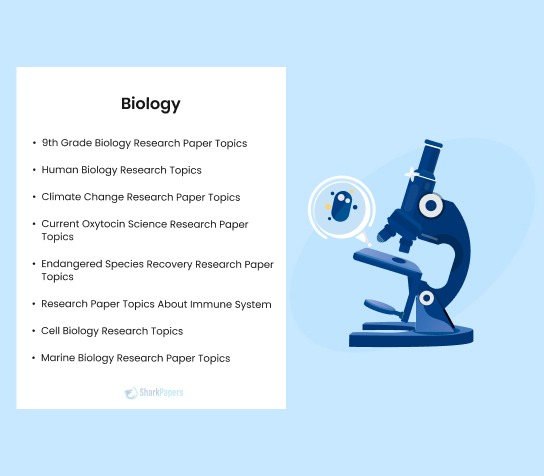
On this Page
Biology Research Paper Topics for Students
Choosing the right topic for a biology research paper is very important, and we're here to help you out. In this section, we'll provide you with a list of biology research paper ideas made just for researchers like you.
9th Grade Biology Research Paper Topics
- Cell Structure and Function: Exploring the Basics of Cells and Their Organelles
- Photosynthesis: Understanding How Plants Convert Sunlight into Energy
- DNA and Genetic Research: Mendelian Inheritance and Punnett Squares
- Human Anatomy: Investigating the Skeletal, Muscular, and Nervous Systems
- Microorganisms and Disease: Examining Bacteria, Viruses, and Fungi
- Ecosystems and Biodiversity: Roles of Plants and Animals in their Environments
- Evolutionary Concepts: Natural Selection and Adaptations
- Environmental Issues: Pollution, Climate Change, and Conservation
- Biotechnology Basics: Genetic Engineering and Its Applications
- Human Reproduction: Male and Female Reproductive Systems
Easy Biology Research Topics for High School Students
- The Impact of Climate Change on Local Ecosystems
- Genetic Disorders and Their Inheritance Patterns
- The Role of Microorganisms in Food Spoilage
- The Effects of Different Diets on Human Gut Microbiota
- Biodiversity Conservation in Urban Environments
- Investigating the Science Behind Vaccines and Immunization
- Human Evolution and Its Influences on Modern Society
- The Relationship Between Exercise and Cognitive Function
- Plant Cell Adaptations to Arid Environments
- The Influence of Pollution on Aquatic Ecosystems
Interesting Biology Research Topics For Grade 12
- Gene Editing Technologies: CRISPR-Cas9 and its Applications
- The Human Microbiome: Impacts on Health and Disease
- Mendelian Genetics: Inheritance Patterns and Genetic Disorders
- Evolutionary Biology: Mechanisms of Natural Selection
- Neurobiology: Understanding Brain Function and Neural Pathways
- Environmental Impact on Gene Expression: Epigenetics
- Cell Signaling Pathways: Communication within Cells
- Biotechnology in Medicine: Applications and Future Prospects
- Ecological Succession: Changes in Ecosystems Over Time
- The Carbon Cycle: Importance in Climate Regulation
Good Biology Research Topics for College Students
- Evolutionary Psychology: Understanding Human Behavior through Evolution
- Precision Medicine: Tailoring Treatments Based on Genetic Makeup
- Immunotherapy in Cancer Treatment: Harnessing the Immune System
- Ecological Impact of Invasive Species on Local Ecosystems
- Bioinformatics and Big Data in Genomics Research
- Regenerative Medicine: Stem Cells and Tissue Engineering
- Climate Change and its Effects on Marine Biology
- The Microbiome-Gut-Brain Axis: Linking Gut Health to Mental Health
- CRISPR-Cas9 and Gene Editing: Promises and Challenges
- Proteomics: Analyzing the Functions and Interactions of Proteins

Paper Due? Why Suffer? That's our Job!
Human Biology Research Topics
- Epigenetics and Human Health: Environmental Influences on Gene Expression
- Human Evolution: Genetic and Anthropological Perspectives
- Reproductive Biology: Fertility, Pregnancy, and Reproductive Disorders
- Cardiovascular Health: Physiology, Diseases, and Treatment Strategies
- Metabolic Syndrome: Links Between Obesity, Diabetes, and Cardiovascular Diseases
- Aging and Age-Related Diseases: Cellular and Molecular Mechanisms
- Stem Cell Therapies: Applications in Regenerative Medicine
- Neurodegenerative Diseases: Alzheimer's, Parkinson's, and Huntington's
- Nutrigenomics: Interactions Between Diet, Genes, and Health
- Personalized Medicine: Genomic Approaches to Tailored Healthcare
Basic Principles of Cloning Research Paper Topics
- Epigenetic Aspects of Cloned Organisms
- Cloning and Genetic Diversity: Implications for Species Conservation
- Stem Cell Cloning: Potential for Regenerative Medicine
- Comparative Analysis of Cloning Methods in Different Species
- Cloning and Reproductive Technologies: Fertility Treatments and Beyond
- Cloning in Biomedical Research: Models and Contributions
- Cloning and the Future of Organ Transplants
- Environmental Impact of Cloning: Ecological Considerations
- Cloning and Genetic Engineering in Pharmaceuticals
- Cloning and the Quest for Extinct Species Revival
Climate Change Research Paper Topics
- The Role of Human Activities in Climate Change
- Impact of Climate Change on Global Weather Patterns
- Rising Sea Levels: Causes and Consequences
- Climate Change and its Effects on Biodiversity
- The Relationship Between Greenhouse Gas Emissions and Global Warming
- Mitigation Strategies for Reducing Carbon Footprints
- The Impact of Climate Change on Agriculture and Food Security
- Extreme Weather Events and their Connection to Climate Change
- Polar Ice Melting: Consequences for Ecosystems and Sea Levels
- Climate Change and its Influence on Ocean Circulation
CRISPR and Genetic Engineering Research Paper Topics
- Off-Target Effects in CRISPR-Cas Editing: Challenges and Solutions
- CRISPR in Gene Therapy: Advancements and Limitations
- CRISPR and Synthetic Biology: Engineering Biological Systems
- CRISPR-Cas Systems in Microbial Biotechnology
- Regulatory Frameworks for CRISPR Applications in Different Countries
- CRISPR and Epigenome Editing: Modifying Gene Expression
- CRISPR and Functional Genomics: Unraveling Gene Functions
- Precision Medicine: Personalized Therapies Enabled by CRISPR
- CRISPR and Disease Resistance in Plants and Animals
- CRISPR-Cas Systems in Prokaryotes: Diversity and Evolutionary Insights
Current Oxytocin Science Research Paper Topics
- Oxytocin's Influence on Empathy and Emotional Processing
- Oxytocin and Autism Spectrum Disorders: Current Research Findings
- The Neurobiology of Oxytocin: Receptors, Signaling Pathways, and Modulation
- Oxytocin as a Potential Treatment for Mental Health Disorders
- Oxytocin and Bonding in Animal Models: Comparative Studies
- Oxytocin and Pain Perception: Mechanisms and Clinical Applications
- Oxytocin in the Context of Social Decision-Making and Trust Games
- Oxytocin and Cardiovascular Health: Exploring the Connection
- The Gut-Brain Axis: Oxytocin's Role in Intestinal Functions and Health
- Oxytocin and Aging: Implications for Cognitive Function and Well-being
Does Vaccination Have Benefits? Research Paper Topics
- Economic Impact of Vaccination on Healthcare Systems
- Vaccination and Global Health Equity: Challenges and Opportunities
- Emerging and Re-emerging Diseases: The Role of Vaccination in Prevention
- Vaccination in the Era of COVID-19: Lessons Learned and Future Strategies
- Vaccine Hesitancy: Identifying Factors and Developing Effective Communication Strategies
- The Role of Vaccination in Maternal and Child Health
- Vaccination and Antibiotic Resistance: A Holistic Approach to Disease Prevention
- Immunization in High-Risk Populations: Tailoring Strategies for Vulnerable Communities
- Vaccine Diplomacy: International Collaboration in Disease Prevention
- Advances in Vaccine Technology: RNA Vaccines and Beyond
Endangered Species Recovery Research Paper Topics
- Human-Wildlife Conflict Resolution: Enhancing Coexistence for Endangered Species
- Conservation Policies and Legislation: Assessing Effectiveness in Species Recovery
- Technology in Conservation: Drones, Satellites, and their Applications for Endangered Species Monitoring
- Community Engagement in Conservation: Building Support for Endangered Species Recovery
- Ecotourism and Conservation: Balancing Economic Interests with Wildlife Protection
- Assessing the Effectiveness of Protected Areas in Endangered Species Recovery
- Behavioral Ecology of Endangered Species: Understanding Patterns for Conservation
- Disease Management in Endangered Species: Risks and Strategies
- The Role of Citizen Science in Monitoring and Protecting Endangered Species
- Cross-Border Collaboration in Endangered Species Recovery: Challenges and Opportunities
Hormonal Control of Reproductive System Research Paper Topics
- Gonadotropin-releasing hormone (GnRH): Central Regulator of Reproductive Hormones
- Follicle-Stimulating Hormone (FSH) and Luteinizing Hormone (LH): Their Roles in Ovarian and Testicular Function
- Estrogen and Progesterone: Hormonal Regulation of the Female Reproductive System
- Testosterone: Key Player in Male Reproductive Physiology
- Hypothalamic-Pituitary-Gonadal Axis: Coordinated Control of Reproductive Hormones
- Hormonal Changes during the Menstrual Cycle: Implications for Fertility
- Thyroid Hormones and Reproduction: Interactions and Impact
- Prolactin: Role in Reproduction and Lactation
- Kisspeptin: Emerging Regulator of Reproductive Hormones
- Hormonal Control of Spermatogenesis: Insights into Male Fertility
Research Paper Topics About Human Hormones
- Insulin and Glucagon: Hormonal Control of Blood Sugar Levels
- Hormones and Sleep: Understanding the Circadian Rhythms
- Reproductive Hormones in Men and Women: Beyond Fertility
- Hormonal Influences on Mood and Behavior: Neuroendocrinology
- Oxytocin: The "Love Hormone" and Social Bonding
- Hormonal Regulation of Bone Health: Osteoporosis and Beyond
- Hormones and Cardiovascular Health: Implications for Heart Disease
- Melatonin: Circadian Rhythms and Sleep-Wake Cycles
- Endocrine Disruptors: Environmental Impact on Hormonal Balance
- Hormones and the Immune System: Interactions and Immunomodulation
Research Paper Topics About Immune System
- Immunotherapy in Cancer Treatment: Current Advances and Future Directions
- Autoimmune Diseases: Unraveling Mechanisms and Therapeutic Strategies
- Role of Gut Microbiota in Immune System Regulation
- Vaccines and Immunization: Advancements and Global Health Impacts
- Innate Immune System: Key Players and Responses to Pathogens
- Adaptive Immune System: Understanding Antigen Recognition and Memory
- Immunodeficiency Disorders: Causes, Diagnosis, and Treatment
- Inflammatory Responses in Autoimmune Diseases: Targeting Therapeutic Interventions
- Cross-Talk Between the Immune System and the Nervous System
- Immunosenescence: Aging and Changes in Immune Function
Research Paper Topics About Animal Habitats Conservation
- Conservation of Migratory Species: Challenges and International Collaboration
- Protected Areas and Their Role in Preserving Animal Habitats
- Human-Wildlife Conflict: Balancing Conservation and Human Needs
- Climate Change and Animal Habitats: Adaptive Management Strategies
- Conservation of Endangered Ecosystems: Lessons from Success Stories
- Wetland Conservation: Importance for Waterfowl and Biodiversity
- The Role of Connectivity in Habitat Conservation: Corridors and Networks
- Conservation of Grasslands and Savannas: Sustaining Open Habitats
- Alpine Ecosystem Conservation: Challenges at High Altitudes
- Tropical Rainforest Conservation: Addressing Deforestation and Biodiversity Loss
Research Paper Topics About Biology Behind The Bipolar Disorder
- Inflammatory Markers and Immune Dysregulation in Bipolar Disorder
- Neuroplasticity and Bipolar Disorder: Implications for Treatment
- Mitochondrial Dysfunction in Bipolar Disorder: Energy Metabolism Perspectives
- Neuroendocrine Aberrations in Bipolar Disorder: Cortisol and Stress Response
- Sleep Disturbances and Circadian Disruptions in Bipolar Disorder
- Oxidative Stress and Antioxidant Defense in Bipolar Disorder
- Hormonal Influences on Bipolar Disorder: Estrogen and Testosterone
- Gut-Brain Axis and Bipolar Disorder: Role of the Microbiome
- Pharmacogenomics of Bipolar Medications: Personalized Approaches
- Animal Models in Bipolar Disorder Research: Bridging the Biological Gap
Research Paper Topics About Can Abortion Be Safe?
- Comparative Analysis of Abortion Safety: Surgical vs. Medical Methods
- Access to Safe Abortion Services: Global Disparities and Challenges
- Impact of Legal Restrictions on Abortion Safety: A Public Health Perspective
- Telemedicine and Abortion: Safety, Accessibility, and Regulatory Considerations
- Psychological Well-being After Abortion: Longitudinal Studies and Meta-Analyses
- Quality of Care in Abortion Services: Patient Experiences and Healthcare Provider Perspectives
- Innovations in Abortion Techniques: Advancing Safety and Efficacy
- Post-Abortion Care: Addressing Complications and Ensuring Patient Support
- Public Health Interventions to Improve Abortion Safety: Lessons from Successful Programs
- Abortion in Humanitarian Crises: Ensuring Safe Services in Challenging Environments
Cell Biology Research Topics
- Cellular Senescence: Aging at the Cellular Level
- Cytoskeleton Dynamics: Microtubules, Microfilaments, and Intermediate Filaments
- Apoptosis and Programmed Cell Death: Molecular Mechanisms
- Cellular Reprogramming and Induced Pluripotent Stem Cells
- Human DNA Replication and Repair Mechanisms in Cell Biology
- Cell Adhesion Molecules: Functions in Development and Disease
- Ion Channels and Membrane Transport in Cell Physiology
- Stem Cell Niche: Microenvironment Regulation and Stem Cell Fate
- Cell Differentiation: Molecular Signals and Transcriptional Control
- Organelle Biogenesis and Dynamics in Cellular Function
Marine Biology Research Paper Topics
- Coral Reef Ecology: Threats, Conservation, and Restoration
- Marine Biodiversity: Assessing Patterns and Drivers
- Ocean Acidification: Impacts on Marine Life and Ecosystems
- Deep-Sea Bioluminescence: Adaptations and Ecological Significance
- Marine Mammal Communication: Vocalizations and Social Behaviors
- Plastic Pollution in Oceans: Effects on Marine Life and Mitigation Strategies
- Marine Microorganisms: Roles in Biogeochemical Cycling and Climate Regulation
- Fisheries Management: Sustainable Practices and Overfishing Concerns
- Marine Protected Areas: Effectiveness and Challenges in Conservation
- Seagrass Ecology: Importance in Coastal Ecosystems and Restoration Efforts
Research Paper Topics for Environmental Psychology
- Impact of Urban Design on Human Well-being: A Psychological Perspective
- Nature-Based Therapies: The Psychological Benefits of Green Spaces
- Environmental Stressors in Urban Environments: Coping Mechanisms and Interventions
- Psychological Effects of Climate Change: Understanding and Mitigating Anxiety
- Pro-environmental Behavior: Factors Influencing Sustainable Practices
- Restorative Environments: Exploring the Role of Nature in Stress Recovery
- The Influence of Environmental Aesthetics on Emotional Well-being
- Connection to Nature and its Relationship to Mental Health
- Environmental Justice: Psychosocial Impacts of Unequal Environmental Exposures
- Place Attachment and Identity: How People Form Bonds with their Environment
Evolutionary Biology Research Paper Topics
- Evolutionary Medicine: Understanding Human Health in an Evolutionary Context
- Evolutionary Psychology: Behavioral Adaptations and Human Evolution
- Evolutionary Conservation Biology: Balancing Conservation and Evolutionary Processes
- Evolutionary Genetics: Genetic Variation, Selection, and Adaptation
- Paleontology and Evolution: Fossil Record and Insights into Ancient Life Forms
- Evolution of Social Behavior: Cooperation, Altruism, and Kin Selection
- Evolutionary Insights into Aging and Senescence
- Evolution of Sex: Theories and Mechanisms
- Phylogeography: Evolutionary History and Geographic Distribution of Species
- Evolutionary Perspectives on Human Origins and Migration Patterns
Research Paper Topics About How Addictive Substances Affect Our Genes?
- Epigenetic Modifications Induced by Substance Abuse: Unraveling the Molecular Mechanisms
- Impact of Addictive Substances on DNA Methylation Patterns
- Genetic Vulnerability to Substance Addiction: Identifying Risk Factors
- Neurotransmitter Receptor Gene Expression and Substance Dependence
- Epigenetic Changes in Offspring Due to Parental Substance Use
- Substance Abuse and DNA Repair Mechanisms: Implications for Genomic Stability
- Epigenetic Regulation of Reward Pathways in the Brain: Role in Addiction
- Long-Term Effects of Addictive Substances on Gene Expression
- Pharmacogenomics of Addiction Treatment: Personalized Approaches
- Epigenetic Biomarkers of Substance Addiction: Diagnostic and Therapeutic Potential
Human Cloning Biology Topics
- Somatic Cell Nuclear Transfer (SCNT) in Human Cloning: Techniques and Applications
- Ethics of Human Cloning: Considerations and Controversies
- Genetic and Epigenetic Consequences of Cloning: Insights from Animal Models
- Cloning for Reproductive Purposes: Challenges and Ethical Implications
- Therapeutic Cloning: Potential Applications in Regenerative Medicine
- Legal Frameworks and Regulations Surrounding Human Cloning
- Mitochondrial Replacement Techniques: Addressing Genetic Disorders through Cloning
- Cloning and Genetic Diversity: Evaluating the Impact on Population Genetics
- Cloned Organisms and Aging: Exploring Telomere Dynamics and Longevity
- Challenges in Cloning Human Organs for Transplantation
Research Paper Topics on Immune System And Stress
- Stress and the Immune System: Interactions and Bidirectional Influences
- Psychoneuroimmunology: Understanding the Connection between Stress, Brain, and Immunity
- Chronic Stress and Inflammation: Implications for Health and Disease
- Acute Stress Responses and Their Immediate Impact on Immune Function
- Stress-Induced Changes in Immune Cell Distribution and Activity
- Neuroendocrine Regulation of Immune Responses during Stress
- Stress and Autoimmune Diseases: Unraveling the Complex Relationship
- Impact of Early Life Stress on Immune System Development
- Coping Mechanisms and Stress Reduction Interventions: Effects on Immune Function
- Psychological Stress and Susceptibility to Viral Infections
Research Paper Topics for Infectious Diseases
- Epidemiology of Respiratory Viruses: Influenza, COVID-19, and Beyond
- Bacterial Pathogenesis: Mechanisms of Infection and Host Responses
- Waterborne Diseases: Contaminated Water Sources and Public Health Risks
- Neglected Tropical Diseases: Challenges in Diagnosis, Treatment, and Eradication
- Fungal Infections: Rising Incidence and Novel Therapeutic Approaches
- Surveillance and Control of Nosocomial Infections in Healthcare Settings
- Viral Hepatitis: Global Burden, Prevention, and Treatment Strategies
- Tuberculosis: Advances in Diagnosis, Treatment, and Drug Development
- Helminthic Infections: Parasitic Worms and their Impact on Human Health
- Epidemiology of Sexually Transmitted Infections: Trends and Challenges
Research Paper Topics for Molecular Biology
- Protein Folding and Misfolding: Implications in Diseases
- DNA Repair Mechanisms: Maintaining Genomic Integrity
- Molecular Basis of Cancer: Oncogenes, Tumor Suppressors, and Signaling Pathways
- Telomeres and Telomerase: Maintaining Chromosomal Integrity
- Synthetic Biology: Engineering Biological Systems for Practical Applications
- Molecular Mechanisms of Apoptosis: Programmed Cell Death
- Signal Transduction Pathways: Molecular Communication within Cells
- Molecular Biology of Aging: Understanding the Cellular Aging Process
- Gene Expression Profiling: Techniques and Applications in Molecular Biology
- Structural Biology: Revealing the Three-Dimensional Architecture of Biomolecules
Research Paper Topics for Organ Transplantation
- Immune Responses to Transplanted Organs: Mechanisms and Alloreactivity
- Organ Preservation Techniques: Advances and Challenges in Transplantation
- Organ Transplantation and Xenotransplantation: Current Status and Future Prospects
- Donor-Recipient Matching in Organ Transplantation: Immunological Considerations
- Ischemia-Reperfusion Injury in Transplanted Organs: Molecular Mechanisms and Prevention
- Organ Allocation and Distribution: Ethical Dilemmas and Policy Considerations
- Regenerative Medicine Approaches in Organ Transplantation: Tissue Engineering and Stem Cells
- Living Organ Donation: Medical, Ethical, and Psychosocial Implications
- Immunomodulatory Therapies in Organ Transplantation: Impact on Graft Survival
- Biomarkers in Transplantation: Monitoring and Predicting Allograft Function
Research Paper Topics for Plant Pathology
- Fungal Plant Pathogens: Identification, Classification, and Control
- Bacterial Plant Pathogens: Mechanisms of Infection and Disease Management
- Viral Diseases in Plants: Molecular Biology and Strategies for Control
- Plant Immunity and Defense Mechanisms Against Pathogens
- Phytophthora infestans and Late Blight: History, Impact, and Management
- Epidemiology of Plant Diseases: Understanding Spread and Impact
- Host-Pathogen Interactions: Molecular Dialogue in Plant-Pathogen Relationships
- Integrated Pest Management in Agriculture: Strategies for Sustainable Disease Control
- Genomic Approaches in Plant Pathology: Unraveling the Molecular Basis of Resistance
- Emerging Plant Diseases: Identification, Characterization, and Preparedness
Plant Biology Research Topics
- Photosynthesis: Understanding Mechanisms and Enhancing Efficiency
- Plant Hormones: Roles in Growth, Development, and Response to Stress
- Disease Resistance in Plants: Molecular Mechanisms and Genetic Engineering
- Plant-Microbe Interactions: Symbiosis and Pathogenesis
- Seed Germination: Environmental Cues and Molecular Regulation
- Genetic Diversity in Crop Plants: Conservation and Utilization
- Climate Change and Plant Adaptations: Implications for Agriculture
- Phytoremediation: Plants as Tools for Environmental Cleanup
- Plant Epigenetics: Epigenetic Modifications and Gene Regulation
- Plant Physiology Under Abiotic Stress: Drought, Salinity, and Temperature
Research Paper Topics for Prions
- Prion Diseases: Overview, Classification, and Epidemiology
- Prion Protein Structure: Insights into Misfolding and Aggregation
- Cellular Prion Protein (PrPC) Function and Implications in Health
- Prion Strains: Diversity, Characteristics, and Disease Variability
- Prion Transmission: Routes, Mechanisms, and Zoonotic Potential
- Neurodegenerative Effects of Prions: Impact on Brain Function
- Prion Diseases in Humans: Creutzfeldt-Jakob Disease and Variant CJD
- Prion Diseases in Animals: Bovine Spongiform Encephalopathy (BSE) and Scrapie
- Prion Detection Methods: Advances and Challenges in Diagnosis
- Prion Strain Adaptation and Evolution: Molecular Mechanisms
Tough Essay Due? Hire Tough Writers!
Research Paper Topics for Social Behavior in Animals
- Altruism in Social Animals: Evolutionary Explanations and Adaptive Benefits
- Communication Strategies in Social Insects: Chemical, Visual, and Acoustic Signals
- Dominance Hierarchies in Animal Societies: Mechanisms and Functions
- Social Learning in Animals: Observational Learning and Cultural Transmission
- Mate Choice and Sexual Selection: Social Dynamics in Animal Courtship
- Cooperative Breeding in Social Birds and Mammals: Mechanisms and Benefits
- Agonistic Behavior in Social Groups: Conflict Resolution and Communication
- Parental Care in Social Animals: Roles, Strategies, and Cooperation
- Territoriality in Animal Societies: Defense and Resource Management
- Group Dynamics in Primates: Social Structure and Hierarchy
Research Paper Topics for Stem Cells
- Pluripotent Stem Cells: Induction, Differentiation, and Applications
- Adult Stem Cells: Niches, Identification, and Regenerative Potential
- Hematopoietic Stem Cells: Biology and Clinical Applications in Blood Disorders
- Mesenchymal Stem Cells: Therapeutic Potential in Tissue Engineering and Regenerative Medicine
- Induced Pluripotent Stem Cells (iPSCs): Reprogramming and Applications
- Neural Stem Cells: Development, Function, and Neuroregeneration
- Cancer Stem Cells: Origin, Identification, and Targeted Therapies
- Stem Cell-Based Therapies for Cardiovascular Regeneration
- Ethical Considerations in Stem Cell Research: Cloning, Genome Editing, and Beyond
- Stem Cells in Ophthalmology: Vision Restoration and Retinal Diseases
Biological Psychology Research Paper Topics
- Neurotransmitters and Behavior: Examining the Role of Dopamine, Serotonin, and Acetylcholine
- Neuroplasticity: Implications for Learning, Memory, and Brain Rehabilitation
- Brain Imaging Techniques: Advances in Functional Magnetic Resonance Imaging (fMRI) and Neuroimaging
- Hormones and Behavior: Exploring the Influence of Endocrine System on Psychological Processes
- Genetics and Mental Health: Investigating the Role of Genetic Factors in Psychiatric Disorders
- Neurobiology of Stress: Impact on Cognitive Function and Emotional Well-being
- Sleep and Brain Function: Understanding the Relationship between Sleep and Mental Health
- Neurological Basis of Addiction: Mechanisms of Substance Abuse and Dependence
- Neurodevelopmental Disorders: Exploring the Brain Basis of Autism Spectrum Disorder (ASD)
- Emotion and the Brain: Neural Substrates of Emotional Processing
Controversial Biology Topics Research Paper
- Genetic Engineering and Designer Babies: Ethical Considerations
- Cloning of Animals and Humans: Scientific Advancements and Moral Dilemmas
- Gene Editing Technologies (e.g., CRISPR): Potential and Ethical Concerns
- Embryonic Stem Cell Research: Moral and Religious Perspectives
- Human Enhancement Technologies: Biological and Ethical Implications
- Vaccination Controversies: Public Health, Safety, and Individual Rights
- Evolution vs. Creationism: Teaching Perspectives in Schools
- Animal Testing: Ethical Considerations in Scientific Research
- Endangered Species Conservation: Balancing Preservation and Human Needs
- Climate Change Skepticism: Scientific Consensus and Public Perception
How to Choose a Biology Research Topic?
Choosing a research paper topic can be an exciting but challenging task. Here's a guide on how to choose biology research topics:
- Identify Your Interests: Consider what aspects of biology interest you the most.
Whether it's genetics, ecology, physiology, or any specific field, choosing a topic aligned with your interests makes the research process more engaging.
- Explore Current Trends: Stay updated on current trends and breakthroughs in biology.
Investigate recent publications, journals, and news to find emerging topics that pique your curiosity.
- Consider the Scope: Determine the scope of your research.
Choose a topic that is neither too broad nor too narrow. It should be specific enough to explore in-depth but broad enough to find relevant literature and resources.
- Consult with Mentors or Instructors: Seek advice from mentors, instructors, or research advisors.
They can provide insights into feasible and interesting research areas, as well as guidance on available resources.
- Think About Real-World Applications: Explore topics with real-world applications.
Consider how the research can contribute to solving practical problems or advancing technologies.
- Consider Ethical Implications: Be mindful of ethical considerations.
Ensure that your research topic aligns with ethical standards and guidelines in the field of biology.
In conclusion, choosing a biology research topic is a crucial step in your academic journey. A well-chosen topic not only contributes to scientific knowledge but also enhances your understanding of biology.
But if you feel overwhelmed choosing a topic or writing a research paper about any topic, let SharkPapers.com assist you with professional services.
Our experts will help you write your paper as well as edit and proofread it for you!
So, don’t waste time! Hire an expert paper writing service online today!

Barbara has a Ph.D. in public health from an Ivy League university and extensive experience working in the medical field. With her practical experience conducting research on various health issues, she is skilled in writing innovative papers on healthcare. Her many works have been published in multiple publications.
Was This Blog Helpful?
Keep reading.
- Learning How to Write a Research Paper: Step-by-Step Guide
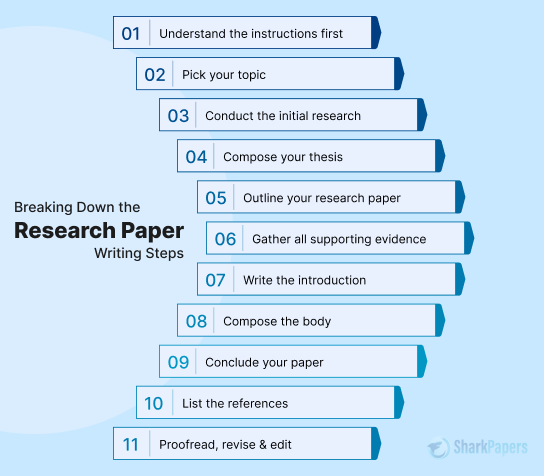
- Best 300+ Ideas For Research Paper Topics in 2024

- A Complete Guide to Help You Write a Research Proposal

- The Definitive Guide on How to Start a Research Paper
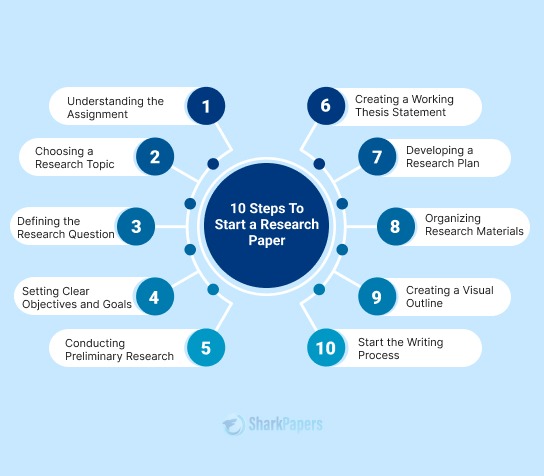
- How To Write An Introduction For A Research Paper - A Complete Guide

- Learn How To Write An Abstract For A Research Paper with Examples and Tips

- How to Write a Literature Review for a Research Paper | A Complete Guide

- How To Write The Methods Section of A Research Paper
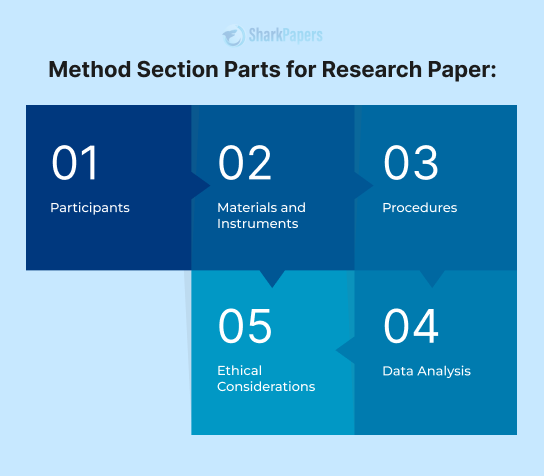
- How to Write a Research Paper Thesis: A Detailed Guide

- How to Write a Research Paper Title That Stands Out

- A Detailed Guide on How To Write a Conclusion for a Research Paper

- How To Write The Results Section of A Research Paper | Steps & Tips
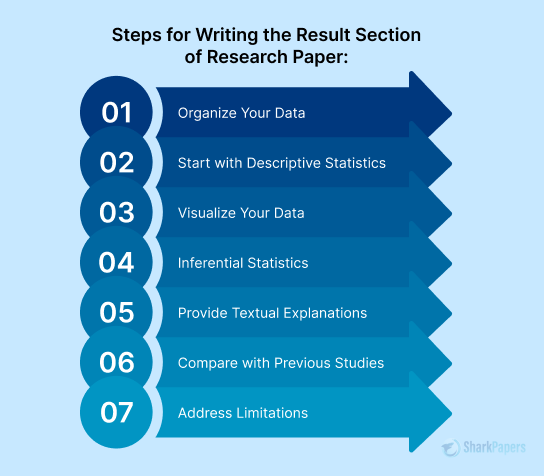
- How to Problem Statement for a Research Paper: An Easy Guide

- How to Find Credible Sources for a Research Paper
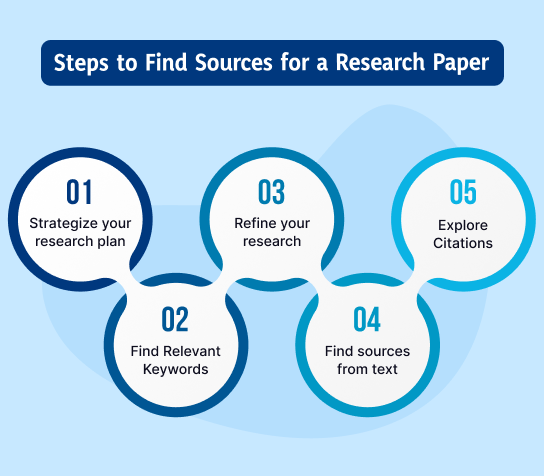
- A Detailed Guide: How to Write a Discussion for a Research Paper
)
- How To Write A Hypothesis In A Research Paper - A Simple Guide

- Learn How To Cite A Research Paper in Different Formats: The Basics

- The Ultimate List of Ethical Research Paper Topics in 2024

- 150+ Controversial Research Paper Topics to Get You Started
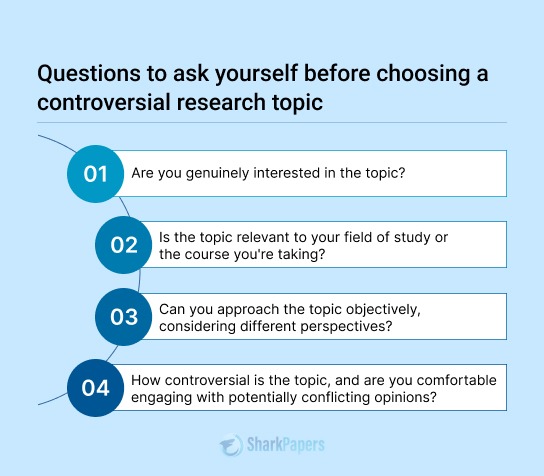
- How to Edit Research Papers With Precision: A Detailed Guide

- A Comprehensive List of Argumentative Research Paper Topics
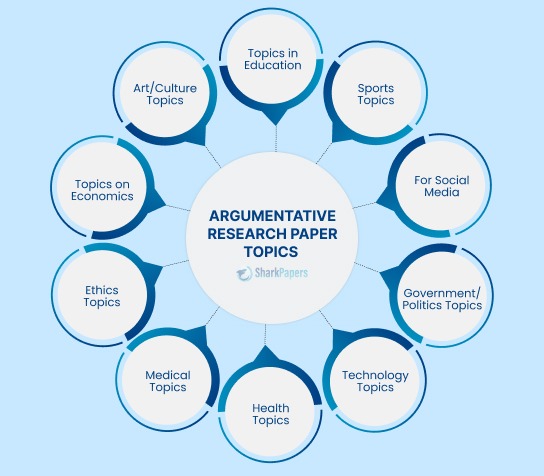
- A Detailed List of Amazing Art Research Paper Topics

- 230 Interesting and Unique History Research Paper Topics

- 190 Best Business Research Paper Topics
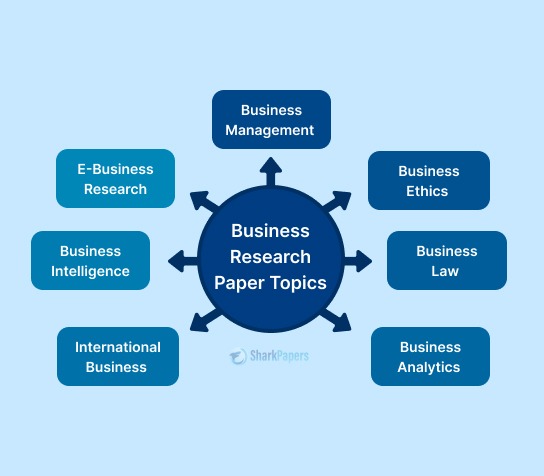
- 200+ Engaging and Novel Literature Research Paper Topics
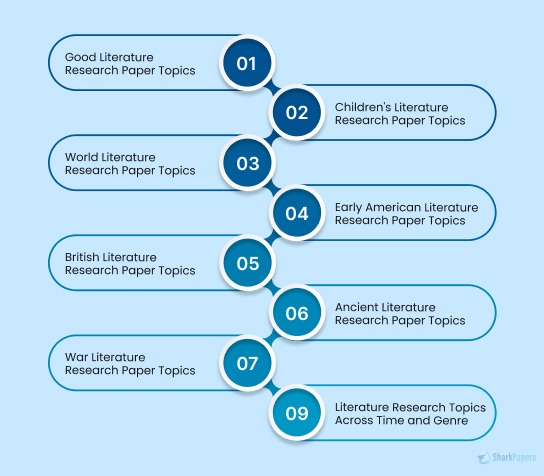
- A Guide on How to Write a Social Science Research
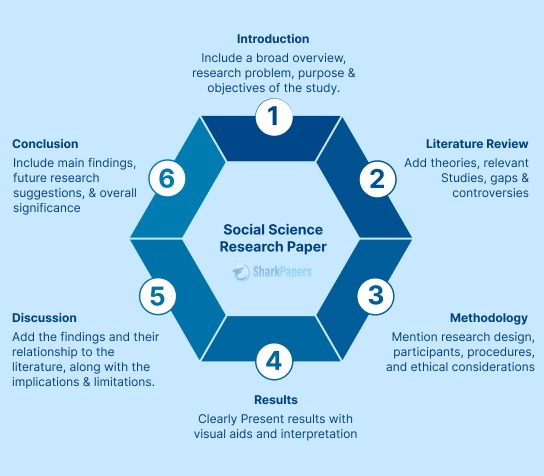
- Sociology Research Papers: Format, Outline, and Topics
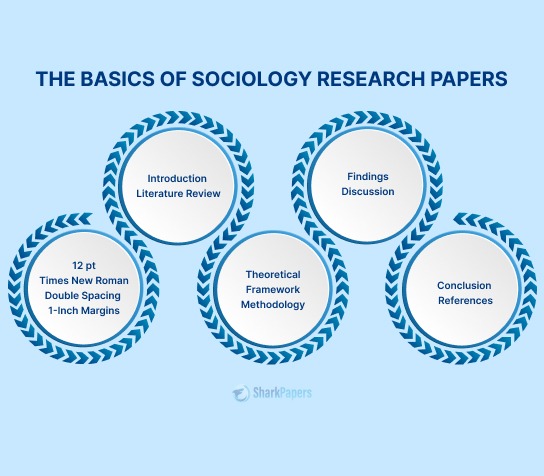
- Understanding the Basics of Biology Research Papers

- How to Write a Psychology Research Paper: Guide with Easy Steps
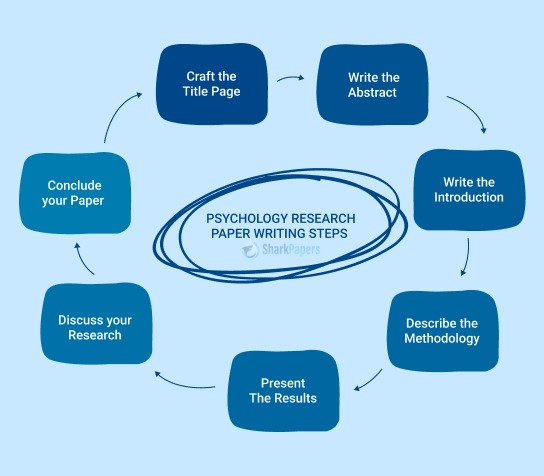
- Exploring the Different Types of Research Papers: A Guide
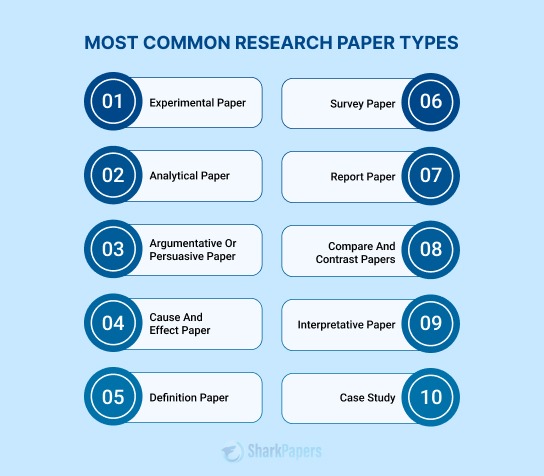
People Also Read
- acs citation
- descriptive essay
- press release
- how to write an essay
- ieee citation
Burdened With Assignments?

Advertisement
© 2024 - All rights reserved
2000+ SATISFIED STUDENTS
95% Satisfaction RATE
30 Days Money Back GUARANTEE
95% Success RATE
Privacy Policy | Terms & Conditions | Contact Us
© 2021 SharkPapers.com(Powered By sharkpapers.com). All rights reserved.
© 2022 Sharkpapers.com. All rights reserved.
LOGIN TO YOUR ACCOUNT
SIGN UP TO YOUR ACCOUNT
- Your phone no.
- Confirm Password
- I have read Privacy Policy and agree to the Terms and Conditions .
FORGOT PASSWORD
- SEND PASSWORD
Custom Essay, Term Paper & Research paper writing services
- testimonials
Toll Free: +1 (888) 354-4744
Email: [email protected]
Writing custom essays & research papers since 2008
Top 100 biology research topics for high school and college.

Writing a biology essay may not sound like a very difficult thing to do. In fact, most students really like this subject. The problem is not that you can’t write a good paper on a topic in biology. The problem is with finding excellent biology research topics. Now, you may be wondering why you would want to invest so much time into finding great biology research paper topics. After all, what you write in the essay matters more than the topic, right? Wrong! We are here to tell you that professors really appreciate interesting and unique topics.
And it makes a lot of sense, if you think about it. If you simply pick one of the most popular biology research topics, you will never be able to pique the interest of your teacher. He has read dozens, if not hundreds, or papers on that exact same topic. What you want to do is come up with interesting biology research topics. You want to find topics that none of your classmates are thinking of writing an academic paper about. You will shortly see why this is important. And we will also give you 100 biology topics for research projects that you can use for free – right now!
Biology Research Paper Topics Really Are Important!
It doesn’t matter what area of biology you need to write about. This information applies to everything from zoology and botany to anatomy. The reality is that your professor will really appreciate good topics. And you can rest assured that he or she knows how to spot them. The moment the professor starts to read your paper, he or she will immediately realize that you really did your best to find an excellent topic. And if you write a good introduction paragraph (which contains a captivating thesis statement as well), you are in the best position to earn bonus points.
You may not be aware of it, but teachers are willing to treat great papers with more leniency. This means that you will not get penalized for minor mistakes if you come up with a great topic. In other words, you will get a better grade on your papers if you manage to come up with good research topics for biology. This is a fact and it is based on thousands of pieces of feedback from our readers.
How Do You Choose Good Biology Research Topics?
Choosing research topics for biology can be a daunting task. Frankly, the research paper topics biology students are looking for are not easy to come by. The first thing you want to avoid is going to the first website that pops up in Google and getting your ideas from there. Most of your peers will do the same. Also, avoid topics that are extremely simple. You will simply not have enough ideas to write about. Of course, you should avoid overly complex topics because finding information about them may be extremely difficult.
The best way to find a good topic, in our opinion, is to get in touch with an academic writing company. You will get access to a professional writer who knows exactly what professors are looking for. A writer will quickly give you an amazing research topic in biology.
Eloquent Examples of Popular Biology Research Topics
To make things as simple as possible for you, we’ve put together a list of biology research project ideas. You will find 100 topics on various subjects below. Of course, you can use any of our topics for free. However, keep in mind that even though we are doing our best to maintain this list fresh, other students will find it as well. If you need new topics for your next biology essay, we recommend you to get in touch with us. We monitor our email address, so we can help you right away. Also, you can buy a research paper from our service.
Biology Research Topics for High School
Are you looking for biology research topics for high school? These are relatively simple when compared to college-level topics. Here are a couple of topic ideas that high school students will surely appreciate:
- Identifying Three Dead Branches of Evolution.
- What Is Sleep?
- How Does Physical Exercise Affect the Metabolism?
- A Behavioral Study of Birds.
- How Does Music Affect Your Brain?
- Climate Change and Biodiversity.
- Are Bees Really Becoming Extinct?
- Rainforest Extinction Is Dangerous.
- The Benefits of Organic Farming.
- Can the Brain Repair Itself?
- The Effect of Bacteria on Depression.
- How Do Sea Animals Camouflage?
Research Topics in Biology for Undergraduates
Research topics in biology for undergraduates are more complex than high school or college topics. Our researchers did their best to find topics that are relatively complex. However, each one of the following topics has plenty of information about it online:
- What Is the Mechanism of Metastasis in Cancer Patients?
- How Do Tumor Suppressor Genes Appear?
- How Can We Destroy Cancer Cells Without Damaging Other Cells?
- The Benefits of Gene Therapy.
- Analyzing the Huntington’s Disease (the HTT Gene).
- How Does the down Syndrome (Trisomy of 21st Chromosome) Appear?
- Analyzing the Brain Activity During an Epileptic Seizure.
- How Are Our Memories Formed and Preserved?
- The Effect of Probiotics on Infections.
- Analyzing Primate Language.
- Analyzing Primate Cognitive Functions.
- The Link Between Darwin’s Theory and Biology.
Biology Research Topics for College Students
Biology research topics for college students are of moderate difficulty. They are easier than undergrad topics and more complex than high school topics. While compiling this list, we made sure you have more than enough information online to write the paper quickly:
- Using DNA Technology in the Field of Medical Genetics.
- The Effect of Drinking on Embryonic Development.
- How Are Genes Mapped and Cloned?
- Explain What Genetic Polymorphism Is.
- What Is a Hereditary Disease?
- The Effect of Drugs on Embryonic Development.
- Describing Oligogenic Diseases (like Hirschsprung Disease)
- What Is the Mendelian Inheritance?
- How Transcriptomics and Proteomics Changed Modern Medicine.
- The Risk Factors of Infertility Explained.
- How Does Aging Effect Infertility?
- What Do Ash Elements Do in a Plant?
- Explaining the Pigments in a Plant Cell.
- How Is Photosynthesis Done?
- The Role of Fats in Plant Cells.
- The Effect of Smoking on Embryonic Development.
Cell Biology Research Topics
Some of the best biology topics are cell biology research topics. The scientific community is constantly making progress in this area, so there is always something new to write about. Here are some of the best examples:
- What Is Regenerative Medicine?
- A Closer Look at Tissue Engineering.
- Discuss the Future of Regenerative Medicine.
- Analyzing Therapeutic Cloning.
- The Pros and Cons of Creating Artificial Organs.
- How Do Cell Age?
- Can We Reverse Cell Aging?
- Advances in Cell Therapy.
- What Is Cell Adhesion?
- Explaining Cell Division.
- What Is Cellular Metabolism?
- Describe Active and Passive Transport in Cells.
- What Are Cell Plastids?
Evolutionary Biology Research Paper Topics
If you want something more complex, you can try your hand at writing on evolutionary biology research paper topics. As with all our topics, you will be able to find a lot of ideas and information online. Here are our picks:
- Where Did Plants Come From? (The Evolutionary Theory)
- Explaining the Host-parasite Coevolution.
- How Did Parasites Evolve over Time?
- What Is Natural Selection and How Does It Work?
- Explain Sexual Selection.
- Explain Sexual Conflict.
- How Did Our Immune Systems Evolve?
- How Do New Species Appear in the Wild?
- The Evolution of Cell Respiration.
- What Is the Hippo Pathway? (Developmental Biology)
Various Topics
Antibiotics resistance, agriculture and cloning are hot subjects nowadays. Your professor will surely be interested to learn more about biology research topics. Here is a mix of topic ideas from our established community of academic writers:
- The Problem of Using Antibiotics on Large Scale.
- Examining the Effects of Salt on Plants.
- What Is DNA Technology?
- The Effects of GMOs on the Human Body.
- How Is the Quality of Antibiotics Controlled?
- How Are GMO Food Crops Created?
- The Effect of Veterinary Antibiotics on Humans.
- The Allergic Reactions to Specific Antibiotics.
- A Look at How Penicillin Works in the Human Body.
- How Are Antibiotics Obtained?
- What Are Natural Biochemicals with Pest-repellent Properties?
- The 3 Most Toxic Effects of Antibiotics
- How the Human Body Develops Resistance to Antibiotics.
- The Impact of Biology on the Us Agriculture.
- What Is the Green Revolution?
- Analyzing the Minerals in the Plant Cell.
- Analyzing Muscle Development and Regeneration
- The Uses of Cancer Stem Cells.
Marine Biology Research Topics
There is a lot of talk about global warming, about microplastics in our oceans, and about endangered marine species. This means that marine biology research topics are a very hot topic today. Here are some of our best ideas:
- Can GMO Organisms Break down Oil after Maritime Accidents?
- Pollution-absorbing Bio-films.
- Microbes That Can Absorb Toxic Compounds in the Water.
- Can We Really Use Bioluminescence?
- How Is Bio-diesel Created?
- Analyzing the Coral Reef Biology.
- Why Is the Lobster Population Dwindling?
- The Effect of Mass Fishing on the World’s Oceans.
- Global Warming and Its Effect on Marine Microorganisms.
Molecular Biology Research Topics
Writing about molecular biology research topics is not easy. However, it’s a foolproof way to get a top grade. Your professor will really appreciate your willingness to write an essay about a complex topic. Just make sure you know what you are talking about. Below you can find some of the best topics:
- How Is Insulin Produced?
- How Is the Growth Hormone Produced?
- Analyzing the Repropagation of Translation.
- What Is DNA-telomerase?
- The Process of Sequencing Nucleotides in DNA.
- What Is Telomerase?
- The Link Between Telomerase and Cancer.
- The Link Between Telomerase and Aging.
- How Does DNA Forensics Work?
- Describe the Process of Protein Metabolism.
There is no such thing as easy biology research topics. When the topic is too simple, you end up getting penalized. You can’t write 500 words about it without straying away from the subject. Also, no matter how interesting the topic may be, you should make sure that the essay is written perfectly. This means that not even interesting biology research topics can save you from a bad grade if you fail to follow all applicable academic writing standards.
Find it hard to cope with your college paper? Great news! Use promo “ mypaper20 ” and enjoy 20% discount on a biology writing assignment from our profs!

- Privacy Policy
Buy Me a Coffee

Home » 350+ Biology Research Topics
350+ Biology Research Topics

Biology is a vast field of study that explores the diverse aspects of life, from the smallest organisms to the complex ecosystems they inhabit. With new discoveries being made every day, the field of biology is constantly evolving and expanding. As a result, there are numerous research topics within biology that can capture the imagination of students, researchers , and professionals alike. Whether you’re interested in genetics, ecology, microbiology, or any other subfield of biology, there is no shortage of fascinating topics to explore. In this post, we will discuss some of the most compelling biology research topics that you can delve into.
Biology Research Topics
Biology Research Topics are as follows:
- The role of gut microbiota in human health and disease.
- The effects of climate change on animal behavior and physiology.
- The molecular mechanisms of cancer development and progression.
- The evolutionary origins of human language.
- The impact of pesticides on insect populations and ecosystems.
- The genetic basis of aging and longevity.
- The ecological importance of microbial communities in soil.
- The physiology and behavior of marine mammals.
- The molecular mechanisms of viral infections.
- The evolutionary history of flowering plants.
- The ecological impacts of invasive species.
- The role of epigenetics in gene regulation and disease.
- The evolution of social behavior in animals.
- The physiology and ecology of birdsong.
- The impact of antibiotics on gut microbiota and human health.
- The role of the microbiome in psychiatric disorders.
- The evolutionary history of human migrations.
- The ecological and physiological effects of light pollution on animals.
- The mechanisms of cell division and differentiation.
- The ecological impacts of deforestation.
- The molecular mechanisms of drug addiction.
- The genetic basis of plant resistance to pests and diseases.
- The evolutionary history of human diet and nutrition.
- The molecular mechanisms of neurodegenerative diseases.
- The ecology and evolution of sexual selection.
- The physiological and behavioral effects of air pollution on animals.
- The role of epigenetics in plant development and stress response.
- The evolutionary history of animal domestication.
- The molecular mechanisms of genetic diseases.
- The ecological impacts of climate change on plants.
- The evolutionary history of human mating systems.
- The physiological and behavioral effects of noise pollution on animals.
- The genetic basis of intelligence and cognitive abilities.
- The ecological and physiological effects of ocean acidification on marine organisms.
- The molecular mechanisms of immune system function and dysfunction.
- The evolutionary history of human social structures.
- The ecological impacts of plastic pollution on marine ecosystems.
- The genetic basis of animal migration.
- The physiological and behavioral effects of light and dark cycles on animals.
- The ecological and evolutionary dynamics of symbiosis.
- The molecular mechanisms of gene regulation and expression.
- The evolutionary history of human disease resistance.
- The ecological impacts of overfishing on marine ecosystems.
- The genetic basis of animal communication.
- The physiological and behavioral effects of temperature changes on animals.
- The ecological and evolutionary dynamics of parasitism.
- The molecular mechanisms of circadian rhythms.
- The evolutionary history of human social cognition.
- The ecological impacts of urbanization on wildlife.
- The genetic basis of antibiotic resistance in bacteria.
- The impact of climate change on insect population dynamics.
- The role of the microbiome in the development of autoimmune diseases.
- The genetic basis of complex human diseases such as diabetes and heart disease.
- The evolution of plant secondary metabolites and their ecological functions.
- The effects of anthropogenic noise on animal communication and behavior.
- The molecular mechanisms of protein synthesis and folding.
- The role of RNA in gene expression and regulation.
- The ecology and evolution of microbial symbioses in plants.
- The physiological and behavioral effects of air temperature changes on animals.
- The genetic basis of crop domestication and improvement.
- The evolution of reproductive strategies in animals.
- The impacts of plastic pollution on terrestrial ecosystems.
- The molecular mechanisms of stem cell differentiation and regeneration.
- The ecological dynamics of predator-prey interactions.
- The role of gut microbiota in the regulation of host metabolism.
- The genetic basis of host-pathogen coevolution.
- The evolution of social cognition and cooperation in animals.
- The ecological and physiological effects of wildfires on ecosystems.
- The molecular mechanisms of transcriptional regulation in eukaryotic cells.
- The role of microorganisms in soil nutrient cycling and ecosystem functioning.
- The genetic basis of plant-pathogen interactions.
- The ecology and evolution of microbial communities in the ocean.
- The physiological and behavioral effects of water pollution on aquatic organisms.
- The molecular mechanisms of protein degradation and turnover.
- The impact of urbanization on pollinator populations and plant-pollinator interactions.
- The genetic basis of insecticide resistance in pests.
- The evolution of animal cognition and perception.
- The ecological and evolutionary dynamics of host-parasite interactions.
- The role of epigenetic modifications in plant adaptation to environmental stress.
- The physiological and behavioral effects of endocrine disruptors on animals.
- The molecular mechanisms of DNA replication and repair.
- The impact of ocean warming on coral reef ecosystems.
- The genetic basis of animal personality traits.
- The ecology and evolution of microbial symbioses in animals.
- The physiological and behavioral effects of light quality on plants.
- The molecular mechanisms of RNA editing and splicing.
- The role of microbial communities in plant-pathogen interactions.
- The ecological and evolutionary dynamics of seed dispersal.
- The genetic basis of animal coloration and pattern.
- The impact of climate change on plant phenology and productivity.
- The molecular mechanisms of signal transduction in cells.
- The role of microbial communities in the human gut-brain axis.
- The ecology and evolution of animal migrations.
- The physiological and behavioral effects of chemical pollution on animals.
- The genetic basis of animal development and morphogenesis.
- The evolution of animal social behavior and communication.
- The ecological dynamics of plant-pollinator networks.
- The molecular mechanisms of intracellular trafficking and transport.
- The role of microbial communities in the degradation of pollutants.
- The ecological and evolutionary dynamics of species interactions in ecological communities.
- The role of epigenetics in cancer development and progression.
- The molecular basis of antibiotic resistance in bacteria.
- The impact of climate change on biodiversity and ecosystem functioning.
- The genetic basis of aging and age-related diseases.
- The evolution of social organization in primates.
- The ecological dynamics of plant-fungal interactions.
- The role of microbiota in immune system development and function.
- The molecular mechanisms of DNA damage and repair.
- The physiological and behavioral effects of climate change on marine organisms.
- The genetic basis of human variation and diversity.
- The evolution of sexual selection and mate choice in animals.
- The ecological and evolutionary dynamics of species invasions.
- The role of microbiota in brain function and behavior.
- The molecular mechanisms of immune system activation and regulation.
- The physiological and behavioral effects of pollution on wildlife.
- The genetic basis of behavioral disorders and mental illness.
- The evolution of plant-pollinator mutualisms.
- The ecological dynamics of predator-prey coevolution.
- The role of microbiota in metabolic diseases such as obesity and diabetes.
- The molecular mechanisms of protein-protein interactions and signaling.
- The genetic basis of complex traits such as intelligence and personality.
- The evolution of animal communication and language.
- The ecological and evolutionary dynamics of mutualistic interactions in ecological communities.
- The role of microbiota in the development and maintenance of gut homeostasis.
- The molecular mechanisms of neurotransmitter synthesis and release.
- The physiological and behavioral effects of artificial light at night on wildlife.
- The genetic basis of developmental disorders such as autism and ADHD.
- The evolution of host-parasite coevolution and adaptation.
- The ecological dynamics of plant-herbivore interactions.
- The role of microbiota in the regulation of metabolism and energy balance.
- The molecular mechanisms of membrane transport and signaling.
- The physiological and behavioral effects of habitat fragmentation on wildlife.
- The genetic basis of circadian rhythms and sleep disorders.
- The evolution of animal cognition and decision-making.
- The ecological and evolutionary dynamics of trophic cascades.
- The role of microbiota in the development and function of the respiratory system.
- The molecular mechanisms of epigenetic inheritance.
- The physiological and behavioral effects of endocrine disruptors on wildlife.
- The genetic basis of developmental plasticity and adaptation.
- The evolution of animal social learning and culture.
- The ecological dynamics of predator-prey interactions in aquatic systems.
- The role of microbiota in the regulation of host immunity and inflammation.
- The molecular mechanisms of RNA interference and gene silencing.
- The physiological and behavioral effects of climate change on migratory animals.
- The genetic basis of drug addiction and substance abuse disorders.
- The evolution of animal cooperation and conflict resolution.
- The ecological and evolutionary dynamics of niche construction.
- The role of microbiota in the regulation of host-microbe interactions.
- The molecular mechanisms of gene regulation by non-coding RNAs.
- The role of epigenetics in gene expression and regulation.
- The molecular mechanisms of DNA damage response and repair.
- The impact of environmental toxins on human health.
- The evolutionary origins of viruses and their impact on hosts.
- The genetics of aging and age-related diseases.
- The impact of ocean acidification on marine organisms.
- The molecular basis of cancer development and progression.
- The genetic basis of behavior in animals.
- The impact of environmental stressors on plant growth and productivity.
- The evolution of sex determination and sexual selection.
- The role of the immune system in host-microbe interactions.
- The molecular mechanisms of circadian rhythms and sleep.
- The impact of air pollution on respiratory health.
- The genetic basis of speciation and hybridization.
- The role of neurotransmitters in brain function and behavior.
- The ecological dynamics of microbial communities in soil.
- The impact of climate change on biodiversity and ecosystem services.
- The molecular mechanisms of viral entry, replication, and release.
- The genetics of plant domestication and diversification.
- The role of mitochondrial DNA in aging and disease.
- The impact of deforestation on ecosystem functioning.
- The molecular basis of drug addiction and treatment.
- The genetic basis of adaptation and evolution in response to environmental change.
- The role of gut-brain signaling in behavior and disease.
- The impact of noise pollution on wildlife populations.
- The genetic basis of plant morphology and development.
- The role of the microbiome in disease susceptibility and resistance.
- The ecological dynamics of plant-insect interactions.
- The impact of agricultural practices on soil health and biodiversity.
- The molecular mechanisms of gene regulation in development and disease.
- The genetic basis of complex traits in humans and animals.
- The role of cytokines in immune response and inflammation.
- The ecological dynamics of microbial communities in aquatic ecosystems.
- The impact of plastic waste on marine ecosystems.
- The molecular mechanisms of genome stability and repair.
- The genetics of rare and common genetic diseases.
- The role of the endocannabinoid system in health and disease.
- The ecological dynamics of competition and cooperation in populations.
- The impact of light pollution on wildlife behavior and ecology.
- The genetic basis of animal migration and navigation.
- The role of the microbiome in host metabolism and energy balance.
- The impact of climate change on agricultural productivity and food security.
- The molecular mechanisms of epigenetic inheritance and transmission.
- The genetics of human brain development and disorders.
- The role of pheromones in animal communication and behavior.
- The ecological dynamics of host-microbe-pathogen interactions.
- The effect of diet and nutrition on gut microbiome diversity and composition.
- The ecology and evolution of microbial interactions in the soil.
- The role of epigenetic modifications in cancer development and progression.
- The impact of climate change on marine biodiversity and ecosystem functioning.
- The molecular mechanisms of mitochondrial respiration and ATP synthesis.
- The role of non-coding RNAs in gene regulation and disease.
- The evolution and diversification of flowering plants.
- The effects of artificial light at night on animal behavior and physiology.
- The genetic basis of adaptation to extreme environments.
- The ecology and evolution of plant-microbe interactions.
- The physiological and behavioral effects of noise pollution on wildlife.
- The molecular mechanisms of DNA methylation and histone modification.
- The role of microbial communities in the cycling of nutrients in aquatic ecosystems.
- The evolution of animal color vision and perception.
- The ecological and evolutionary dynamics of mutualistic interactions.
- The impact of deforestation on soil fertility and carbon storage.
- The molecular mechanisms of viral replication and pathogenesis.
- The role of microorganisms in the biodegradation of plastics.
- The ecology and evolution of microbial communities in the human gut.
- The physiological and behavioral effects of climate change on birds.
- The impact of invasive species on native ecosystems.
- The genetic basis of developmental disorders and intellectual disabilities.
- The evolution of animal behavior and communication in response to anthropogenic change.
- The ecological dynamics of soil carbon sequestration and storage.
- The role of microbial communities in the decomposition of organic matter.
- The physiological and behavioral effects of air pollution on plants.
- The molecular mechanisms of cellular differentiation and tissue development.
- The ecology and evolution of plant-animal interactions.
- The genetic basis of resistance to herbicides and pesticides in crops.
- The impact of urbanization on bird diversity and distribution.
- The role of microorganisms in the cycling of carbon and nitrogen in soil.
- The ecological and evolutionary dynamics of invasive species interactions.
- The physiological and behavioral effects of climate change on reptiles and amphibians.
- The role of microbial communities in the degradation of petroleum hydrocarbons.
- The genetic basis of plant development and growth.
- The evolution of animal migration and dispersal.
- The impact of land use change on freshwater biodiversity.
- The molecular mechanisms of membrane transport and ion channels.
- The role of microorganisms in the cycling of sulfur and phosphorus in soil.
- The physiological and behavioral effects of ocean acidification on marine organisms.
- The genetic basis of behavior and personality traits in humans.
- The evolution of plant reproductive strategies and pollination systems.
- The ecological and evolutionary dynamics of predator-prey coevolution.
- The impact of environmental stressors on gene expression and epigenetics.
- The evolution of sexual reproduction and mating systems in plants.
- The role of microorganisms in bioremediation of contaminated sites.
- The physiological and behavioral effects of climate change on fish.
- The molecular mechanisms of chromatin remodeling and gene regulation.
- The genetic basis of adaptation to high altitude environments.
- The ecology and evolution of plant-insect interactions.
- The impact of pesticide use on insect biodiversity and ecosystem functioning.
- The role of microorganisms in nitrogen fixation and cycling.
- The genetic basis of neurodegenerative diseases and cognitive decline.
- The evolution of social behavior and cooperation in animals.
- The ecological and evolutionary dynamics of plant invasions.
- The physiological and behavioral effects of noise pollution on humans.
- The molecular mechanisms of RNA splicing and alternative splicing.
- The role of microorganisms in biogeochemical cycling of trace elements.
- The genetic basis of adaptation to extreme temperatures.
- The ecology and evolution of microbial communities in soil and water.
- The impact of climate change on insect phenology and distribution.
- The molecular mechanisms of protein folding and misfolding.
- The role of microorganisms in biodegradation of environmental pollutants.
- The evolution of animal cognition and intelligence.
- The ecological and evolutionary dynamics of predator-prey interactions.
- The impact of anthropogenic noise on marine mammals.
- The role of microorganisms in biofilm formation and quorum sensing.
- The genetic basis of speciation and hybridization in plants.
- The evolution of parental care and offspring development in animals.
- The ecological and evolutionary dynamics of food web interactions.
- The physiological and behavioral effects of air pollution on human health.
- The molecular mechanisms of transcriptional regulation and gene expression.
- The role of microorganisms in plant growth promotion and disease suppression.
- The genetic basis of adaptation to drought stress in crops.
- The ecology and evolution of microbial interactions in the ocean.
- The impact of land use change on soil erosion and nutrient cycling.
- The molecular mechanisms of autophagy and programmed cell death.
- The role of microorganisms in biodegradation of pharmaceuticals.
- The genetic basis of immune system variation and disease susceptibility.
- The evolution of animal social networks and communication systems.
- The ecological and evolutionary dynamics of biodiversity loss.
- The physiological and behavioral effects of light pollution on nocturnal animals.
- The molecular mechanisms of DNA repair and genome stability.
- The role of microorganisms in the production of biofuels and bioplastics.
- The genetic basis of adaptation to salinity stress in plants.
- The ecology and evolution of microbial symbioses with plants and animals.
- The impact of climate change on plant-pollinator interactions.
- The molecular mechanisms of cellular senescence and aging.
- The role of microorganisms in biodegradation of synthetic organic compounds.
- The genetic basis of variation in complex traits in humans.
- The evolution of animal social behavior and cultural transmission
- The genetic basis of cancer development and progression.
- The role of microorganisms in the gut microbiome and human health.
- The genetic basis of phenotypic plasticity and adaptation in plants.
- The evolution of animal migration and navigation.
- The ecological and evolutionary dynamics of community assembly.
- The physiological and behavioral effects of light and dark cycles on circadian rhythms.
- The molecular mechanisms of protein synthesis and degradation.
- The role of microorganisms in nitrogen and carbon cycling in aquatic ecosystems.
- The genetic basis of sex determination and differentiation in animals.
- The ecology and evolution of predator-prey coevolution.
- The impact of anthropogenic activities on marine biodiversity and ecosystems.
- The role of microorganisms in bioleaching and biomining of metals.
- The genetic basis of inherited disorders and genetic diseases.
- The evolution of animal social behavior and communication systems.
- The ecological and evolutionary dynamics of competition and coexistence.
- The physiological and behavioral effects of endocrine disruptors on human health.
- The molecular mechanisms of cell division and mitosis.
- The role of microorganisms in biodegradation of plastics and synthetic materials.
- The genetic basis of epigenetic inheritance and regulation.
- The ecology and evolution of mutualistic symbioses in plants and animals.
- The impact of habitat fragmentation on species diversity and ecosystem functioning.
- The role of microorganisms in bioremediation of oil spills.
- The genetic basis of drug resistance in pathogens and cancer cells.
- The evolution of animal personality and individual variation.
- The ecological and evolutionary dynamics of biotic interactions in freshwater ecosystems.
- The physiological and behavioral effects of artificial sweeteners on human health.
- The molecular mechanisms of intracellular trafficking and secretion.
- The role of microorganisms in biocontrol of plant pathogens and pests.
- The genetic basis of hybridization and introgression in animals and plants.
- The ecology and evolution of plant-pollinator mutualisms.
- The impact of climate change on marine ecosystems and fisheries.
- The molecular mechanisms of genome editing and gene therapy.
- The role of microorganisms in biogas production and carbon capture.
- The genetic basis of developmental disorders and birth defects.
- The evolution of animal coloration and camouflage.
- The ecological and evolutionary dynamics of invasive species.
- The physiological and behavioral effects of air pollution on wildlife.
- The molecular mechanisms of signal transduction and cell signaling.
- The role of microorganisms in biodegradation of pharmaceuticals and personal care products.
- The genetic basis of reproductive isolation and speciation.
- The ecology and evolution of microbial interactions with plants and insects.
- The impact of climate change on bird migration and breeding patterns.
- The molecular mechanisms of protein-protein interactions and protein complexes.
- The role of microorganisms in bioremediation of heavy metals.
- The evolution of animal cognition and learning.
- The ecological and evolutionary dynamics of biodiversity hotspots.
- The impact of ocean acidification on marine ecosystems.
- The genetics of complex diseases and personalized medicine.
- The evolution of plant defense mechanisms against herbivores.
- The role of microorganisms in soil carbon sequestration.
- The physiological and behavioral effects of light on plant growth and development.
- The molecular mechanisms of cancer metastasis and invasion.
- The ecology and evolution of microbial communities in the human body.
- The impact of climate change on migratory bird populations.
About the author
Muhammad Hassan
Researcher, Academic Writer, Web developer
You may also like

200+ Funny Research Topics

500+ Sports Research Topics

300+ American History Research Paper Topics

500+ Cyber Security Research Topics

500+ Environmental Research Topics

500+ Economics Research Topics
Take College Quiz
www.bestcolleges.com is an advertising-supported site. Featured or trusted partner programs and all school search, finder, or match results are for schools that compensate us. This compensation does not influence our school rankings, resource guides, or other editorially-independent information published on this site.
The 10 Most Interesting Biology Research Topics

Turn Your Dreams Into Reality
Take our quiz and we'll do the homework for you! Compare your school matches and apply to your top choice today.
If you ask any biology expert whether their research subject is interesting, of course they'll say yes. Even moss can be fascinating when you look at it under a magnifying glass. Some biology topics are easier for non-biologists to get more excited about than others, though.
Whether you're looking for a research topic for a college paper or an area to specialize in if you're majoring in biology , here are some of the most interesting things going on in the biology world right now.
1. CRISPR and Genetic Engineering
Normally, we think of our DNA as being set in stone. But what if it isn't? What if you could literally change your DNA?
Scientists have only recently figured out how to use CRISPR to edit DNA sequences.
That's what CRISPR promises. Short for Clustered Regularly Interspaced Short Palindromic Repeat, CRISPR is essentially a search and cut/paste function all rolled into one, but for DNA. This organizational pattern appears naturally in bacteria, and scientists have only recently figured out how to use it to edit DNA sequences in other organisms — including humans.
CRISPR is taking off in a big way due to its staggering potential. Imagine if you could cure genetic diseases, change your eye color, or make people permanently resistant to tricky viruses like HIV. It's easy to see the potential for life-changing benefits and great harm at the same time, and that's why there's currently so much excitement about CRISPR.
2. Epidemiology and Coronavirus
Epidemiology is the study of how diseases spread in populations. Now that we're in one of the largest pandemics in recent memory , it's easy to see why this is such an interesting topic. Finding a vaccine and ways to prevent the spread of COVID-19 has become the single greatest all-hands-on-deck effort of our time.
Even before the coronavirus outbreak, epidemiology intrigued scientists. Epidemiologists are often thought of as a modern-day Indiana Jones because they work in remote jungles and chase dangerous and terrifying diseases like Ebola all around the world.
If you haven't heard of prions, make sure you're sitting down. These infectious-disease-causing agents are responsible for things like mad cow disease, chronic wasting disease, and (possibly) Alzheimer's disease .
They work by essentially turning brains into Swiss cheese. Prions aren't fully living organisms like bacteria or parasites; rather, they're bits of misshapen proteins that cause other proteins to become deformed in a chain reaction until the brain is literally full of holes.
Because prions aren't truly alive, there's no real way to "kill" them. As a result, they can persist in the environment and stay contagious for years, even surviving normal sterilization techniques at hospitals and labs. Scientists are trying to understand how prions work on a basic level, and how to prevent them from accumulating in the environment and causing disease.
4. Climate Change
Despite what some governments might think, climate change has emerged as one of the most pressing issues of our time. Scientists have measured the chemical signal from greenhouse gases and determined that it's a direct result of human industrial activity .
Climate change is one of the most pressing issues of our time.
The battle against climate change seems daunting. First, scientists must convince the general public — especially legislators — that the phenomenon exists. Then, there's the huge task of identifying possible solutions.
With global consequences, climate change scientist is a job that's not likely to end within our lifetimes, meaning there's plenty of room for new environmental specialists.
5. Cancer Biology
About 2 out of every 5 people in the U.S. will develop cancer in their lifetimes, according to the National Cancer Institute .
What scientists are learning now is that "cancer" is more of an umbrella term for many different diseases that all have the same outcome: uncontrolled cell growth and, eventually, death. It's not as simple as finding the solution to one disease because cancer is actually many diseases, each with its own cause, progression, outcome, and treatment.
Now that scientists know more about cancer, the path forward is clear: More research on each type of cancer is needed before we can understand and ultimately eradicate it.
6. Behavioral Economics
You know you should pay off your debt and save more money , but most of us don't do that. Why not? And what are scientifically backed ways that we can learn how to do these things?
Behavioral economics is about how your biology affects both your finances and happiness.
This is what the captivating new field of behavioral economics aims to answer. The multidisciplinary approach combines two vastly different areas — economics and behavior — in an effort to understand how humans can live happier lives.
One major paper on the topic linked peak happiness levels to an income of around $75,000. Yet in 2018, the median household income fell short of that mark by almost $15,000 . In other words, behavioral economics is the study of how your biology affects your finances and happiness.
7. Endangered Species Recovery
It's estimated that up to 8,700 species go extinct every year. At this rate, we're due for the biggest mass extinction since the time of the dinosaurs.
And it's not just pandas, caribou, and other cuddly things that are dying out — many of the smaller organisms that keep the ecosystem running smoothly are disappearing, as are "ugly" animals that are still very important to the environment.
Even though the public is generally supportive of recovery efforts, the government conservationists responsible for this work almost always face budget shortfalls. If you're willing to deal with the challenges of working as a wildlife biologist , it can be a highly rewarding career.
8. Astrobiology
We haven't discovered life outside of Earth — yet. Astronomers have crunched the numbers and found overwhelming support for the idea that somewhere out in the cosmos, there's a good chance life exists. Astrobiologists study what those life forms might look like, such as how they reproduce and survive.
Even before we find extraterrestrial life, though, there's plenty of work for astrobiologists to do now with preparing current Earth-dwellers for when we'll eventually jet off this planet. Astrobiologists study things like how gravity affects astronauts' bones, how plants grow in space, and what happens to circadian rhythms on planets with a different day/night cycle.
9. Synthetic Biology
Evolution hasn't created the perfect version of everything yet, but it's come pretty close in a lot of areas. There are lessons we can learn about all kinds of things from the natural world, such as how to design the quietest aircraft by studying owl feathers .
Other synthetic biologists focus on how to redesign organisms to perform useful tasks. For example, you could specialize in engineering microorganisms to produce medical-grade insulin or help with bioremediation efforts in polluted areas.
10. Epigenetics
What if I told you that the stresses your grandparents endured, such as famines, wars, and inequality, could still be affecting you today through your genes ? It's not such a far-fetched idea when you consider the field of epigenetics.
Epigenetics is the study of how genes are inherited and whether they're active or inactive.
Epigenetics is the study of how genes are inherited in either a switched-on or switched-off state. Even though you inherit certain genes from your ancestors, some might not actually be "turned on" despite being present in your DNA. Just like a light switch, genes that have been "turned off" are technically inactive.
Epigenetics is a relatively new field of biology that adds a whole new layer of complexity to the already exciting realm of genetic research.

Andrew Brookes/Getty Images
Never Stop Learning
These 10 biology topics are some of the hottest areas in scientific research today, but don't limit yourself — there's more than enough knowledge to satisfy a curious mind in any field. You might just have to look a little closer under the microscope to find an entirely new world.
Feature Image: sanjeri / Getty Images
Explore More College Resources
Top 10 environmental science research topics.

Should You Major in Biology?
BestColleges.com is an advertising-supported site. Featured or trusted partner programs and all school search, finder, or match results are for schools that compensate us. This compensation does not influence our school rankings, resource guides, or other editorially-independent information published on this site.
Compare Your School Options
View the most relevant schools for your interests and compare them by tuition, programs, acceptance rate, and other factors important to finding your college home.
Thank you for visiting nature.com. You are using a browser version with limited support for CSS. To obtain the best experience, we recommend you use a more up to date browser (or turn off compatibility mode in Internet Explorer). In the meantime, to ensure continued support, we are displaying the site without styles and JavaScript.
- View all journals
- Explore content
- About the journal
- Publish with us
- Sign up for alerts
Collection 12 March 2020
Top 50 Life and Biological Sciences Articles
We are pleased to share with you the 50 most read Nature Communications articles* in life and biological sciences published in 2019. Featuring authors from around the world, these papers highlight valuable research from an international community.
Browse all Top 50 subject area collections here .
*Based on data from Google Analytics, covering January-December 2019 (data has been normalised to account for articles published later in the year)

Genome-wide analysis identifies molecular systems and 149 genetic loci associated with income
Household income is used as a marker of socioeconomic position, a trait that is associated with better physical and mental health. Here, Hill et al. report a genome-wide association study for household income in the UK and explore its relationship with intelligence in post-GWAS analyses including Mendelian randomization.
- W. David Hill
- Neil M. Davies
- Ian J. Deary

A 5700 year-old human genome and oral microbiome from chewed birch pitch
Birch pitch is thought to have been used in prehistoric times as hafting material or antiseptic and tooth imprints suggest that it was chewed. Here, the authors report a 5,700 year-old piece of chewed birch pitch from Denmark from which they successfully recovered a complete ancient human genome and oral microbiome DNA.
- Theis Z. T. Jensen
- Jonas Niemann
- Hannes Schroeder

A short translational ramp determines the efficiency of protein synthesis
Several factors contribute to the efficiency of protein expression. Here the authors show that the identity of amino acids encoded by codons at position 3–5 significantly impact translation efficiency and protein expression levels.
- Manasvi Verma
- Junhong Choi
- Sergej Djuranovic


Early coauthorship with top scientists predicts success in academic careers
By examining publication records of scientists from four disciplines, the authors show that coauthoring a paper with a top-cited scientist early in one's career predicts lasting increases in career success, especially for researchers affiliated with less prestigious institutions.
- Tomaso Aste
- Giacomo Livan

Ancient DNA from the skeletons of Roopkund Lake reveals Mediterranean migrants in India
Remains of several hundred humans are scattered around Roopkund Lake, situated over 5,000 meters above sea level in the Himalayan Mountains. Here the authors analyze genome-wide data from 38 skeletons and find 3 clusters with different ancestries and dates, showing the people were desposited in multiple catastrophic events.
- Éadaoin Harney
- Ayushi Nayak

Ketamine can reduce harmful drinking by pharmacologically rewriting drinking memories
Memories linking environmental cues to alcohol reward are involved in the development and maintenance of heavy drinking. Here, the authors show that a single dose of ketamine, given after retrieval of alcohol-reward memories, disrupts the reconsolidation of these memories and reduces drinking in humans.
- Ravi K. Das
- Sunjeev K. Kamboj

Sequential LASER ART and CRISPR Treatments Eliminate HIV-1 in a Subset of Infected Humanized Mice
Here, the authors show that sequential treatment with long-acting slow-effective release ART and AAV9- based delivery of CRISPR-Cas9 results in undetectable levels of virus and integrated DNA in a subset of humanized HIV-1 infected mice. This proof-of-concept study suggests that HIV-1 elimination is possible.
- Prasanta K. Dash
- Rafal Kaminski
- Howard E. Gendelman

XX sex chromosome complement promotes atherosclerosis in mice
Men and women differ in their risk of developing coronary artery disease, in part due to differences in their levels of sex hormones. Here, AlSiraj et al. show that the XX sex genotype regulates lipid metabolism and promotes atherosclerosis independently of sex hormones in mice.
- Yasir AlSiraj
- Lisa A. Cassis

Early-career setback and future career impact
Little is known about the long-term effects of early-career setback. Here, the authors compare junior scientists who were awarded a NIH grant to those with similar track records, who were not, and find that individuals with the early setback systematically performed better in the longer term.
- Benjamin F. Jones
- Dashun Wang

Ideological differences in the expanse of the moral circle
How do liberals and conservatives differ in their expression of compassion and moral concern? The authors show that conservatives tend to express concern toward smaller, more well-defined, and less permeable social circles, while liberals express concern toward larger, less well-defined, and more permeable social circles.
- Jesse Graham

A metabolic profile of all-cause mortality risk identified in an observational study of 44,168 individuals
Biomarkers that predict mortality are of interest for clinical as well as research applications. Here, the authors analyze metabolomics data from 44,168 individuals and identify key metabolites independently associated with all-cause mortality risk.
- Joris Deelen
- Johannes Kettunen
- P. Eline Slagboom
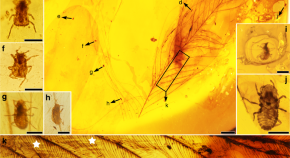
New insects feeding on dinosaur feathers in mid-Cretaceous amber
Numerous feathered dinosaurs and early birds have been discovered from the Jurassic and Cretaceous, but the early evolution of feather-feeding insects is not clear. Here, Gao et al. describe a new family of ectoparasitic insects from 10 specimens found associated with feathers in mid-Cretaceous amber.
- Taiping Gao
- Xiangchu Yin
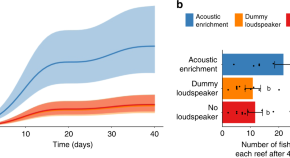
Acoustic enrichment can enhance fish community development on degraded coral reef habitat
Healthy coral reefs have an acoustic signature known to be attractive to coral and fish larvae during settlement. Here the authors use playback experiments in the field to show that healthy reef sounds can increase recruitment of juvenile fishes to degraded coral reef habitat, suggesting that acoustic playback could be used as a reef management strategy.
- Timothy A. C. Gordon
- Andrew N. Radford
- Stephen D. Simpson
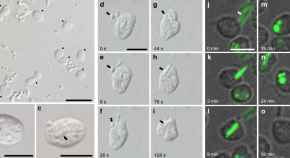
Phagocytosis-like cell engulfment by a planctomycete bacterium
Phagocytosis is a typically eukaryotic feature that could be behind the origin of eukaryotic cells. Here, the authors describe a bacterium that can engulf other bacteria and small eukaryotic cells through a phagocytosis-like mechanism.
- Takashi Shiratori
- Shigekatsu Suzuki
- Ken-ichiro Ishida

Hippocampal clock regulates memory retrieval via Dopamine and PKA-induced GluA1 phosphorylation
The neural mechanisms that lead to a relative deficit in memory retrieval in the afternoon are unclear. Here, the authors show that the circadian - dependent transcription factor BMAL1 regulates retrieval through dopamine and glutamate receptor phosphorylation.
- Shunsuke Hasegawa
- Hotaka Fukushima
- Satoshi Kida

Agreement between two large pan-cancer CRISPR-Cas9 gene dependency data sets
Integrating independent large-scale pharmacogenomic screens can enable unprecedented characterization of genetic vulnerabilities in cancers. Here, the authors show that the two largest independent CRISPR-Cas9 gene-dependency screens are concordant, paving the way for joint analysis of the data sets.
- Joshua M. Dempster
- Clare Pacini
- Francesco Iorio

Phylogenomics of 10,575 genomes reveals evolutionary proximity between domains Bacteria and Archaea
The authors build a reference phylogeny of 10,575 evenly-sampled bacterial and archaeal genomes, based on 381 markers. The results indicate a remarkably closer evolutionary proximity between Archaea and Bacteria than previous estimates that used fewer “core” genes, such as the ribosomal proteins.
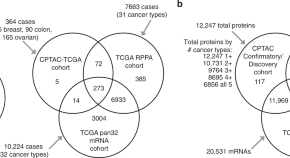
Pan-cancer molecular subtypes revealed by mass-spectrometry-based proteomic characterization of more than 500 human cancers
Mass-spectrometry-based profiling can be used to stratify tumours into molecular subtypes. Here, by classifying over 500 tumours, the authors show that this approach reveals proteomic subgroups which cut across tumour types.
- Fengju Chen
- Darshan S. Chandrashekar
- Chad J. Creighton

CRISPR-Switch regulates sgRNA activity by Cre recombination for sequential editing of two loci
Inducible genome editing systems often suffer from leakiness or reduced activity. Here the authors develop CRISPR-Switch, a Cre recombinase ON/OFF-controlled sgRNA cassette that allows consecutive editing of two loci.
- Krzysztof Chylinski
- Maria Hubmann
- Ulrich Elling
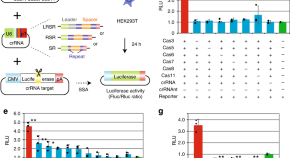
CRISPR-Cas3 induces broad and unidirectional genome editing in human cells
Class 1 CRISPR systems are not as developed for genome editing as Class 2 systems are. Here the authors show that Cas3 can be used to generate functional knockouts and knock-ins, as well as Cas3-mediated exon-skipping in DMD cells.
- Hiroyuki Morisaka
- Kazuto Yoshimi
- Tomoji Mashimo

Genetic evidence for assortative mating on alcohol consumption in the UK Biobank
From observational studies, alcohol consumption behaviours are known to be correlated in spouses. Here, Howe et al. use partners’ genotypic information in a Mendelian randomization framework and show that a SNP in the ADH1B gene associates with partner’s alcohol consumption, suggesting that alcohol consumption affects mate choice.
- Laurence J. Howe
- Daniel J. Lawson
- Gibran Hemani

The autophagy receptor p62/SQST-1 promotes proteostasis and longevity in C. elegans by inducing autophagy
While the cellular recycling process autophagy has been linked to aging, the impact of selective autophagy on lifespan remains unclear. Here Kumsta et al. show that the autophagy receptor p62/SQSTM1 is required for hormetic benefits and p62/SQSTM1 overexpression is sufficient to extend C. elegans lifespan and improve proteostasis.
- Caroline Kumsta
- Jessica T. Chang
- Malene Hansen
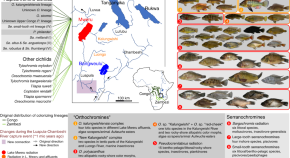
The coincidence of ecological opportunity with hybridization explains rapid adaptive radiation in Lake Mweru cichlid fishes
Recent studies have suggested that hybridization can facilitate adaptive radiations. Here, the authors show that opportunity for hybridization differentiates Lake Mweru, where cichlids radiated, and Lake Bangweulu, where cichlids did not radiate despite ecological opportunity in both lakes.
- Joana I. Meier
- Rike B. Stelkens
- Ole Seehausen

Flagellin-elicited adaptive immunity suppresses flagellated microbiota and vaccinates against chronic inflammatory diseases
Gut microbiota alterations, including enrichment of flagellated bacteria, are associated with metabolic syndrome and chronic inflammatory diseases. Here, Tran et al. show, in mice, that elicitation of mucosal anti-flagellin antibodies protects against experimental colitis and ameliorates diet-induced obesity.
- Hao Q. Tran
- Ruth E. Ley
- Benoit Chassaing

Possible role of L-form switching in recurrent urinary tract infection
The reservoir for recurrent urinary tract infection in humans is unclear. Here, Mickiewicz et al. detect cell-wall deficient (L-form) E. coli in fresh urine from patients, and show that the isolated bacteria readily switch between walled and L-form states.
- Katarzyna M. Mickiewicz
- Yoshikazu Kawai
- Jeff Errington

Dual microglia effects on blood brain barrier permeability induced by systemic inflammation
Although it is known that microglia respond to injury and systemic disease in the brain, it is unclear if they modulate blood–brain barrier (BBB) integrity, which is critical for regulating neuroinflammatory responses. Here authors demonstrate that microglia respond to inflammation by migrating towards and accumulating around cerebral vessels, where they initially maintain BBB integrity via expression of the tight-junction protein Claudin-5 before switching, during sustained inflammation, to phagocytically remove astrocytic end-feet resulting in impaired BBB function
- Koichiro Haruwaka
- Ako Ikegami
- Hiroaki Wake

Mice with hyper-long telomeres show less metabolic aging and longer lifespans
Telomere shortening is associated with aging. Here the authors analyze mice with hyperlong telomeres and demonstrate that longer telomeres than normal have beneficial effects such as delayed metabolic aging, increased longevity and less incidence of cancer.
- Miguel A. Muñoz-Lorente
- Alba C. Cano-Martin
- Maria A. Blasco

Extracellular matrix hydrogel derived from decellularized tissues enables endodermal organoid culture
Organoid cultures have been developed from multiple tissues, opening new possibilities for regenerative medicine. Here the authors demonstrate the derivation of GMP-compliant hydrogels from decellularized porcine small intestine which support formation and growth of human gastric, liver, pancreatic and small intestinal organoids.
- Giovanni Giuseppe Giobbe
- Claire Crowley
- Paolo De Coppi
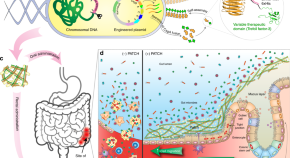
Engineered E. coli Nissle 1917 for the delivery of matrix-tethered therapeutic domains to the gut
Anti-inflammatory treatments for gastrointestinal diseases can often have detrimental side effects. Here the authors engineer E. coli Nissle 1917 to create a fibrous matrix that has a protective effect in DSS-induced colitis mice.
- Pichet Praveschotinunt
- Anna M. Duraj-Thatte
- Neel S. Joshi

Ambient black carbon particles reach the fetal side of human placenta
Exposure to air pollution during pregnancy has been associated with impaired birth outcomes. Here, Bové et al. report evidence of black carbon particle deposition on the fetal side of human placentae, including at early stages of pregnancy, suggesting air pollution could affect birth outcome through direct effects on the fetus.
- Hannelore Bové
- Eva Bongaerts
- Tim S. Nawrot

Real-time decoding of question-and-answer speech dialogue using human cortical activity
Speech neuroprosthetic devices should be capable of restoring a patient’s ability to participate in interactive dialogue. Here, the authors demonstrate that the context of a verbal exchange can be used to enhance neural decoder performance in real time.
- David A. Moses
- Matthew K. Leonard
- Edward F. Chang
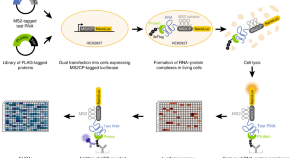
In-cell identification and measurement of RNA-protein interactions
RNA-interacting proteome can be identified by RNA affinity purification followed by mass spectrometry. Here the authors developed a different RNA-centric technology that combines high-throughput immunoprecipitation of RNA binding proteins and luciferase-based detection of their interaction with the RNA.
- Antoine Graindorge
- Inês Pinheiro
- Alena Shkumatava

A bacterial gene-drive system efficiently edits and inactivates a high copy number antibiotic resistance locus
Genedrives bias the inheritance of alleles in diploid organisms. Here, the authors develop a gene-drive analogous system for bacteria, selectively editing and clearing plasmids.
- J. Andrés Valderrama
- Surashree S. Kulkarni

Flavonoid intake is associated with lower mortality in the Danish Diet Cancer and Health Cohort
The studies showing health benefits of flavonoids and their impact on cancer mortality are incomplete. Here, the authors perform a prospective cohort study in Danish participants and demonstrate an inverse association between regular flavonoid intake and both cardiovascular and cancer related mortality.
- Nicola P. Bondonno
- Frederik Dalgaard
- Jonathan M. Hodgson
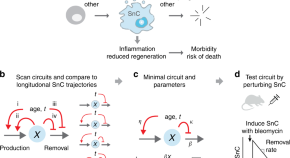
Senescent cell turnover slows with age providing an explanation for the Gompertz law
One of the underlying causes of aging is the accumulation of senescent cells, but their turnover rates and dynamics during ageing are unknown. Here the authors measure and model senescent cell production and removal and explore implications for mortality.
- Amit Agrawal

Optimizing agent behavior over long time scales by transporting value
People are able to mentally time travel to distant memories and reflect on the consequences of those past events. Here, the authors show how a mechanism that connects learning from delayed rewards with memory retrieval can enable AI agents to discover links between past events to help decide better courses of action in the future.
- Chia-Chun Hung
- Timothy Lillicrap
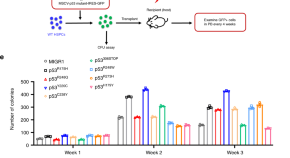
Mutant p53 drives clonal hematopoiesis through modulating epigenetic pathway
Ageing is associated with clonal hematopoiesis of indeterminate potential (CHIP), which is linked to increased risks of hematological malignancies. Here the authors uncover an epigenetic mechanism through which mutant p53 drives clonal hematopoiesis through interaction with EZH2.

A systematic evaluation of single cell RNA-seq analysis pipelines
There has been a rapid rise in single cell RNA-seq methods and associated pipelines. Here the authors use simulated data to systematically evaluate the performance of 3000 possible pipelines to derive recommendations for data processing and analysis of different types of scRNA-seq experiments.
- Beate Vieth
- Swati Parekh
- Ines Hellmann

Cryo-EM structure and polymorphism of Aβ amyloid fibrils purified from Alzheimer’s brain tissue
Alzheimer’s disease is characterised by the deposition of Aβ amyloid fibrils and tau protein neurofibrillary tangles. Here the authors use cryo-EM to structurally characterise brain derived Aβ amyloid fibrils and find that they are polymorphic and right-hand twisted, which differs from in vitro generated Aβ fibrils.
- Marius Kollmer
- William Close
- Marcus Fändrich
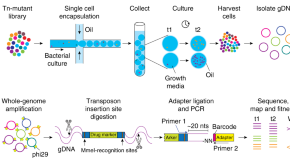
Droplet Tn-Seq combines microfluidics with Tn-Seq for identifying complex single-cell phenotypes
Culturing transposon-mutant libraries in pools can mask complex phenotypes. Here the authors present microfluidics mediated droplet Tn-Seq, which encapsulates individual mutants, promotes isolated growth and enables cell-cell interaction analyses.
- Derek Thibault
- Paul A. Jensen
- Tim van Opijnen
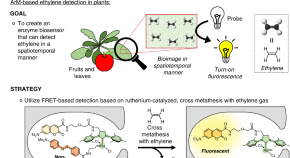
An artificial metalloenzyme biosensor can detect ethylene gas in fruits and Arabidopsis leaves
Existing methods to detect ethylene in plant tissue typically require gas chromatography or use ethylene-dependent gene expression as a proxy. Here Vong et al . show that an artificial metalloenzyme-based ethylene probe can be used to detect ethylene in plants with improved spatiotemporal resolution.
- Kenward Vong
- Katsunori Tanaka
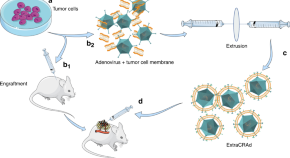
Artificially cloaked viral nanovaccine for cancer immunotherapy
Cancer therapy using oncolytic virus has shown pre-clinical and clinical efficacy. Here, the authors report ExtraCRAd, an oncolytic virus cloaked with tumour cell membrane and report its therapeutic effects in vitro and in vivo in multiple mouse tumour models.
- Manlio Fusciello
- Flavia Fontana
- Vincenzo Cerullo
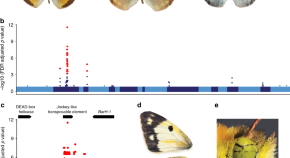
A transposable element insertion is associated with an alternative life history strategy
Tradeoffs are central to life history theory and evolutionary biology, yet almost nothing is known about their mechanistic basis. Here the authors characterize one such mechanism and find a transposable element insertion is associated with the switch between alternative life history strategies.
- Alyssa Woronik
- Kalle Tunström
- Christopher W. Wheat

Patterns of genetic differentiation and the footprints of historical migrations in the Iberian Peninsula
The Iberian Peninsula has a complex history. Here, the authors analyse the genetic structure of the modern Iberian population at fine scale, revealing historical population movements associated with the time of Muslim rule.
- Clare Bycroft
- Ceres Fernandez-Rozadilla
- Simon Myers

Single-cell transcriptomics of human T cells reveals tissue and activation signatures in health and disease
Immune cells are shaped by the tissue environment, yet the states of healthy human T cells are mainly studied in the blood. Here, the authors perform single cell RNA-seq of T cells from tissues and blood of healthy donors and show its utility as a reference map for comparison of human T cell states in disease.
- Peter A. Szabo
- Hanna Mendes Levitin
- Peter A. Sims

Genomic risk score offers predictive performance comparable to clinical risk factors for ischaemic stroke
Stroke risk is influenced by genetic and lifestyle factors and previously a genomic risk score (GRS) for stroke was proposed, albeit with limited predictive power. Here, Abraham et al. develop a metaGRS that is composed of several stroke-related GRSs and demonstrate improved predictive power compared with individual GRS or classic risk factors.
- Gad Abraham
- Rainer Malik
- Martin Dichgans

Mitochondrial oxidative capacity and NAD + biosynthesis are reduced in human sarcopenia across ethnicities
Sarcopenia is the loss of muscle mass and strength associated with physical disability during ageing. Here, the authors analyse muscle biopsies from 119 patients with sarcopenia and age-matched controls of different ethnic groups and find transcriptional signatures indicating mitochondrial dysfunction, associated with reduced mitochondria numbers and lower NAD + levels in older individuals with sarcopenia.
- Eugenia Migliavacca
- Stacey K. H. Tay
- Jerome N. Feige

NAD + augmentation restores mitophagy and limits accelerated aging in Werner syndrome
The molecular mechanisms of mitochondrial dysfunction in the premature ageing Werner syndrome were elusive. Here the authors show that NAD + depletion-induced impaired mitophagy contributes to this phenomenon, shedding light on potential therapeutics.
- Evandro F. Fang
- Vilhelm A. Bohr

Novel approach reveals genomic landscapes of single-strand DNA breaks with nucleotide resolution in human cells
Single strand breaks represent the most common form of DNA damage yet no methods to map them in a genome-wide fashion at single nucleotide resolution exist. Here the authors develop such a method and apply to uncover patterns of single-strand DNA “breakome” in different biological conditions.
- Lorena Salazar-García
- Philipp Kapranov

Evaluation of 16S rRNA gene sequencing for species and strain-level microbiome analysis
Here, the authors explore the potential of the 16S gene for discriminating bacterial taxa and show that full-length sequencing combined with appropriate clustering of intragenomic sequence variation can provide accurate representation of bacterial species in microbiome datasets.
- Jethro S. Johnson
- Daniel J. Spakowicz
- George M. Weinstock
Quick links
- Explore articles by subject
- Guide to authors
- Editorial policies
240 Interesting Biology Topics for Essays & Research Papers
Biology is often called the science of life . From bacteria to whales, biologists study all kinds of organisms. Have you ever wondered why bees dance? Or how can chickens be the closest modern relatives to dinosaurs? The buzzing world is full of complex wonders like these. That’s why it’s so easy to find a biology research topic of your liking.
Our specialists will write a custom essay specially for you!
If you need to craft a biology essay, this article is for you. Here you can learn about research areas and fields in biology. Besides, you will find 220 interesting biology topics to write about. Read on to refresh your knowledge of microbiology, epidemiology, and more.
Tight deadlines are demanding for all students. Luckily, our custom writing service is there for you! With our help, your biology project will be done in no time.
🔝 Top 10 Biology Research Topics
📚 areas of research in biology, ⭐ top 10 interesting biology topics for essays, 🍎 biological topics for high school.
- 🦠 Microbiology Topics
- 💀 Anatomy & Human Biology
- 🔬 Cell & Molecular Biology
- ♻️ Environmental Biology
- 🐬 Marine Biology
- 🌻 Plant Biology
- 🧬 Evolutionary Biology
- 👶🧑 Developmental Biology
- 😷 Epidemiology & Population Topics in Biology
- 📜 History of Biology
🔍 References
- Are viruses alive?
- How do emotions work?
- What is the role of hormones?
- Ways to recover endangered species
- Are allergies a sign of immune disorder?
- What is the function of chromosomes?
- Robert Hooke’s contribution to biology
- The difference between Darwinism and evolution
- The process of bacterial invasion of the body
- Ways to strengthen the human immune system
Biologists operate on a vast scale. Naturally, there are plenty of research areas. Let’s sort them out:
- Microbiology. Microbiologists examine minute organisms. Many of them, such as viruses, can cause infectious diseases. Because of this, microbiology is strongly linked with immunology.
- Anatomy. Anatomical research focuses on the structure of tissues and organs.
- Cell and molecular biology. Cells are the basis for every living being. The key topic in this area is the molecular organization of cells.
- Environmental biology. Our environment needs support, and environmental biologists provide it. They study ecosystems to find out how humans affect nature. Scientists in this area also observe how organisms react to their surroundings.
- Marine biology. This branch is concerned with life in the deep seas. Oceanography is a crucial part of marine biology.

- Botany. This study is also called plant biology. It studies the properties of organisms that need sun and water to survive. Common categories of plants include trees, shrubs, and flowers.
- Evolutionary biology. All that lives is always evolving. Organisms create, merge, and delete genes. Evolutionary biologists monitor these changes.
- Developmental biology. Research in this area includes studying tissue regeneration and cell growth.
- Epidemiology. Epidemiologists investigate diseases and health conditions. Key questions include: Where does a disease originate from? How does it transmit? What risks are there?
With this overview in mind, you’re ready to choose an interesting biological topic.
- 4 types of biotechnology
- Main branches of biochemistry
- Pros and cons of gene therapy
- Exobiology vs. astrobiology
- Biological functions of the DNA
- Levels of biological organization
- Properties of the phylogenetic tree
- Classification of invertebrate animals
- History of modern light microscopes
- The early modern period of plant systematics
From peas to platypuses: high school biology covers a wide range of topics. In your biology essay, you’ll have the chance to familiarize yourself with any of them. Your options are almost endless! Consult our list of 20 popular ideas to get your research started:
Just in 1 hour! We will write you a plagiarism-free paper in hardly more than 1 hour
- Compare the types of cell reproduction.
- How did Gregor Mendel discover heredity?
- Cell structure: prokaryotes vs. eukaryotes .
- Enzymes : what do we need them for?
- Explain how photosynthesis converts CO2 into O2.
- How does the human metabolism work?
- What are the differences between mitosis and meiosis?
- How do you predict the probability of inheriting a gene?
- Describe the structure of DNA.
- What is PCR used for?
- Biotechnology: the mechanisms behind cloning .
- Survival of the fittest: what does natural selection mean?
- Discuss the latest evidence for Darwin’s theory of evolution.
- The tree of life: how does this concept depict the relationships between species?
- What kind of strategies do organisms use to get nutrition?
- Dinosaurs and their modern relatives: what do we know about them?
- How does our nervous system transport information?
- Explain the mechanisms behind the carbon cycle.
- Examine the human impact on biodiversity .
- What factors regulate population dynamics ?
🦠 Microbiology Research Topics for Students
The world of microbiology consists of tiny organisms. Researchers study microbes and other simple life forms such as bacteria and fungi. This way, they aim to solve environmental as well as medical issues.
- How do microbes develop resistance?
- Give an overview of our immune system’s defense mechanisms.
- Contrast the types of microbiomes .
- What are the industrial applications for microbiology ?
- How do you degrade soil pollutants using microbes?
- Investigate examples of agents that kill bacteria.
- What makes yeast versatile?
- The differences between virions and viroids.
- What are acellular agents?
- Give an overview of the biochemical properties of fungi .
- What are possible causes for asthma ?
- The relationship between stress and our immune system’s performance.
- How do vaccines work?
- Examine the structure of archaeal genes.
- Why is microbial diversity important?

- How do microbes contribute to an ecosystem?
- The role of microbes in food contamination.
- How do bacteria turn milk into yogurt?
- Applications of microbial biotechnology.
- Describe the four groups of protozoa.
💀 Anatomy & Human Biology Topics
Human biology studies people as single organisms and in the context of populations. Two of its essential parts are anatomy and anthropology. The latter studies the evolution of humankind. The former is more concerned with body structure. Combine all three subjects to gain a 360° view of humanity!
- Describe the functions of the respiratory system.
- What happens to your body if you’re anemic ?
- Outline the history of the human population.
- How does medical anthropology help us understand health?
- Reading bones: what types of information can osteologists gather?
- Biomechanics: what makes humans move?
- Compare the proposed effects of various current trends in nutrition .
- Explore the psychological factors that influence one’s health.
- How does your brain control your behavior?
- Synapses: structure and mechanisms.
- Explain how kidneys filter blood.
- What regulates muscle contraction ?
- Discuss the new reproductive technologies from an anthropological perspective.
- Describe the structure of a skeletal muscle fiber.
- The cerebral cortex: what does it do?
- Brain, hormones, and emotions.
- Functions of the sodium-potassium pump.
- Examine what blood consists of.
- What happens when your heart skips a beat?
- Is the growth in the human population out of control?
🔬 Cell & Molecular Biology Research Topics
Your body’s fundamental structure is made up of cells. Their properties are in the center of interest for cell biologists. They investigate a cell’s life cycle and its vital functions. On a molecular level, this includes the role of chemical processes in cell activity.
- How does cancer affect the body’s cell growth?
- The protein paradox: what is the right amount of protein?
- How do cells heal bones?
- The ethics of stem cell research .
- Investigate the communication methods between cells.
- Explore the link between the environment and our DNA.
- Current trends in molecular biochemistry.
- Telomerase: will it ever be possible to reverse aging processes?
- What do we know about axon guidance?
- Where does our brain keep the memories?
- Why do cells become sticky?
- High-resolution microscopy: ways to advance molecular research.
- How do cilia move cells?

- Treating glaucoma : is surgery always necessary?
- The role of microtubules in the nervous system.
- Diffusion : means of transport within cells.
- What does the central dogma of molecular biology state?
- Trace the steps of DNA translation.
- Why do cells need to eat their dead counterparts?
- How does protein biosynthesis work?
♻️ Environmental Biology Topics to Research
Environmental biologists ensure our harmonic coexistence with nature. They are also in charge of monitoring wastewater disposal and pollution levels. This branch is closely related to ecology.
- Discuss the importance of light in different bodies of water.
- Aftermath of building the Hetch Hetchy valley dam.
- The devastating impact of deforestation in the Amazon.
- Analyze the consequences of desertification.
- How do genetically modified insects influence the environment?
- What would happen if all the bees die?
- Compare several methods of wastewater disposal.
- What were the ecological effects of Indonesia’s Mega Rice Project?
- The Great Pacific Garbage Patch: will we ever get rid of it?
- How do worms indicate the state of an ecosystem?
- Why is it important to conserve biodiversity?
- DDT: how did it affect wildlife in the US?
- What causes toxic algae bloom?
- Compare the adverse health effects of common contaminants in the air.
- The Aral Sea: how did it disappear?
- How do genetically engineered crops impact the environment?
- Indoor air pollution: causes and risks.
- The pros and cons of using natural gas .
- Trace the ecological footprint of cotton production.
- What are the ways to ensure food security without harming the environment?
🐬 Marine Biology Topics for a Paper
Fun fact: the vast majority of our oceans are still unobserved. Research in marine biology encompasses all organisms living close to or under water. Do you want to participate in uncovering the mysteries of the deep sea? This section is for you!
Receive a plagiarism-free paper tailored to your instructions. Cut 20% off your first order!
- How does luminescence in marine vertebrae work?
- Dolphins: how do they communicate?
- The impact of military sonar on whales.
- What makes the Galapagos Islands so unique?
- Compare different camouflage techniques of marine animals.
- How do aquatic organisms live together in coral reefs ?
- Causes of high mercury concentrations in fish.
- Investigate the impact of overfishing in China.
- Explain how rising sea temperatures affect marine life.
- Contrast the survival strategies of various penguin species.
- The ethics of seafood farms.
- Examine bacteria’s contribution to biological processes in the sea.
- What are the types of invasive species?
- The contribution of birds to a stable marine ecosystem.
- Identify the biggest threats to marine biodiversity.
- Inspect the predatory behavior of starfish.
- How do corals form?
- The importance of phyto- and zooplankton to ponds.
- Whales: how did they evolve?
- What are the four types of oceanography ?
🌻 Plant Biology Research Topics
Plant biology, you guessed it, investigates plants. These green organisms are incredibly versatile. From redwood trees to algae, plants come in all sizes and shapes. Scientists use botanical knowledge to improve our food and medicine supplies. They also help to conserve forests, parks, and wilderness areas.
- What causes diseases in plants?
- What are the benefits of studying algae ?
- Recently, scientists engineered a plant to glow by itself. How does it work?
- What makes some plants toxic?

- Compare various defense mechanisms of flowers.
- Deciduous trees: what are the advantages of leaf loss?
- How do Butterworts acquire nutrition?
- Carnivorous plants: methods of luring prey.
- Types of negative feedback in plants.
- Give examples of thigmotropism. How does it work?
- What problems are associated with the definition of kingdoms?
- Investigate the anatomical structure of plant roots.
- Phytohormones: how do they influence plant growth?
- Plants and music: does sound have any measurable effects on plant development?
- How do plants produce starch?
- Why do weeds grow excessively?
- Investigate plant disease management and intervention.
- Industrial applications of synthesized plant mechanisms.
- Cacti: how do they survive in the desert?
- Examine the biological properties of medicinal herbs.
🧬 Hot Topics in Evolutionary Biology to Write About
Evolutionary biologists observe change in all living organisms. If you want to know why life on Earth is so versatile, evolutionary biology has the answer. Research areas cover ecology and genetics, as well as paleontology.
- How does stabilizing selection ensure the same phenotype for a species during evolution?
- Discuss Tinbergen’s four questions.
- What are the benefits of sexual reproduction ?
- Cancer: why does it persist?
- Society and evolution: are they connected?
- Southeast Asia and the limited occurrence of the alcohol dehydrogenase gene.
- Is there a scientific reason to divide humans into races?
- Track the evolution of aging throughout human history.
- How does speciation work?
- Genetic drift and its effects on variation.
- Describe problems concerning the Modern Synthesis.
- Selective sweeps: how likely are they to cause disease?
- What does the Red Queen hypothesis state?
- How do you determine age in herbaceous plants?
- Life history theory: how does a species’ life history influence its evolution?
- What are the ways for a species to achieve its maximum fitness?
- How did the bees learn to communicate information by dancing?
- Investigate the evolution of stamina in animal locomotion.
- How does an animal’s physiology adapt to its geographic range?
- Compare the evolutionary process of endotherms and ectotherms.
👶🧑 Developmental Biology Research Topics
When animals and plants grow, their features change. It’s no surprise: every living being starts as a single cell. It’s a long way from there to a fully formed organism! Developmental biologists track this process at different levels.
- Why are men more likely to be colorblind than women?
- What is phylogenetic niche conservatism?
- Identify origins of congenital disorders.
- What causes birds to become territorial?
- Explain the two types of developmental mechanisms.
- Why does getting older make humans more susceptible to cancer?
- Homeotic genes: how do they influence the development of body structures?
- Describe the advantages of apoptosis .
- What causes polycephaly?
- How do stem cells differentiate?
- Investigate regeneration in hydra.
- Mechanisms of metamorphosis in frogs.
- What happened during the Cambrian explosion?
- How do plants produce new structures?
- Examine the process of neurulation in fish.
- What are the types of deformations found in plants?
- Describe the ABC model of flower development.
- Why are zebrafish good model systems for developmental studies?
- Search for the origins of the vertebrate body plan.
- What does the concept of morphogen gradient say about the fate of cells?
😷 Epidemiology & Population Topics in Biology
Investigating health-related events is a part of epidemiologic research. The goal is to find out what causes diseases in a specific population. Epidemiology analyzes other health issues such as natural disasters and injuries. Population biology focuses on the interaction between populations and their environment.
- How does evolutionary game theory describe the development of a population?
- When is a strategy evolutionarily stable?
- How does phenotypic variety in plants help manage disease?
- What diseases are caused by heavy metal pollution?

- How did the Coronavirus pandemic contribute to a rise in cases of domestic violence ?
- Reasons for an increased rate of congenital disabilities in a specific area.
- Asian carp: a harmful disruption of the marine population in American rivers.
- Compare the three kinds of population distribution.
- Examine the consequences of the 1783 Laki eruption.
- Examine various policies to moderate population growth .
- How do predator-prey dynamics work?
- Avoidance mechanisms of resource competition.
- Describe the three types of symbiotic relationships .
- How does a species regulate its abundance?
- What happens if the equilibrium state of a community is disturbed?
- Factors that encourage human population growth.
- Contrast the survivorship curves of humans, birds, and trees.
- Obesity : causes and solutions.
- Depression : how does it affect society?
- The role of causal inference in epidemiological studies .
📜 History of Biology Topics to Write About
Even before the emergence of scientific studies, humans had basic biological understanding. They were able to spot edible plants and domesticate animals. Assyrians and Babylonians were the first to implement biological knowledge. If you’re looking for a theoretical research project, this is the right research area for you.
Get an originally-written paper according to your instructions!
- Explore the medical knowledge available in ancient China.
- The history of agriculture in India.
- How did the Greek philosophers theorize about the origin of life?
- Investigate the theory of the four humors.
- Aristotle’s classification of animals.
- Give an overview of discoveries in Galen’s medical writings.
- What caused the stagnation in scientific progress during the Middle Ages?
- Al-Jahiz’ discovery of the relationships between organisms .
- Albertus Magnus: what was his contribution to botany?
- How did Italy become the center for biological studies?
- What factors impacted the development of biology during the Renaissance?
- Trace the origins of modern anatomy.
- What led to the establishment of the cell theory?
- Jump starting biological progress: the invention of the microscope.
- Louis Pasteur and the dismissal of spontaneous generation.
- How did the discovery of heredity influence modern biology?
- What led to the discovery of blood circulation?
- How did the Royal Society of London impact scientific development in Europe?
- What technology helped advance biological research in the 20th century?
- The rise of bioinformatics: boosting progress in genetic data analysis.
We hope our article gave you some useful ideas for your biology paper. Good luck with your assignment!
You might also be interested in:
- A List of 212 Brilliant Research Proposal Topics to Investigate
- 220 Best Science and Technology Essay Topics to Write About
- 501 Research Questions & Titles about Science
- 300 Interesting Chemistry Topics & Writing Tips
- 150 Best Environmental Essay Topics & Questions
- 165 Health-Related Topics & Essay Ideas
- 281 Best Health & Medical Research Topics
- What is Biology?: NTNU
- High School Biology: Khan Academy
- Microbiology: University of Pittsburgh
- Human Biology: University at Albany
- Explore Topics Related to Cells: NIH
- What Is Marine Biology?: MarineBio Conservation Society
- Developmental Biology: Stanford Encyclopedia of Philosophy
- Introduction to Epidemiology: Centers for Disease Control & Prevention
- The History of Biology: Encyclopedia Britannica
- Share to Facebook
- Share to Twitter
- Share to LinkedIn
- Share to email

Culture is a set of knowledge, behaviors, and beliefs shared by a group of people. You would probably agree that it’s an integral part of humanity. It’s no wonder that students are often assigned to write about it. That’s why we came up with a list of interesting and creative...

The Earth is a complex system. To understand it, geologists examine the lithosphere and its layers. They trace our planet’s history by using physical and chemical methods. At the same time, geographers observe environmental patterns. They also focus on the interaction between humans and nature. Keep reading to find out...

Mathematics is the science of numbers and shapes. Writing about it can give you a fresh perspective and help to clarify difficult concepts. You can even use mathematical writing as a tool in problem-solving. In this article, you will find plenty of interesting math topics. Besides, you will learn about...

Cause and effect essays examine how an event happened and what consequences it had. Gaining weight after eating lots of fast food is an example of a cause-and-effect relationship. Possible topics cover a variety of subjects ranging from mental health to history and politics. This article gives you an outline...

An analysis essay aims to break down the subject in order to understand it. You can choose to analyze a text, a process, or an idea. This article will help you write a great essay! Selecting an interesting topic makes writing a lot easier. We’ve prepared a list of excellent...

Our code of ethics is derived from what we think is right or wrong. On top of that, we have to agree to the moral standards established by the society we live in. Conventional norms generally label theft, murder, or harassment as bad. However, there are many influences that impact...

A definition explains the meaning of a term or a concept. In a dictionary, you’ll find a definition in a single sentence. A definition paper, however, encompasses several paragraphs. Such an essay, amongst other things, can include personal experience and examples. To write a successful definition paper, you need to...

As simple as it is, the purpose of the descriptive essay is to explain or portray its subject. It can focus on any topic or issue you want to write about. Be sure that any middle school, high school, or college student can manage this type of creative writing assignment!...

Rhetorical analysis essay focuses on assessing the method used for delivering a message. This assignment isn’t about giving an opinion on the topic. The purpose is to analyze how the author presents the argument and whether or not they succeeded. Keep reading to find out more strategies and prompts for...

A narrative essay tells a story about a series of events. At the core of this kind of essay can be a personal experience or a fictional plot. Any story can be a basis for a narrative essay! Narratives can look similar to descriptions. Still, they are different. A descriptive...

Similar to the instructions in a recipe book, process essays convey information in a step-by-step format. In this type of paper, you follow a structured chronological process. You can also call it a how-to essay. A closely related type is a process analysis essay. Here you have to carefully consider...

In a classification essay, you divide the subject into categories. To create these categories, you single out certain attributes of things. You can classify them according to their characteristics, themes, or traits. Sounds complicated? Be sure that any high school or college student can manage this type of essay!
- Skip to primary navigation
- Skip to main content
- Skip to footer
Biology Wise
50 Really Good Topics for Research in the Field of Biology
Biological research has advanced in leaps and bounds, in the past few decades. With the completion of the Human Genome project in April 2003, new tools and techniques have been developed, and are being utilized to study various aspects of biology.
Like it? Share it!

Never-ending recitation
If one were to continuously read aloud the letter of each base of the 3 billion bases that make up the human genome, without taking any breaks at all, the recitation would last for a period of 57 years!
The advancement in research has granted humans an understanding of how living organisms function and the purpose of their function: how they interact with the environment, the type of inter-species interactions that they have, and the impact such interactions have on the rest of the planet. These explanations have given rise to further questions based on the origin and evolution of all biological species, which eventually leads to queries regarding the exact processes occurring within an organism that determine all aspects of its existence, including the impact it has on its environment.
At present, the rising progress in science, medicine, and technology has made positive as well as negative impacts on the planet, as a whole. Current scientific research hopes to resolve these negative impacts with biological solutions, while at the same time demystifying and resolving queries related to the biota.

Aging or senescence is the collective process through which an organism undergoes multiple physiological changes over the course of its lifetime. It includes the development of an organism’s cognitive functions till it reaches maturity, and then a steady decline of those same functions till the organism’s eventual death. Such a decline affects other body processes, leading to their impaired functioning.
In humans, aging brings with it, body frailty, organ weakness, and mental decline. Research has shown that humans are born with a biological clock that regulates this process of aging. This clock functions by the combination of a steady loss of hexamer telomeric repeat sequences of chromosomes during replicative processes and the accumulation of DNA damage and cellular wastes in an organism during the course of its life.
Scientists have researched model organisms such as C. Elegans, and observed reduced senescence in the event of selective mutations in specific genes. However the same result is yet to be reproduced in higher and more complex organisms, hence the elucidation of the exact process remains a mystery. As more studies are carried out, more theories are put forth to help explain the occurrence of this process, along with ways to prevent and reverse it.
Relevant Research Topics
- Selective telomerase activation to delay senescence
- Inhibition of mTOR gene and gene products for longevity of life
- Effects of diet (caloric restriction) on lifespan
- Effect of altered energy generation capacity (epigenetic changes) on the process of aging
- Effect of reduced mRNA translation on senescence
Agriculture

The ever-growing human population along with the recent population explosion has caused a dramatic increase in the demand for food crops. This coupled with the occurrence of natural disasters like earthquakes, floods, etc., and pest problems, result in huge losses of food grains. Such a shortage increases the world’s hunger problem, where most of the inhabiting people of developing nations are unable to feed themselves everyday.
To solve such a mammoth crisis, and to avert death of people on account of starvation, the yield of food has to be increased manifold. One way to do this, can be by upgrading the agricultural practices of farmers; by giving them advanced know-how, better tools and implements, and to have precautions in place to protect the farmed yield from instances of natural disasters and pest populations.
Another way to overcome this problem, is to research and produce newer varieties of these food crops that are resistant and even repellent towards pest populations, while at the same time produce a very high yield with minimum care. Varieties of crops which produce food in more than one season, can also be produced.
- Development of GMO food crops
- Development of high-yield varieties of wheat and corn
- Imparting viral, fungal, and bacterial resistance to crop plants,
- Study of salt and water stress on plants
- Inducing production of pest-repellent natural biochemicals (e.g. nimbidin from neem tree) in normal food crops
Antibiotic Resistance

With the advent of vaccines, anti-microbial, and anti-viral agents, numerous diseases have been eradicated, averted and contained. Infections that would have proven fatal a few decades ago are now taken care of by a mere injection, tablet, or a capsule, helping in increasing the overall health of the human population.
But with the excessive use of antimicrobial solutions, nature serves us a reminder of continuous evolution in the form of antibiotic resistant strains of micro-organisms. As the strength and efficiency of these antibiotics evolves due to medical research, the infectious organisms too evolve and adapt to overcome these substances. An infection caused by such an organism is not only untreatable, but also proves to be fatal.
To curb this evolution of “super-bugs”, newer mechanisms and pathways have to be researched to prevent infections by these organisms. Also, targeted drugs have to be developed that halt the organism’s internal processes, thereby rendering it unable to infect.
- Mechanism of pathogenesis of antibiotic resistant agent
- Drug designing of molecules that hamper pathogenicity
- Development of a biomolecule that induces programmed cell death by caspase activation in resistant organism
- Development of new target models to produce more effective antibiotics
- Studying effects of probiotics in infection prevention
Bioremediation
Technology has brought the world closer and improved the quality of life considerably. Actions that took extended periods of time, can now be carried out easily and within a short time. There is year round availability of goods in all parts of the world.
But such industrial advancement comes with its fair share of adverse consequences. The petroleum industry which provides fuel for so many purposes, has accidents which cause oil spills in oceans. These affect the natural fauna and flora of the marine ecosystem. The smoke emissions from vehicles and industries cause air pollution, which in turn affects the health of animals and humans equally. The effluents from the factories pollute water bodies, that eventually affect anything and anyone that utilizes the water.
These instances are not only hampering the health of organisms but also affecting the physical world in the form of climate change, global warming, and ozone depletion. Scientists are now working on natural biological ways to rid the environment of such harmful pollutions, and are also devising ways in which the pollution is altered and reduced at their very source.
- Development of GMO microbes that break down oil
- Development of eco-friendly fuel alternatives (bio-diesel)
- Practical use of bioluminescence in place of electricity
- Bio-films that absorb air pollution
- Studying plants (water hyacinth) and microbes that can absorb heavy and toxic elements from effluents of industries
Cancer Metastasis

Cancer is one of the major health concerns in humans. It is the condition of uncontrolled and abnormal division of body cells. These cells have the potential to spread to other parts of the body, and spread the cancer. Cancer is characterized by the formation of a cell mass called the tumor. There are two types of tumors – benign and metastatic. The benign tumor is just a compact overgrowth of cells that can be easily removed by surgery. However, if the cells turn metastatic, that is they gain the ability to migrate to other parts of the body via the blood stream, the tumor is said to be malignant.
Maximum cases of death due to cancer are due to recurrences of the tumor. Tumors once removed, recur due to the metastatic nature of the cells. If the metastasis is prevented or averted, the chances of the tumor recurring are drastically reduced.
Not only is this condition without a cure, but the mechanisms by which it occurs is also not known in detail. Research has to be carried out to determine the mechanism by which it occurs, and only then could a way be worked out to prevent and eventually cure this condition.
- Studying mechanism of cancer metastasis
- Rescuing function of tumor suppressor genes in cancerous state
- Developing methods and tools to identify and eliminate cancer cells without hampering healthy cells
- Targeted drug therapy to cancer sites
- Gene therapy to hamper the cancerous cell’s metastatic pathway
Developmental Biology

All organisms develop from a single-celled zygote, and animals within the same order and family of classification resemble each other during the initial stages of embryonic development. The field of developmental biology deals with the study of how complex multicellular organisms develop and emerge from what is essentially a ball-like mass of cells (morula).
It consists of studying the various processes that give rise to our characteristic physical appearance, body plan and structures, and the regulatory processes of the body. Any defect or malfunction during the embryogenesis process causes a structural and functional defect in the individual organism. In some cases the defect is too large to overcome, and proves fatal to the organism, leading to the death of that developing embryo.
Developmental defects cause a variety of health disorders such as spina bifida, microcephaly, schistocystis, etc. Researching the causes of these conditions may offer an insight into their management and possible cure.
- Epigenetic basis of embryogenic development
- Specific cell fate and cell mapping of gastrula cells in development of higher animal fetuses
- Genetic basis of cleft palate
- Gestational environment that leads to developmental defects
- Effect of maternal health and diet on developing embryo
Genetic Disorders

Genetic research has opened up a new approach towards the cause of multiple disorders. A majority of birth defects, syndromes, and disorders are due to gene defects. This understanding has allowed researchers to investigate the genetic basis of diseases and disorders.
Any disorder that occurs, is mainly due to a mutation or defect in the gene sequence. This disruption causes a change in the protein encoded by that gene. The altered protein leads to a malfunction or prevents the occurrence of a process eventually, thereby giving rise to the disorder.
A few such disorders include Downs syndrome, Huntington’s disease, Marfan syndrome, Alzheimer’s, Lesch-Nyhan syndrome, and Cystic Fibrosis. Studying the mechanisms of these diseases will help elucidate the path along which the disease progresses, and the role of the genes involved.
- Cystic fibrosis (CFTR gene)
- Huntington’s disease (HTT gene)
- Lesch-Nyhan syndrome (HPRT1 gene)
- Wilson’s disease (ATP7B gene)
- Down syndrome (trisomy of 21st chromosome)
Infertility

The sedentary lifestyle of people, coupled with the pollution in the environment, and stress, are causes of a number of health concerns, one of the major concerns being infertility. More and more people are unable to procreate, and have been diagnosed to be infertile. While adoption is a viable option, the people diagnosed with infertility still prefer having a child of their own. A major reason behind this logic being the social stigma attached to the concepts of infertility and adoption.
Infertility, to a certain extent, can be reversed by a change in the lifestyle of the affected individual. But in some cases, the reason might be structural or genetic. The karyotyping or a body exam of the individual may yield the reason behind the infertility or the reason may be genetic.
- Effect of Robertsonian translocations on infertility
- Effect of Ring chromosomes on infertility and miscarriages
- Age-related factors affecting infertility
- Development of refined In Vitro Fertilization (IVF) and Post Implantation Genetic Diagnosis (PIGD) techniques
- Hormonal basis of miscarriages
Neurobiology

The most mysterious and elusive of organs, the brain, is the most vital organ of the body. It not only controls all the processes of the body, but also the thoughts, instincts, and actions of the individual. It is responsible for the personality and the behavior of every individual. Despite this, the brain is yet to be fully mapped out and elucidated.
Within the gyri and sulci of the brain, neurons pass electrochemical impulses that allow the brain to comprehend and react to the surroundings. While the basic functions of neurons are studied and known, still mystifying are the concepts of intelligence, memory, perception, psychology, behavior, and thoughts. Also, the concept of soul and whether it exists or not, remains unresolved.
- Comprehensive brain mapping
- Brain activity during epileptic seizures
- Basis for substance addiction
- Brain processes involved in memory, intelligence, and formation of thoughts
- Twin studies of monozygotic twins developing different personalities and behavior traits
Structural Biology

The field of structural biology is studied to determine the 3d structures of biological macromolecules, how they interact with other molecules, and how alterations in their sequences lead to structural changes. It is studied by making use of a number of software tools that are programmed to predict various structural aspects based on the protein sequence provided to it.
The protein sequence is provided by means of in vitro lab assays specifically designed for that purpose. The software predictions are based on the results of techniques such as mass spectroscopy, X-ray diffraction, nuclear magnetic resonance, etc,. Research in this field can be used to know how mutations affect the 3d structure of the molecule it codes for. It can also be used to study the interactions between proteins, or between ligand and receptor molecules.
- In silico study of biological macromolecules
- Prediction of protein structure based on altered sequence
- Protein-protein interaction related to immune response
- In silico drug designing against virulent protein
- Studying protein structure and interactions in case of an unknown pathogen
Research on any of these topics will revolutionize the understanding of biological processes, and help humans in improving their quality of life without having an adverse effect on the environment. A number of universities and research foundations are dedicated towards finding the answers to the issues mentioned here.

Get Updates Right to Your Inbox
Privacy overview.
List of 225 Different Biology Research Topics
Finding research topics in biology and other interesting biology topics to research can be difficult at times, and if you’ve ever asked “what are some good biology research topics”, then this article is for you. Here are 225 different biology research topics and topics related to biology.

Biology Topics to Research
Here are new biology research paper topics and biology research proposal ideas that can be chosen as research topics for biology majors. If you’re looking for good biology topics for research paper, then look no further. With this list, you never have to ask again, “what are some biology topics to write about?”
- Prevalence of antibiotic resistance
- Bone marrow transplants in sickle cell treatment
- Superiority of asexual reproduction over sexual reproduction
- Bioremediation
- DNA evolution
- Antibiotic resistance as a blessing
- Splicing in treating congenital deformities
- Superiority of sexual reproduction over asexual reproduction
- Importance of a stable sleep cycle
- Effects of music on neurodivergence
- Animal regeneration
- Adaptation in birds
- Role of T-cells in cancer
- How the brain recycles information
- Negative effects of probiotics
- Effects of potassium ash on plants
- Transport systems in brain cells
- Effectiveness of transport proteins
- Flaws of transport proteins
- Human auto-immune diseases
- Genetic mapping of the Benjamin Button disease
- Evolution of parasites
- Symbiosis between fungi and trees
- Transport system in plants
- Effects of plant hormones on humans
- The superiority of GMO over natural microorganisms
- Antibiotic resistance in animals
- Organisation in hormones
- Allergens in vaccines
- Innate immunity versus acquired immunity
- Complications from grafting
- The adaptation of memory cells
- Treatment of osteoporosis
- The genetics behind down syndrome
- Signal transport throughout the CNS
- Formation of neurones
- How human behaviour affects animals around them
- How human behaviour affects plants around them
- Drug resistance as a form of evolution
- Evolution of DNA technology in treating human diseases
- Evolution of DNA technology in treating animal diseases
- Application of DNA editing in treating congenital malfunctions
- The science of neurobiology
- Effectiveness of the paleo diet
- Complications of human cloning
- Cloning in animals versus plants
- Ethical questions in human cloning
- Usefulness of rodents in medicine
- The effectiveness of keto diets
- Adverse effects of sunscreen
- Effects of ultraviolet rays on plants
- Effects of electricity on the brain
- Use of vibrations in regulating blood flow
- Effects of noise pollution on foetal development
- Effects of noise pollution on the brain
- Hormonal causes of osteoporosis
- Potassium and calcium in managing osteoporosis
- The efficiency of anti-retroviral drugs
- Rhesus factor in foetal development
- Using the DNA as a storage device
- Effective storage methods for DNA
- The use of DNA in creating personalised products
- Genetic evolution in increasing longevity
- The use of genetics in creating personalised food
- Ethical concerns involving GMOs
- The use of genetics in forensic science
- Ethical concerns over DNA-personalised products
- Nanomaterials in the food industry
- Nanomaterials in the cosmetic industry
- Harmful effects of toothpaste
- Hypersensitivity in animals
- Effects of acid rain on vegetation
- The benefits of biodegradable materials
- Reaction of plants to trace elements
- Nanotechnology in surgery
- Effects of serotonin on the brain
- Medical advancement in weight management
- The placebo effect
- Effects of lead poisoning
- Calcicosis in young children
- Effectiveness of homeopathy in treating illnesses
- Reasons for calcification in the body
- Psychological effects of dopamine
- Impact of radio waves on foetal development
- Immortality in jellyfishes
- Problems of plant grafting
- How genetics affects obesity
- Hormones as transporters
Biology Related Research Topics
Aside from biology research proposal ideas, there are several other new biology related research topics. These topics guarantee great grades, and here are some examples.
- The use of hypnosis in medicines
- Relationships between birth control pills and depression
- The ecology of marine biology
- The occurrence of male pregnancy
- Overgrazing in aquatic environments
- Advancements in plant extraction technology
- Growth enhancement in plants
- Growing plants without soil
- The use of fungi in accelerating plant growth
- Causes of stress in plants
- The link between diet and sustainability
- How geography affects fertility
- Food poisoning from roadside foods
- History of Gram staining
- Light microscope versus electron microscope
- Etymology of the Ebola virus
- Fundamental cloning principles
- Congenital defects that are hereditary
- Auto-immune diseases in animals
- Hypersensitivity in plants
- The use of melatonin in medicine
- Mankind’s dependence on rainforests
- Overdependence on synthetic products
- How microorganisms influence depression
- Gut microorganisms and eating disorders
- Gene therapy in modern times
- The body’s natural defence against cancer cells
- Contributions of gene therapy in medicine
- Relationship between infections and probiotics
- Mental retardation in animals
- Mitigating potential weaponisation of hazardous pathogens
- Does the brain really “delete” information?
- The REM sleep stage
- False memories
- How the psyche affects physical health
- Stress and wellness
- Neural mapping
- Psychosocial development of infants
- Do genes predispose aggression?
- Genotype prediction: fact or hoax?
- How empathy can help patients heal faster
- Relationships between PCOS and diabetes
- Causative factors of PCOS
- Genetics and polycystic nephritis
- Treatment of polycystic nephritis
- Is PCOS a disorder of the brain?
- Brain fog: causes, prevention and treatment
- Insulin in PCOS treatment
- How PCOS affects CSF and brain matter
- Pathology of neurodegenerative diseases
- PTSD in children
- Dangers of Pavlovian conditioning
- Management of polycystic nephritis
- Downsides of immunotherapy
- How insomnia affects the immune system
- How hypersomnia affects the immune system
- How antibiotics affect cells
- The science behind food intolerance
- Effects of electricity on plants
- Plant adaptability
- Animal adaptability
- Homosexuality in animals
- Effects of hormones on human behaviour
- The science behind bipolar disorder
- In vitro growing of organs
- Problems of DNA testing
- Genetic differences in identical twins
- Transgenic crops: pros and cons
- How sterile environments affect the immune system
- Immune system malfunctions
- Shortfalls of animal DNA modification
- Shortfalls of human DNA modification
- Influences of DNA on aging process
- How climate affects biodiversity
- Unethical uses of animals in medicine
- Hormone-influenced psychopathy
- Communication in plants
- Plant sensory receptors
- Plant-insect interactions
- How technology protects biodiversity
- Impact of modernisation on nature
- Regeneration in infant brain cells
- Nature conservation policies
- Mutation in plasmids
- Adaptation in microbiology
- Predicting protein structure
- Effects of overpopulation
- Problems in environmental protection
- Enzyme behaviour
- Similarities between biochemical and chemical reactions
- The structure of proteins
- Effects of stress on immunity
- Autoimmunity
- Graft rejection
- Modern technology and plant development
- Hormonal therapy
- How exercise affects hormones
- Causes of mutation
- Grafting in animals
- Communication in animals
- Organic farming
- Effects of oil spills
- Animal resistance mechanisms
- Plant resistance mechanisms
- Microbial resistance mechanisms
- Theory of natural selection
- Immortality in plants
- Immortality in animals
- The science behind hypnosis
- Marijuana in medicine
- Effects of antibiotics on cell structure
- Mitosis versus meiosis
- DNA replication
- Axial growth in plants
- Effects of music on termites
- Symbiosis in insects
- Mendelian theory
- Theory of evolution
- Contributions of Sigmund Freud
- Plant sentience
- Adaptation in aquatic organisms
- Adaptation in arboreal organisms
- Microbial identification
- Test for fatty acids
- Carbohydrate tests
- Microfilm formation
- Ideal enzymatic conditions
- Common carcinogens
- Global warming effects
- Metagenomics
- DNA expansion techniques
- Astrobiology
- Parasitism in aquatic organisms
- Gram staining
The list above is in no way extensive in covering the topics related to biology and biology research paper topics you can write on. There are several other biology research project topics you can write on, but these comprise of research paper topics biology students, and anybody else, can choose from, for their writing.


199+ Innovative Biology Research Topics For Students – 2024
Writing a biology research paper is one of the most complicated assignments during college study. The reason behind this is that it requires deep analysis of a scientific topic that becomes time-consuming.
If you are also assigned to write a biology research paper, three questions you should ask yourself.
- What sources do you have to use to get information?
- What should be my starting point?
- How can I edit my research paper?
But one question you can’t ignore to ask yourself is what topic I should choose for my research paper.
In this blog, we will discuss top biology research topics that will definitely help you to get good scores.
Get the best Biology Research paper help from our professional experts. They will provide you top-notch & Plagiarism-free content within the given deadline at an affordable price.
Tips for Picking the Right Biology Research Topic
Table of Contents
When you know what parts of a subject you like, picking a topic for your research paper gets easier. But, there are some tips from experts that make choosing a topic even quicker. Here are our best tips:
- Look at what important things are happening and what’s new in the field you’re interested in by reading scientific journals, articles, and forums. This will help you see which topics have enough information for research.
- Avoid topics in biology that have already been researched a lot. Your teacher might have read many papers on popular topics, so it’s better to pick something new.
- Make sure your topic is narrow enough so you can cover everything about it and write a detailed paper.
By following these tips, you’ll find the best topic for your biology research paper. And remember, we’re here to help with any writing assignment you have. Just give us a call, and our expert will help you pick the perfect biology research paper topic!
What Are Good Biology Research Topics?
A good biology research paper should challenge readers to think differently and inspire meaningful conversations. Moreover, it must be relevant and have the potential to make an impact on the community.
It doesn’t matter what it’s about – animals, humans, plants, ecology, etc. – as long as it addresses something from a new perspective, makes a new discovery, shows a link between two organisms or phenomena, or potential leads to a scientific breakthrough.
There is great potential to be explored in order to gain a better understanding of life and living organisms. Here are the following good biology research topics.
Here are some really interesting and promising biology research topics to check out. We have cover lots of different areas in biology, giving plenty of chances to find new things and make progress.
Easy Biology Research Topics
- Photosynthesis in plants
- Mitosis and meiosis cell division
- Biodiversity in local ecosystems
- The human digestive system
- Plant adaptations to different environments
- Life cycle of frogs
- Characteristics of different blood groups
- Functions of the human skeletal system
- Adaptation of desert plants
- Fermentation process in bacteria
- Characteristics of different biomes
- Human respiratory system
- Parasitic relationships in nature
- Types of plant cells and their functions
- Reproduction in flowering plants
- Ecological succession
- Importance of decomposers in ecosystems
- Structure and function of plant roots
- Osmosis in living organisms
- Nitrogen cycle in nature
Interesting Biology Topics
- The role of gut microbiome in human health
- Epigenetics and gene expression
- Biomimicry and its applications
- Regenerative medicine and stem cell therapy
- The impact of climate change on biodiversity
- The potential of CRISPR technology
- The biology of aging
- Quorum sensing in bacteria
- Biological clocks and circadian rhythms
- The evolution of antibiotic resistance
- Bioluminescence in living organisms
- Nanotechnology in medicine
- The role of hormones in human development
- Genetic engineering in agriculture
- The impact of plastics on marine life
- The biology of addiction and substance abuse
- The neurobiology of sleep and dreaming
- Evolutionary developmental biology (evo-devo)
- The potential of gene therapy
- The biology of human emotions
Biology Research Topics for High School
- The life cycle of a butterfly
- Enzyme catalysis in biological processes
- The structure and function of the human eye
- Genetic disorders and their inheritance patterns
- Plant tissue culture and its applications
- The role of antibiotics in treating bacterial infections
- Mechanisms of seed germination
- The impact of pollution on aquatic ecosystems
- Biological pest control methods
- The importance of biodiversity conservation
- The structure and function of plant leaves
- The human nervous system
- Cellular respiration in living organisms
- The effects of deforestation on the environment
- The role of enzymes in digestion
- The process of DNA replication
- The importance of vaccines
- The structure and function of the human heart
- The importance of water for living organisms
- The role of symbiosis in nature
Biology Research Topics for College Students
- The molecular mechanisms of cancer
- Bioinformatics and computational biology
- Neuroplasticity and learning
- Genome editing with CRISPR technology
- Sustainable agriculture and food security
- The biology of stress and its effects
- Genetic engineering and ethical considerations
- Biofilms and their applications
- Synthetic biology and designer organisms
- The role of microRNAs in gene regulation
- The biology of infectious diseases
- The impact of air pollution on human health
- The role of proteins in cellular processes
- The neurobiology of memory formation
- The genetics of human behavior and personality
- The potential of plant-based medicines
- The impact of climate change on marine ecosystems
- The biology of cancer stem cells
- The role of gut-brain axis in mental health
- The potential of gene therapy in treating genetic disorders
Biology Research Topics for University
- Bionanotechnology and nanomedicine
- Metabolomics and systems biology
- Bioremediation and environmental biotechnology
- Molecular mechanisms of neurodegenerative diseases
- Protein folding and misfolding disorders
- Genome-wide association studies (GWAS)
- Plant-microbe interactions and symbiosis
- Biological applications of machine learning
- The biology of aging and longevity
- The potential of personalized medicine
- The role of epigenetics in cancer development
- The neurobiology of consciousness and perception
- The impact of microplastics on marine ecosystems
- The potential of gene drives in conservation biology
- The biology of viruses and emerging viral diseases
- The role of non-coding RNAs in gene regulation
- The impact of urbanization on biodiversity
- The potential of synthetic biology in bioremediation
Human Biology Research Topics
- The role of the endocrine system in homeostasis
- Immunotherapy and cancer treatment
- Aging and age-related diseases
- The human microbiome and its implications
- The impact of stress on human health
- The biology of sleep and circadian rhythms
- The role of gut-brain axis in health and disease
- Personalized medicine and pharmacogenomics
- The effects of exercise on human physiology
- The role of nutrition in human health
- The biology of human reproduction
- The impact of environmental factors on human health
- The neurobiology of pain perception
- The role of genetics in human development
- The biology of mental disorders
- The impact of sedentary lifestyle on human health
- The role of the immune system in autoimmune diseases
- The biology of wound healing
- The potential of regenerative medicine in human health
Immune System Biology Topics to Research
- Autoimmune diseases and their mechanisms
- Vaccines and their development
- Allergies and hypersensitivity reactions
- The role of cytokines in immune response
- Immunodeficiency disorders and their treatments
- The gut microbiome and its impact on immunity
- Immune system aging and immunosenescence
- The role of the immune system in cancer
- Transplant rejection and immunosuppression
- The biology of inflammation and its regulation
- The role of immune cells in neurodegenerative diseases
- The impact of stress on the immune system
- The potential of immunotherapy in treating autoimmune diseases
- The role of the immune system in pregnancy and fetal development
- The impact of environmental factors on the immune system
- The biology of immune memory
- The potential of vaccines in treating cancer
- The role of the immune system in wound healing
- The impact of nutrition on the immune system
- The potential of personalized immunotherapy
Genetics Research Topics in Biology
- Genetic testing and personalized medicine
- Gene therapy and its applications
- Epigenetic inheritance and transgenerational effects
- Genetic engineering and GMOs
- The genetics of complex traits and diseases
- Genome editing and its ethical implications
- Mitochondrial genetics and diseases
- The genetics of aging and longevity
- The role of genetics in plant breeding
- The impact of environmental factors on gene expression
- The potential of gene editing in treating genetic disorders
- The role of genetics in drug development and personalized medicine
- The impact of epigenetics on human health and disease
- The role of genetics in human evolution
- The potential of gene therapy in treating neurodegenerative diseases
- The impact of genetics on human intelligence and cognitive abilities
- The role of genetics in cancer development and progression
- The potential of genetic testing in prenatal diagnosis
Neurobiology Research Topics
- Neurodegenerative diseases and their mechanisms
- The role of neuroplasticity in learning and memory
- Neural circuits and brain connectivity
- Neuroethics and the implications of neuroscience
- The biology of sleep and dreaming
- The neurobiology of addiction and substance abuse
- The role of glial cells in brain function
- Neurodevelopmental disorders and their causes
- The neurobiology of emotions and emotional regulation
- The impact of environmental factors on brain development
- The role of neurogenesis in adult brain function
- The potential of brain-computer interfaces
- The neurobiology of pain and its modulation
- The impact of traumatic brain injury on brain function
- The role of the brain in regulating body weight and metabolism
- The neurobiology of language and communication
- The impact of stress on the brain and cognitive function
- The potential of neuroimaging techniques in understanding brain function
- The role of neurotransmitters in regulating behavior
Evolutionary Biology Research Topics
- Speciation and the mechanisms of reproductive isolation
- Evolutionary genetics and molecular evolution
- Phylogenetics and reconstructing evolutionary relationships
- Evolutionary ecology and adaptation
- Coevolution and mutualism in biological systems
- Evolutionary psychology and human behavior
- Cultural evolution and its parallels with biological evolution
- Evolutionary medicine and its applications in understanding human health
- Evolutionary algorithms and their applications in optimization
- Evolutionary origins of social behaviors
- Evolutionary consequences of climate change
- Evolutionary aspects of host-pathogen interactions
- Evolutionary dynamics of invasive species
- Evolutionary history of major groups of organisms
- Evolutionary mechanisms of sex determination and sexual selection
- Evolutionary implications of hybridization and introgression
- Evolutionary transitions in complexity
- Evolutionary patterns in biodiversity hotspots
- Evolutionary perspectives on conservation biology and ecosystem management
Quick Links
- Biology Branches That Are Very Important For Students
- Importance Of Physics In Different Sectors
- Research paper help online
How To Present Your Biology Research Topics To Make It More Engaging

Here are seven easy steps to present your biology research topics:
- Start with a Clear Title: Make sure the title of your research explains what it’s about.
- Provide Background Information: Quickly explain why your topic is important and what other studies have found.
- Outline Your Research Question or Hypothesis: Clearly say what you’re trying to find out or test.
- Describe Your Methods: Explain how you did your research, like any experiments or data collection.
- Present Your Results: Show what you found, using tables or graphs to help.
- Discuss Your Findings: Explain what your results mean for your question or hypothesis.
- Conclude with Implications and Future Directions: Sum up your findings and talk about what could happen next because of them.
By doing these steps, you can share your biology research in a way that’s easy to understand and interesting.
Choosing a topic for your biology research paper can feel overwhelming, but it’s important to ask yourself the right questions. First, look at where you’re getting your information from and check out the latest discoveries in your area of interest. Second, make sure your topic is fresh and focused enough for you to cover it well. Lastly, think about which topic you’re most interested in.
From how plants make food through photosynthesis to the complex world of genetics, there are many exciting topics to explore. Whether you’re in high school or a university researcher, there’s something for everyone in biology.
Remember, how you present your research is just as important as picking the topic. Make sure your title is clear, give some background information, explain your question or guess, talk about how you did your research, show your results, talk about what you found, and finish by talking about what it means and where to go next.
By following these steps, you can not only understand biology research better but also share your discoveries in a way that’s easy to understand and interesting.
Also, if you need homework help in biology , we have a team of biology experts, you can discuss your queries with them and get the best Biology Homework Help to get A+ Grade.
How can I tell if my biology research topic is good?
You can figure out if your biology research topic is good by checking a few important things. First, see if it matches what your assignment says you should do. Then, think about if it’s something new and interesting. Also, consider if your topic is clear and not too broad. Lastly, ask yourself why someone would want to read your paper.
What Factors Need To Be Considered While Choosing A Biology Research Paper Topic?
1. Consider you interest 2. Analyze the topic appropriately 3. Don’t choose too broad and too narrow topic 4. Do proper research 5. Determine your resources carefully
Similar Articles

How To Do Homework Fast – 11 Tips To Do Homework Fast
Homework is one of the most important parts that have to be done by students. It has been around for…

How to Write an Assignment Introduction – 6 Best Tips
In essence, the writing tasks in academic tenure students are an integral part of any curriculum. Whether in high school,…
Leave a Comment Cancel Reply
Your email address will not be published. Required fields are marked *
This site uses Akismet to reduce spam. Learn how your comment data is processed .
100 Fascinating Biology Research Paper Topics for Students
15 January, 2021
11 minutes read
Author: Elizabeth Brown
Biology research is a serious analytical task that usually contains scientific findings, debatable questions, and detailed explanations. Students who are studying biology may get an assignment to find some interesting biological topics to do research for essays, term papers, and scientific reports.

It is quite a challenging and overwhelming task that takes pretty much time and effort. If your topic is not relevant, you won’t be able to include a scientific argument and proceed with further discussion. In this article, you will discover some topics for biology projects that will help you gain attention in a rapidly evolving field like this.
How to Choose Topic for Biology Research Paper?
Well, you’ve been researching for a while now, and you are ready to focus on a particular topic. Professors often ask students to write about something that has not been researched for a hundred times. Among all topics in biology, you should choose the one you are actually interested in. There are certain tips you need to follow before opting for your topic:
- Narrow down the subject matter. Before choosing an interesting biology topic for your research paper, you first need to identify a particular aspect of biology that interests you.
- Examine the existing research papers. You should conduct thorough research on the existing scholarly articles in order to gain a better idea about recent trends in the particular sphere of Biology.
- Brainstorm a particular area . By brainstorming ideas and thoughts, you may find the ideal research topic for biology to focus on.
- Conduct a preliminary research . By conducting preliminary research, you will check the amount of materials covering the selected topic. If you fail to find any information, you should choose another topic.
- Have a look at relevant examples . Checking credible examples is important for biology topics selection. This way, you will learn how to structure your research paper and go about the selected topic.
History of Biology
Do you consider covering the history of Biology in your research? Then, you may refer to the history of all life forms on the planet and explore how they have been researched over time. Here are some topics to dwell on:
- How archeology influences animal biology?
- The latest explanation of Darwin’s theory in modern science
- Edward Jenner and his contribution to the fight against epidemics
- The dead branches of evolution
- Exploring the importance of evolution factors
- Study of modern theories related to the origins of humankind
- The contribution of Antonie van Leeuwenhoek to the science of Biology
- The most significant milestones in the development of behavioral mechanisms in the late XIX – early XX centuries
- Can we trust the Natural Selection Theory? Does it work in the human world?
- The development of genetics over the last century
Immune System Biology Research Topics
The immune system, as our main defense against different diseases and infections, is one of the most important topics for discussion in Biology. Take a look at the following topic examples:
- The resistance capacity of the human immune system
- Why is vaccination important and what are its benefits?
- Problems caused by immunotherapy
- Effects of probiotics on the prevention of infections
- How poor immunity leads to fatal diseases
- The functions of immune system agents
- The resistance of the human immune system
- Medical conditions caused by immune system malfunction
- How does insomnia influence the human immune system?
- Molecular biology of Human Immunodeficiency Virus
Molecular Biology Topics
Are you looking for a molecular biology issue to cover in your research paper? The following topics represent the latest research on this subject matter.
- The effective ways and tools for effective lifetime prolongation
- The role of genetically modified crops for the national economy
- Molecular biology research in the United States
- Can Ebola be viewed as a biological weapon?
- The effect on antibiotics on cells
- Challenges caused by diseases to molecular biology
- Does molecular biological research of rare genetic disorders provide us with the keys to understanding cancer and other diseases?
- What are the biological reasons behind food intolerances?
- Production of growth hormone and insulin in genetic engineering
- Molecular chaperones and their role in polypeptides folding
Genetic Researches Biology Topics
Research on genetic concepts can reveal intriguing insights into human nature and potential. The variety of options here is unlimited. Some of them include the following:
- How to solve the ethical dilemma of human cloning?
- The recent implementation of genetic disorders treatment
- Modern technology in DNA analysis
- The process of DNA modification on smoking females
- Methods of the sequencing of nucleotide sequences of DNA
- DNA Modifications and its Effects on Humans
- Genetics of chromosomal diseases related to structural chromosome rearrangements
- Genetics behind human physical features
- DNA diagnosis of hereditary and infectious diseases
- Can DNA influence the process of aging?
Neurobiology Research Topics
The human brain is intriguing, as there are always some new things to learn. The following topics have a great study potential:
- The improvement of brain activities with the most advanced neurobiology aids
- The innovative technologies in neurobiology
- Does gut bacteria lead to depression?
- Genetic defects that cause schizophrenia
- The molecular and gene regulatory signature of a neuron
- The influence of music on cognitive processes in a human brain
- What are the negative consequences associated with neurosurgery?
- Formation of thinking, speech, and consciousness of an average person
- Neurobiological Explanation of Sleep
- The role of neuroscience in the development of robotic technologies
Plant Research Topics
Are you interested in writing a paper about plants? Here are some of the latest ideas in botany to get inspiration by:
- How does climate change affect biodiversity in Australia?
- The evolutionary factors that affect plant growth
- A comparative analysis of invasive plants in New Zealand
- Friction in the plant world
- How modern technology can facilitate plant disease treatment
- Disease resistance mechanism in plants
- An extensive research on plant-associated microbes and available genomic tools
- Feature and functions of photosynthesis
- Impact of electric current on plant cells
- Plant cells plastids structure and function
Ecological Subjects
Ecology-concerning subjects are becoming more and more popular as society has to deal with the results of human behavior all the time. In your biology research study, you can offer some new solutions to ecological problems in order to turn the world into a better place. Let’s review some popular topic examples:
- Exploring the relevance of chemical ecology in the context of Oceania
- The impact of Ecological factors on animal behavior
- Ways animals and plants adapt to fast-changing environment
- Explore the ecological footprint of cotton production
- The ecological approach to sustainable marine research
- Why does biodiversity need to be conserved?
- Consequences of building the Hetch Hetchy valley dam
- What causes toxic algae bloom?
- Indoor air pollution: causes and risks
- The devastating impact of deforestation in Amazon forests
If you are interested in the animal world , feel free to write about it in your research paper. By conducting a deep analysis of one phenomenon or species, you may shed light on the growing problems. Some of the burning topics to consider include the following:
- How the mechanism of camouflage is used by sea animals?
- How does veganism affect meat production?
- How do humans influence the diversity of animal species?
- The mechanism of resistance in animals
- Domestication: can foxes become domestic animals?
- Possibility of homosexual connections in the world of animals
- The future of the planet through the prism of Species Extinction
- Can beauty products testing on animals be viewed as ethical?
- Evolutionary connections between moths and butterflies
- The importance of home diet for dogs
Behavior and Hormones
You can also share ideas on how human hormones influence their mood and well-being. A short list of topic samples covers the following:
- How hormones affect women’s behavior during pregnancy
- Psychopathic Disorders: Are They Hormone-Specific?
- The hormones disorder and constant depression
- How does your brain control your behavior?
- The three main psychopathic disorders influenced by hormones
- Analyze the features of oxytocin that turn this hormone into a love drug
- How to generate growth hormone by means of genetic engineering methods?
- Biologic basis of the bipolar disorder
- The influence of diabetes and its potential threats
- The role of hormones in women’s health
Easy Biology Research Topics
If you don’t know what to write about in your biology research paper, you can use one of the most common topics. Although they have been widely covered by scientists, it doesn’t mean they are not suitable for further research. These topic ideas might come in handy:
- How to prevent the risks related to global warming?
- The future prospects of molecular biology in Europe
- Is growing organs for transplantation in laboratories ethical?
- How is melatonin used for therapy purposes?
- What is the value of sustainability in Biology?
- Explore the effects of marijuana on the human brain. Should the use of marijuana become legal?
- Accuracy of DNA testing in the modern medical environment
- Different ecological pyramids and the ratio of organisms at each of their levels
- The positive and negative aspects of transgenic crops
- Various means of wildlife protection

Biology research is one of the most complicated academic assignments that needs to be written according to strict requirements. While checking the variety of biology research topics, you should be ready to deal with certain problems, such as a poor understanding of the subject matter, its value for society, etc. Try to select a brief and concise topic that can be supported with relevant and up-to-date evidence. Make sure to conduct thorough research by using all the available tools and methods you know. Remember that the importance and timely revelation of the topic increases your chances to get an excellent grade eventually.
If you are still unsure on whether you can cope with your task – you are in the right place to get help. Our essay writers know the perfect answer to the question “Who can write my paper?”

A life lesson in Romeo and Juliet taught by death
Due to human nature, we draw conclusions only when life gives us a lesson since the experience of others is not so effective and powerful. Therefore, when analyzing and sorting out common problems we face, we may trace a parallel with well-known book characters or real historical figures. Moreover, we often compare our situations with […]

Ethical Research Paper Topics
Writing a research paper on ethics is not an easy task, especially if you do not possess excellent writing skills and do not like to contemplate controversial questions. But an ethics course is obligatory in all higher education institutions, and students have to look for a way out and be creative. When you find an […]

Art Research Paper Topics
Students obtaining degrees in fine art and art & design programs most commonly need to write a paper on art topics. However, this subject is becoming more popular in educational institutions for expanding students’ horizons. Thus, both groups of receivers of education: those who are into arts and those who only get acquainted with art […]
162 Best Animal Research Topics To Nail Your Paper In 2023

The world is filled with living things. There are some animals that we know about, some that we will discover, and there are many that we might never know about. All our knowledge about animals is mostly dependant on researchers. Well, we are rooting for you to be the next great researcher. Be it zoology, veterinary, or live wild stock, your study needs a research topic. If you’re looking for the best animal research topics to nail this year, we’re here with your help.
Table of Contents
Best Animal Research Topics
We have 162 Animal Research Topics that will help you get the best grades this year.
Physiology of Animals Research Topics

- Description of the knowledge required to work in animal physiology
- Study of animal species with different specialties in the sciences of nature and life
- Life sciences and socioeconomic impacts
- Neurulation appendages birds
- Exercises on gastrulation and neurulation
- Gastrulation amphibians birds
- Fertilization segmentation in the sea species
- Gametogenesis: A Detailed Introduction
- Study of Delimitation: bird appendages
- Particularities of the developmental biology of certain species
- Technical-commercial animal physiology
- Terrestrial and marine ecosystems
- Animal biology and forensic science: Is there a connection?
- Animal Biology Biotechnology and molecules of interest regarding food and industry
- The interest in biology in the diagnosis of animal and plant diseases
- Toxicology and environmental health concerns in animal physiology
- Animal and plant production
- Fundamentals of animal physiology research and analysis
- Behavior and evolution Genetics of behavior in animals
- Adaptation and evolution of behavior
- Comparative studies of general ecology, zoology, and animal physiology
- Study of animals about the conditions prevailing in their immediate environment
- Endocrine and neuroendocrine systems in animals
- Studying the nervous systems in birds
- Genitals and reproductive physiology of birds
- Understanding of the anatomical and functional particularities of invertebrates
- Biology and physiology of invertebrates
- Reconstruction of phylogenetic trees
- Morpho-anatomical arguments and the importance of fossils
- Argued classification of animals
- Study of the evolution of living organisms by making updates on recent advances in Animalia
- Phylogeny and animal evolution
- Principles of echolocation in the bats
- Possible evolution of the increase in complexity of the primitive nervous system
- The nervous system of the insect
- Circulation in animal physiology
- Animals without a differentiated circulatory system
- Water and mineral balance in animals
- Thermoregulation in animals
- Musculoskeletal system in animals
- Study of animal blood
- Biological rhythms of animals
- Skin and teguments of mammals
- Animal nutrition and metabolism
- Hormones and endocrine system of animals
- Emerging organic pollutants
- Mechanisms of toxicity in animals
- Animal physiology in animals from temperate regions
- Genetic correlations between animal species
- Animal communities, forest ecology, and forest birds
- Wildlife-habitat modeling
Looking for research topics in general? Read 402 General Research Paper Topics
Animal Research Topics For Student

- Impact of the agricultural raw materials crisis on the marketing of livestock feed
- Analysis of the competitiveness of poultry produced in the USA
- Animal cruelty in USA and European countries
- Seroprevalence of neosporosis in cattle herds
- The peri-urban dairy sector
- Effect of the liberalization of the veterinary profession on the vaccination coverage of livestock
- Why do people kill animals? The psyche behind animal cruelty
- Evaluation of the growth performance of three sheep breeds
- Study on the protection of terrestrial ecosystems
- Ecology of African dung beetles
- Effects of road infrastructure on wildlife in developing countries
- Analysis of the consequences of climate change related to pastoral livestock
- Strategies for management in the animal feed sector
- The feeding behavior of mosquitoes
- Bee learning and memory
- Immediate response to the animal cruelty
- Study of mass migration of land birds over the ocean
- A study of crocodile evolution
- The cockroach escape system
- The resistance of cockroaches against radiation: Myth or fact?
- Temperature regulation in the honey bee swarm
- Irresponsible dog breeding can often lead to an excess of stray dogs and animal cruelty
- Reliable communication signals in birds
Also see: How to Write an 8 Page Research Paper ?
Animal Research Topics For University

- Color patterns of moths and moths
- Mimicry in the sexual signals of fireflies
- Ecophysiology of the garter snake
- Memory, dreams regarding cat neurology
- Spatiotemporal variation in the composition of animal communities
- Detection of prey in the sand scorpion
- Internal rhythms in bird migration
- Genealogy: Giant Panda
- Animal dissection: Severe type of animal cruelty and a huge blow to animal rights
- Cuckoo coevolution and patterns
- Use of plant extracts from Amazonian plants for the design of integrated pest management
- Research on flying field bug
- The usefulness of mosquitoes in biological control serves to isolate viruses
- Habitat use by the Mediterranean Ant
- Genetic structure of the African golden wolf based on its habitat
- Birds body odor on their interaction with mosquitoes and parasites
- The role of ecology in the evolution of coloration in owls
- The invasion of the red swamp crayfish
- Molecular taxonomy and biogeography of caprellids
- Bats of Mexico and United States
- What can animal rights NGOs do in case of animal cruelty during animal testing initiatives?
Or you can try 297 High School Research Paper Topics to Top The Class
Controversial Animal Research Topics

- Is it okay to adopt an animal for experimentation?
- The authorization procedures on animals for scientific experiments
- The objective of total elimination of animal testing
- Are there concrete examples of successful scientific advances resulting from animal experimentation?
- Animal rights for exotic animals: Protection of forests and wildlife
- How can animal rights help the endangered animals
- Animal experimentations are a type of animal cruelty: A detailed analysis
- Animal testing: encouraging the use of alternative methods
- Use of animals for the evaluation of chemical substances
- Holding seminars on the protection of animals
- Measures to take against animal cruelty
- Scientific research on marine life
- Scientific experiments on animals for medical research
- Experimentation on great apes
- Toxicological tests and other safety studies on chemical substances
- Why isn’t research done directly on humans rather than animals?
- Are animals necessary to approve new drugs and new medical technologies?
- Are the results of animal experiments transferable to humans?
- Humans are not animals, which is why animal research is not effective
- What medical advances have been made possible by animal testing?
- Animals never leave laboratories alive
- Scientific interest does not motivate the use of animal research
- Animal research is torture
- How can a layperson work against the animal testing?
Every crime is a controversy too, right? Here are some juicy Criminal Justice Research Paper Topics as well.
Animal Research Topics: Animal Rights

- Growing awareness of the animal suffering generated by these experiments
- What are the alternatives to animal testing?
- Who takes care of animal welfare?
- Major global organizations working for animal rights
- Animal rights in developing countries
- International animal rights standards to work against animal cruelty
- Animal cruelty in developing countries
- What can a layperson do when seeing animal cruelty
- Role of society in the prevention of animal cruelty
- Animal welfare and animal rights: measures taken against animal cruelty in developing countries
- Animal cruelty in the name of science
- How can we raise a better, empathetic and warm-hearted children to put a stop to animal cruelty
- Ethical animal testing methods with safety
- Are efforts being made to reduce the number of animals used?
- The welfare of donkeys and their socioeconomic roles in the subcontinent
- Animal cruelty and superstitious conceptions of dogs, cats, and donkeys in subcontinent
- Efforts made by international organizations against the tragedy of animal cruelty
- International organizations working for animal welfare
- Animal abuse: What are the immediate measures to take when we see animal cruelty
- Efforts to stop animal abuse in South Asian Countries
- Animal abuse in the name of biomedical research
Talking about social causes, let’s have a look at social work topics too: 206 Social Work Research Topics
Interesting Animal Research Topics

- The urbanization process and its effect on the dispersal of birds:
- Patterns of diversification in Neotropical amphibians
- Interactions between non-native parrot species
- Impact of landscape anthropization dynamics and wild birds’ health
- Habitat-driven diversification in small mammals
- Seasonal fluctuations and life cycles of amphipods
- Animal cruelty in African countries
- Evolution of the environmental niche of amphibians
- Biological studies on Louisiana crawfish
- Biological studies on Pink bollworm
- Biological studies on snails
- Biological studies on Bush Crickets
- Biological studies on Mountain Gorillas
- Biological studies on piranha
- Consequences of mosquito feeding
- Birds as bioindicators of environmental health
- Biological studies on victoria crowned pigeon
- Biological studies on black rhinoceros
- Biological studies on European spider
- Biological studies on dumbo octopus
- Biological studies on markhor
- Study of genetic and demographic variation in amphibian populations
- Ecology and population dynamics of the blackberry turtle
- Small-scale population differentiation in ecological and evolutionary mechanisms
- Challenges in vulture conservation
Also interesting: 232 Chemistry Research Topics To Make Your Neurochemicals Dance
Submarine Animals Research Topics

- The physiology behind the luminous fish
- A study of Fish population dynamics
- Study of insects on the surface of the water
- Structure and function of schools of fish
- Physiological ecology of whales and dolphins
- Form and function in fish locomotion
- Why do whales and dolphins jump?
- Impact of Noise on Early Development and Hearing in Zebrafish
- Animal cruelty against marine life on the hand of fishermen
Read More: Accounting Research Topics
Animal Biology Research Topics

- Systematic and zoogeographical study of the ocellated lizards
- Morphological study of neuro histogenesis in the diencephalon of the chick embryo
- Anatomical study of three species of Nudibranch
- The adaptive strategy of two species of lagomorphs
- The Black vulture: population, general biology, and interactions with other birds
- Ocellated lizards: their phylogeny and taxonomy
- Studies on the behavior of ocellated lizards in captivity
- Comparative studies of the egg-laying and egg-hatching methods of ocellated lizards
- Studies on the ecology and behavior of ocellated lizards
- The taxonomic and phylogenetic implications of ocellated lizards
- Research on the egg-laying and egg-hatching methods of ocellated lizards
- Studies on the ecology and behavior of ocellated lizards in their natural environment
- Comparative studies of the egg-laying and egg-hatching methods of ocellated lizards in different countries
- Studies on the ecology and behavior of ocellated lizards in their natural environment in the light of evolutionary and ecological insights
Animal research topics are not hard to find for you anymore. As you have already read a load of them. You can use any of them and ace your research paper, and you don’t even need to ask permission. If you are looking for a research paper writing service , be it animal research, medical research, or any sort of research, you can contact us 24/7.
Order Original Papers & Essays
Your First Custom Paper Sample is on Us!
Timely Deliveries
No Plagiarism & AI
100% Refund
Try Our Free Paper Writing Service
Related blogs.

Connections with Writers and support
Privacy and Confidentiality Guarantee
Average Quality Score

Choose Your Test
Sat / act prep online guides and tips, 113 great research paper topics.
General Education

One of the hardest parts of writing a research paper can be just finding a good topic to write about. Fortunately we've done the hard work for you and have compiled a list of 113 interesting research paper topics. They've been organized into ten categories and cover a wide range of subjects so you can easily find the best topic for you.
In addition to the list of good research topics, we've included advice on what makes a good research paper topic and how you can use your topic to start writing a great paper.
What Makes a Good Research Paper Topic?
Not all research paper topics are created equal, and you want to make sure you choose a great topic before you start writing. Below are the three most important factors to consider to make sure you choose the best research paper topics.
#1: It's Something You're Interested In
A paper is always easier to write if you're interested in the topic, and you'll be more motivated to do in-depth research and write a paper that really covers the entire subject. Even if a certain research paper topic is getting a lot of buzz right now or other people seem interested in writing about it, don't feel tempted to make it your topic unless you genuinely have some sort of interest in it as well.
#2: There's Enough Information to Write a Paper
Even if you come up with the absolute best research paper topic and you're so excited to write about it, you won't be able to produce a good paper if there isn't enough research about the topic. This can happen for very specific or specialized topics, as well as topics that are too new to have enough research done on them at the moment. Easy research paper topics will always be topics with enough information to write a full-length paper.
Trying to write a research paper on a topic that doesn't have much research on it is incredibly hard, so before you decide on a topic, do a bit of preliminary searching and make sure you'll have all the information you need to write your paper.
#3: It Fits Your Teacher's Guidelines
Don't get so carried away looking at lists of research paper topics that you forget any requirements or restrictions your teacher may have put on research topic ideas. If you're writing a research paper on a health-related topic, deciding to write about the impact of rap on the music scene probably won't be allowed, but there may be some sort of leeway. For example, if you're really interested in current events but your teacher wants you to write a research paper on a history topic, you may be able to choose a topic that fits both categories, like exploring the relationship between the US and North Korea. No matter what, always get your research paper topic approved by your teacher first before you begin writing.
113 Good Research Paper Topics
Below are 113 good research topics to help you get you started on your paper. We've organized them into ten categories to make it easier to find the type of research paper topics you're looking for.
Arts/Culture
- Discuss the main differences in art from the Italian Renaissance and the Northern Renaissance .
- Analyze the impact a famous artist had on the world.
- How is sexism portrayed in different types of media (music, film, video games, etc.)? Has the amount/type of sexism changed over the years?
- How has the music of slaves brought over from Africa shaped modern American music?
- How has rap music evolved in the past decade?
- How has the portrayal of minorities in the media changed?

Current Events
- What have been the impacts of China's one child policy?
- How have the goals of feminists changed over the decades?
- How has the Trump presidency changed international relations?
- Analyze the history of the relationship between the United States and North Korea.
- What factors contributed to the current decline in the rate of unemployment?
- What have been the impacts of states which have increased their minimum wage?
- How do US immigration laws compare to immigration laws of other countries?
- How have the US's immigration laws changed in the past few years/decades?
- How has the Black Lives Matter movement affected discussions and view about racism in the US?
- What impact has the Affordable Care Act had on healthcare in the US?
- What factors contributed to the UK deciding to leave the EU (Brexit)?
- What factors contributed to China becoming an economic power?
- Discuss the history of Bitcoin or other cryptocurrencies (some of which tokenize the S&P 500 Index on the blockchain) .
- Do students in schools that eliminate grades do better in college and their careers?
- Do students from wealthier backgrounds score higher on standardized tests?
- Do students who receive free meals at school get higher grades compared to when they weren't receiving a free meal?
- Do students who attend charter schools score higher on standardized tests than students in public schools?
- Do students learn better in same-sex classrooms?
- How does giving each student access to an iPad or laptop affect their studies?
- What are the benefits and drawbacks of the Montessori Method ?
- Do children who attend preschool do better in school later on?
- What was the impact of the No Child Left Behind act?
- How does the US education system compare to education systems in other countries?
- What impact does mandatory physical education classes have on students' health?
- Which methods are most effective at reducing bullying in schools?
- Do homeschoolers who attend college do as well as students who attended traditional schools?
- Does offering tenure increase or decrease quality of teaching?
- How does college debt affect future life choices of students?
- Should graduate students be able to form unions?

- What are different ways to lower gun-related deaths in the US?
- How and why have divorce rates changed over time?
- Is affirmative action still necessary in education and/or the workplace?
- Should physician-assisted suicide be legal?
- How has stem cell research impacted the medical field?
- How can human trafficking be reduced in the United States/world?
- Should people be able to donate organs in exchange for money?
- Which types of juvenile punishment have proven most effective at preventing future crimes?
- Has the increase in US airport security made passengers safer?
- Analyze the immigration policies of certain countries and how they are similar and different from one another.
- Several states have legalized recreational marijuana. What positive and negative impacts have they experienced as a result?
- Do tariffs increase the number of domestic jobs?
- Which prison reforms have proven most effective?
- Should governments be able to censor certain information on the internet?
- Which methods/programs have been most effective at reducing teen pregnancy?
- What are the benefits and drawbacks of the Keto diet?
- How effective are different exercise regimes for losing weight and maintaining weight loss?
- How do the healthcare plans of various countries differ from each other?
- What are the most effective ways to treat depression ?
- What are the pros and cons of genetically modified foods?
- Which methods are most effective for improving memory?
- What can be done to lower healthcare costs in the US?
- What factors contributed to the current opioid crisis?
- Analyze the history and impact of the HIV/AIDS epidemic .
- Are low-carbohydrate or low-fat diets more effective for weight loss?
- How much exercise should the average adult be getting each week?
- Which methods are most effective to get parents to vaccinate their children?
- What are the pros and cons of clean needle programs?
- How does stress affect the body?
- Discuss the history of the conflict between Israel and the Palestinians.
- What were the causes and effects of the Salem Witch Trials?
- Who was responsible for the Iran-Contra situation?
- How has New Orleans and the government's response to natural disasters changed since Hurricane Katrina?
- What events led to the fall of the Roman Empire?
- What were the impacts of British rule in India ?
- Was the atomic bombing of Hiroshima and Nagasaki necessary?
- What were the successes and failures of the women's suffrage movement in the United States?
- What were the causes of the Civil War?
- How did Abraham Lincoln's assassination impact the country and reconstruction after the Civil War?
- Which factors contributed to the colonies winning the American Revolution?
- What caused Hitler's rise to power?
- Discuss how a specific invention impacted history.
- What led to Cleopatra's fall as ruler of Egypt?
- How has Japan changed and evolved over the centuries?
- What were the causes of the Rwandan genocide ?

- Why did Martin Luther decide to split with the Catholic Church?
- Analyze the history and impact of a well-known cult (Jonestown, Manson family, etc.)
- How did the sexual abuse scandal impact how people view the Catholic Church?
- How has the Catholic church's power changed over the past decades/centuries?
- What are the causes behind the rise in atheism/ agnosticism in the United States?
- What were the influences in Siddhartha's life resulted in him becoming the Buddha?
- How has media portrayal of Islam/Muslims changed since September 11th?
Science/Environment
- How has the earth's climate changed in the past few decades?
- How has the use and elimination of DDT affected bird populations in the US?
- Analyze how the number and severity of natural disasters have increased in the past few decades.
- Analyze deforestation rates in a certain area or globally over a period of time.
- How have past oil spills changed regulations and cleanup methods?
- How has the Flint water crisis changed water regulation safety?
- What are the pros and cons of fracking?
- What impact has the Paris Climate Agreement had so far?
- What have NASA's biggest successes and failures been?
- How can we improve access to clean water around the world?
- Does ecotourism actually have a positive impact on the environment?
- Should the US rely on nuclear energy more?
- What can be done to save amphibian species currently at risk of extinction?
- What impact has climate change had on coral reefs?
- How are black holes created?
- Are teens who spend more time on social media more likely to suffer anxiety and/or depression?
- How will the loss of net neutrality affect internet users?
- Analyze the history and progress of self-driving vehicles.
- How has the use of drones changed surveillance and warfare methods?
- Has social media made people more or less connected?
- What progress has currently been made with artificial intelligence ?
- Do smartphones increase or decrease workplace productivity?
- What are the most effective ways to use technology in the classroom?
- How is Google search affecting our intelligence?
- When is the best age for a child to begin owning a smartphone?
- Has frequent texting reduced teen literacy rates?

How to Write a Great Research Paper
Even great research paper topics won't give you a great research paper if you don't hone your topic before and during the writing process. Follow these three tips to turn good research paper topics into great papers.
#1: Figure Out Your Thesis Early
Before you start writing a single word of your paper, you first need to know what your thesis will be. Your thesis is a statement that explains what you intend to prove/show in your paper. Every sentence in your research paper will relate back to your thesis, so you don't want to start writing without it!
As some examples, if you're writing a research paper on if students learn better in same-sex classrooms, your thesis might be "Research has shown that elementary-age students in same-sex classrooms score higher on standardized tests and report feeling more comfortable in the classroom."
If you're writing a paper on the causes of the Civil War, your thesis might be "While the dispute between the North and South over slavery is the most well-known cause of the Civil War, other key causes include differences in the economies of the North and South, states' rights, and territorial expansion."
#2: Back Every Statement Up With Research
Remember, this is a research paper you're writing, so you'll need to use lots of research to make your points. Every statement you give must be backed up with research, properly cited the way your teacher requested. You're allowed to include opinions of your own, but they must also be supported by the research you give.
#3: Do Your Research Before You Begin Writing
You don't want to start writing your research paper and then learn that there isn't enough research to back up the points you're making, or, even worse, that the research contradicts the points you're trying to make!
Get most of your research on your good research topics done before you begin writing. Then use the research you've collected to create a rough outline of what your paper will cover and the key points you're going to make. This will help keep your paper clear and organized, and it'll ensure you have enough research to produce a strong paper.
What's Next?
Are you also learning about dynamic equilibrium in your science class? We break this sometimes tricky concept down so it's easy to understand in our complete guide to dynamic equilibrium .
Thinking about becoming a nurse practitioner? Nurse practitioners have one of the fastest growing careers in the country, and we have all the information you need to know about what to expect from nurse practitioner school .
Want to know the fastest and easiest ways to convert between Fahrenheit and Celsius? We've got you covered! Check out our guide to the best ways to convert Celsius to Fahrenheit (or vice versa).
These recommendations are based solely on our knowledge and experience. If you purchase an item through one of our links, PrepScholar may receive a commission.

Christine graduated from Michigan State University with degrees in Environmental Biology and Geography and received her Master's from Duke University. In high school she scored in the 99th percentile on the SAT and was named a National Merit Finalist. She has taught English and biology in several countries.
Student and Parent Forum
Our new student and parent forum, at ExpertHub.PrepScholar.com , allow you to interact with your peers and the PrepScholar staff. See how other students and parents are navigating high school, college, and the college admissions process. Ask questions; get answers.

Ask a Question Below
Have any questions about this article or other topics? Ask below and we'll reply!
Improve With Our Famous Guides
- For All Students
The 5 Strategies You Must Be Using to Improve 160+ SAT Points
How to Get a Perfect 1600, by a Perfect Scorer
Series: How to Get 800 on Each SAT Section:
Score 800 on SAT Math
Score 800 on SAT Reading
Score 800 on SAT Writing
Series: How to Get to 600 on Each SAT Section:
Score 600 on SAT Math
Score 600 on SAT Reading
Score 600 on SAT Writing
Free Complete Official SAT Practice Tests
What SAT Target Score Should You Be Aiming For?
15 Strategies to Improve Your SAT Essay
The 5 Strategies You Must Be Using to Improve 4+ ACT Points
How to Get a Perfect 36 ACT, by a Perfect Scorer
Series: How to Get 36 on Each ACT Section:
36 on ACT English
36 on ACT Math
36 on ACT Reading
36 on ACT Science
Series: How to Get to 24 on Each ACT Section:
24 on ACT English
24 on ACT Math
24 on ACT Reading
24 on ACT Science
What ACT target score should you be aiming for?
ACT Vocabulary You Must Know
ACT Writing: 15 Tips to Raise Your Essay Score
How to Get Into Harvard and the Ivy League
How to Get a Perfect 4.0 GPA
How to Write an Amazing College Essay
What Exactly Are Colleges Looking For?
Is the ACT easier than the SAT? A Comprehensive Guide
Should you retake your SAT or ACT?
When should you take the SAT or ACT?
Stay Informed
Get the latest articles and test prep tips!
Looking for Graduate School Test Prep?
Check out our top-rated graduate blogs here:
GRE Online Prep Blog
GMAT Online Prep Blog
TOEFL Online Prep Blog
Holly R. "I am absolutely overjoyed and cannot thank you enough for helping me!”
- How It Works
- PhD thesis writing
- Master thesis writing
- Bachelor thesis writing
- Dissertation writing service
- Dissertation abstract writing
- Thesis proposal writing
- Thesis editing service
- Thesis proofreading service
- Thesis formatting service
- Coursework writing service
- Research paper writing service
- Architecture thesis writing
- Computer science thesis writing
- Engineering thesis writing
- History thesis writing
- MBA thesis writing
- Nursing dissertation writing
- Psychology dissertation writing
- Sociology thesis writing
- Statistics dissertation writing
- Buy dissertation online
- Write my dissertation
- Cheap thesis
- Cheap dissertation
- Custom dissertation
- Dissertation help
- Pay for thesis
- Pay for dissertation
- Senior thesis
- Write my thesis
119 Genetics Research Topics You Must Know About

Put simply, Genetics is the study of genes and hereditary traits in living organisms. Knowledge in this field has gone up over time, and this is proportional to the amount of research.
Right from the DNA structure discovery, a lot more has come out into the open. There are so many genetics research topics to choose from because of the wide scope of research done in recent years.
Genetics is so dear to us since it helps us understand our genes and hereditary traits. In this guide, you will get to understand this subject more and get several topic suggestions that you can consider when looking for interesting genetics topics.
Writing a paper on genetics is quite intriguing nowadays. Remember that because there are so many topics in genetics, choosing the right one is crucial. It will help you cut down on research time and the technicality of selecting content for the topic. Thus, it would matter a lot if you confirmed whether or not the topic you’re choosing has relevant sources in plenty.
What Is Genetics?
Before we even go deeper into genetics topics for research papers, it is essential to have a basic understanding of what the subject entails.
Genetics is a branch of Biology to start with. It is mainly focused on the study of genetic variation, hereditary traits, and genes.
Genetics has relations with several other subjects, including biotechnology, medicine, and agriculture. In Genetics, we study how genes act on the cell and how they’re transmitted from a parent to the offspring. In modern Genetics, the emphasis is more on DNA, which is the chemical substance found in genes. Remember that Genetics cut across animals, insects, and plants – basically any living organism there is.
Tips On How To Write A Decent Research Paper On Genetics
When planning to choose genetics topics, you should also make time and learn how to research. After all, this is the only way you can gather the information that will help you come up with the content for the paper. Here are some tips that can bail you out whenever you feel stuck:
Choosing the topic, nonetheless, is not an easy thing for many students. There are just so many options present, and often, you get spoilt for choice. But note that this is an integral stage/process that you have to complete. Do proper research on the topic and choose the kind of information that you’d like to apply.
Choose a topic that has enough sources academically. Also, choosing interesting topics in genetics is a flex that can help you during the writing process.
On the web, there’s a myriad of information that often can become deceiving. Amateurs try their luck to put together several pieces of information in a bid to try and convince you that they are the authority on the subject. Many students become gullible to such tricks and end up writing poorly in Genetics.
Resist the temptation to look for an easy way of gaining sources/information. You have to take your time and dig up information from credible resources. Otherwise, you’ll look like a clown in front of your professor with laughable Genetics content.
Also, it is quite important that you check when your sources were updated or published. It is preferred and advised that you use recent sources that have gone under satisfactory research and assessment.
Also, add a few words to each on what you’re planning to discuss.Now, here are some of the top genetics paper topics that can provide ideas on what to write about.
Good Ideas For Genetics Topics
Here are some brilliant ideas that you can use as research paper topics in the Genetics field:
- Is the knowledge of Genetics ahead of replication and research?
- What would superman’s genetics be like?
- DNA molecules and 3D printing – How does it work?
- How come people living in mountainous regions can withstand high altitudes?
- How to cross genes in distinct animals.
- Does gene-crossing really help to improve breeds or animals?
- The human body’s biggest intriguing genetic contradictions
- Are we still far away from achieving clones?
- How close are we to fully cloning human beings?
- Can genetics really help scientists to secure various treatments?
- Gene’s regulation – more details on how they can be regulated.
- Genetic engineering and its functioning.
- What are some of the most fascinating facts in the field of Genetics?
- Can you decipher genetic code?
- Cancer vaccines and whether or not they really work.
- Revealing the genetic pathways that control how proteins are made in a bacterial cell.
- How food affects the human body’s response to and connection with certain plants’ and animals’ DNA.
Hot Topics In Genetics
In this list are some of the topics that raise a lot of attention and interest from the masses. Choose the one that you’d be interested in:
- The question of death: Why do men die before women?
- Has human DNA changed since the evolution process?
- How much can DNA really change?
- How much percentage of genes from the father goes to the child?
- Does the mother have a higher percentage of genes transferred to the child?
- Is every person unique in terms of their genes?
- How does genetics make some of us alike?
- Is there a relationship between diets and genetics?
- Does human DNA resemble any other animal’s DNA?
- Sleep and how long you will live on earth: Are they really related?
- Does genetics or a healthy lifestyle dictate how long you’ll live?
- Is genetics the secret to long life on earth?
- How much does genetics affect your life’s quality?
- The question on ageing: Does genetics have a role to play?
- Can one push away certain diseases just by passing a genetic test?
- Is mental illness continuous through genes?
- The relationship between Parkinson’s, Alzheimer’s and the DNA.
Molecular Genetics Topics
Here is a list of topics to help you get a better understanding of Molecular genetics:
- Mutation of genes and constancy.
- What can we learn more about viruses, bacteria, and multicellular organisms?
- A study on molecular genetics: What does it involve?
- The changing of genetics in bacteria.
- What is the elucidation of the chemical nature of a gene?
- Prokaryotes genetics: Why does this take a centre stage in the genetics of microorganisms?
- Cell study: How this complex assessment has progressed.
- What tools can scientists wield in cell study?
- A look into the DNA of viruses.
- What can the COVID-19 virus help us to understand about genetics?
- Examining molecular genetics through chemical properties.
- Examining molecular genetics through physical properties.
- Is there a way you can store genetic information?
- Is there any distinction between molecular levels and subcellular levels?
- Variability and inheritance: What you need to note about living things at the molecular level.
- The research and study on molecular genetics: Key takeaways.
- What scientists can do within the confines of molecular genetics?
- Molecular genetics research and experiments: What you need to know.
- What is molecular genetics, and how can you learn about it?
Human Genetics Research Topics
Human genetics is an interesting field that has in-depth content. Some topics here will jog your brain and invoke curiosity in you. However, if you have difficulty writing a scientific thesis , you can always contact us for help.
- Can you extend your life by up to 100% just by gaining more understanding of the structure of DNA?
- What programming can you do with the help of DNA?
- Production of neurotransmitters and hormones through DNA.
- Is there something that you can change in the human body?
- What is already predetermined in the human body?
- Do genes capture and secure information on someone’s mentality?
- Vaccines and their effect on the DNA.
- What’s the likelihood that a majority of people on earth have similar DNA?
- Breaking of the myostatin gene: What impact does it have on the human body?
- Is obesity passed genetically?
- What are the odds of someone being overweight when the rest of his lineage is obese?
- A better understanding of the relationship between genetics and human metabolism.
- The truths and myths engulfing human metabolism and genetics.
- Genetic tests on sports performance: What you need to know.
- An insight on human genetics.
- Is there any way that you can prevent diseases that are transmitted genetically?
- What are some of the diseases that can be passed from one generation to the next through genetics?
- Genetic tests conducted on a person’s country of origin: Are they really accurate?
- Is it possible to confirm someone’s country of origin just by analyzing their genes?
Current Topics in Genetics
A list to help you choose from all the most relevant topics:
- DNA-altering experiments: How are scientists conducting them?
- How important is it to educate kids about genetics while they’re still in early learning institutions?
- A look into the genetics of men and women: What are the variations?
- Successes and failures in the study of genetics so far.
- What does the future of genetics compare to the current state?
- Are there any TV series or science fiction films that showcase the future of genetics?
- Some of the most famous myths today are about genetics.
- Is there a relationship between genetics and homosexuality?
- Does intelligence pass through generations?
- What impact does genetics hold on human intelligence?
- Do saliva and hair contain any genetic data?
- What impact does genetics have on criminality?
- Is it possible that most criminals inherit the trait through genetics?
- Drug addiction and alcohol use: How close can you relate it to genetics?
- DNA changes in animals, humans, and plants: What is the trigger?
- Can you extend life through medication?
- Are there any available remedies that extend a person’s life genetically?
- Who can study genetics?
- Is genetics only relevant to scientists?
- The current approach to genetics study: How has it changed since ancient times?
Controversial Genetics Topics
Last, but definitely not least, are some controversial topics in genetics. These are topics that have gone through debate and have faced criticism all around. Here are some you can write a research paper about:
- Gene therapy: Some of the ethical issues surrounding it.
- The genetic engineering of animals: What questions have people raised about it?
- The controversy around epigenetics.
- The human evolution process and how it relates to genetics.
- Gene editing and the numerous controversies around it.
- The question on same-sex relations and genetics.
- The use of personal genetic information in tackling forensic cases.
- Gene doping in sports: What you need to know.
- Gene patenting: Is it even possible?
- Should gene testing be compulsory?
- Genetic-based therapies and the cloud of controversy around them.
- The dangers and opportunities that lie in genetic engineering.
- GMOs and their impact on the health and welfare of humans.
- At what stage in the control of human genetics do we stop to be human?
- Food science and GMO.
- The fight against GMOs: Why is it such a hot topic?
- The pros and cons of genetic testing.
- The debates around eugenics and genetics.
- Labelling of foods with GMO: Should it be mandatory?
- What really are the concerns around the use of GMOs?
- The Supreme Court decision on the patent placed on gene discoveries.
- The ethical issues surrounding nurses and genomic healthcare.
- Cloning controversial issues.
- Religion and genetics.
- Behavior learning theories are pegged on genetics.
- Countries’ war on GMOs.
- Studies on genetic disorders.
Get Professional Help Online
Now that we have looked at the best rated topics in genetics, from interesting to controversial topics genetics, you have a clue on what to choose. These titles should serve as an example of what to select.
Nonetheless, if you need help with a thesis, we are available to offer professional and affordable thesis writing services . Our high quality college and university assignment assistance are available to all students online at a cheap rate. Get a sample to check on request and let us give you a hand when you need it most.

Leave a Reply Cancel reply
Your email address will not be published. Required fields are marked *
Comment * Error message
Name * Error message
Email * Error message
Save my name, email, and website in this browser for the next time I comment.
As Putin continues killing civilians, bombing kindergartens, and threatening WWIII, Ukraine fights for the world's peaceful future.
Ukraine Live Updates
569 Biology Research Topics & Cool Ideas
18 January 2024
last updated
Biology research topics include many aspects of living beings, from molecular interactions to ecosystem dynamics. Some themes delve into the secrets of genetics, studying the subtle dance of DNA and RNA to understand heredity and mutation. Other topics cover the realm of microbiology, examining bacteria, viruses, and fungi that are essential to life and yet can cause disease. In neuroscience, people can explore the brain’s complex networks, probing consciousness and memory. Ecological research illuminates the delicate balance of life on the planet, investigating species interactions, climate change impacts, and conservation strategies. Cell biology research uncovers the inner world of the cells, elucidating various processes, such as protein synthesis, cell division, and signal transduction. Therefore, biology research topics form the core concepts of how the biological world works, a field forever expanding human understanding of life in all its beautiful complexity.
Good Biology Research Topics
- Cellular Respiration and Energy Conversion Mechanisms
- Protein Structure and Its Influence on Function
- Epigenetics: An Exploration of Hereditary Changes
- Plant Defense Mechanisms Against Pathogens
- Circadian Rhythms in Humans and Animals
- Neural Plasticity and Cognitive Function
- Studying Gene-Environment Interactions in Disease
- Bacterial Resistance to Antibiotics
- Human Microbiome: Implications for Health
- Regulation of Cell Growth and Cancer
- Ecology of Invasive Species
- Investigation Into Prion Diseases
- Plant Photosynthesis and Climate Change
- Deciphering the Human Genome
- Genetic Basis of Behavioral Traits
- Stem Cells: Potential and Limitations
- Immunology: Unraveling Allergic Responses
- Ocean Acidification and Marine Life
- Probiotics and Gut Health
- Epigenetic Factors in Aging

Easy Biology Research Topics
- Understanding Photosynthesis: The Green Magic
- Investigating the Life Cycle of a Butterfly
- Bird Migration Patterns and Causes
- Life in a Drop: Exploring Pond Microorganisms
- Exploring Darwin’s Theory of Natural Selection
- Mendel’s Laws: Studying Genetics in Pea Plants
- Food Chains and Energy Flow in Ecosystems
- Cell Structure: Uncovering the Building Blocks of Life
- Human Digestive System: From Bite to Nutrient
- How Does DNA Replication Work?
- Circulatory System: A Journey Through the Human Body
- Mushroom Lifecycle: An Investigation
- Tree Rings Tell a Story: Dendrochronology Basics
- Understanding the Human Eye: Vision Mechanics
- Adaptations: How Do Animals Survive in the Arctic?
- Coral Reefs: An Ecosystem Underwater
- Flower Pollination: The Work of Bees
- Why Do Leaves Change Color in Autumn?
- Mitosis: The Process of Cell Division
Interesting Biology Topics
- Symbiotic Relationships in Nature
- Mysteries of Bioluminescence
- Pandemics: Influenza and Beyond
- Neuroplasticity: Brain’s Adaptability
- Venomous Creatures and Their Defense Mechanisms
- Fermentation Process in Brewing
- Epigenetics: Beyond the DNA Sequence
- Journey Into the Human Genome
- Biodiversity in the Rainforest
- Life at the Extremes: Organisms in Deep Sea Vents
- Biomimicry: Nature’s Design Genius
- Invasive Species: Consequences and Control
- Plant Communication: More than Meets the Eye
- Stem Cells: Hope and Hype
- Human Microbiome: We Are Not Alone
- Camouflage and Mimicry in Nature
- Circadian Rhythms: The Body’s Internal Clock
- Probiotics: Beneficial Microorganisms
- Endangered Species: Conserving Biodiversity
- Cloning: Ethical and Biological Considerations
Biology Research Topics for High School
- Genetics and Inheritance Patterns
- Photosynthesis: Life’s Solar Panel
- Cell Division: Mitosis and Meiosis
- Human Immune System: Body’s Defense
- Ecology: Ecosystems and Food Webs
- Exploring the Animal Kingdom
- Plant Life: From Seed to Flower
- Bird Migration Patterns
- Endocrine System: Hormones at Work
- Aquatic Biomes: Life Underwater
- Genetic Engineering: Pros and Cons
- Taste and Smell: Sensory Biology
- Principles of Evolution
- Nutrition and Digestion
- Biotechnology and Its Applications
- Human Brain: Anatomy and Function
- Mitochondria: Powerhouse of the Cell
- Aquatic Pollution: Effects on Marine Life
- Disease Transmission: Viruses and Bacteria
- DNA and RNA: The Code of Life
Biology Research Topics for College Students
- Biological Effects of Climate Change
- Neurobiology of Sleep and Circadian Rhythms
- Behavioral Ecology: Studying Animal Behavior
- Nanotechnology in Biology
- Understanding Human Aging Process
- Stem Cells and Regenerative Medicine
- Exploration of Marine Biodiversity
- Ecological Impact of Invasive Species
- Cancer Biology: Mechanisms and Treatments
- Symbiosis in Nature: A Detailed Study
- Molecular Biology of Prions
- Biodiversity and Conservation
- Bioinformatics: Analyzing Biological Data
- Plant Genetic Engineering for Food Security
- Biochemistry of Metabolism
- Developmental Biology: From Zygote to Organism
- Neuroscience: Understanding the Human Brain
- Protein Structure and Function
Biology Research Topics for University
- Human Genomics: Decoding Our DNA
- Molecular Mechanisms of Diseases
- Microbiology of Extreme Environments
- Neuroplasticity and Learning
- Antibiotic Resistance: A Growing Threat
- Plant Responses to Environmental Stress
- Paleobiology: Reading Fossils for Evolutionary Patterns
- Nanomedicine: Opportunities and Challenges
- Advanced Immunology: Understanding Immune System
- Cellular Mechanisms of Aging
- Parasitology: Life Cycle and Host Interaction
- Bioengineering: Bridging Biology and Technology
- Comparative Anatomy: Insights Into Evolution
- Endocrinology: Hormones and Health
- Biology of Sex and Gender
- Bioluminescence in Marine Organisms
- Understanding Genetic Disorders
- Molecular Virology: Viruses and Host Interactions
- Genetics of Human Population Variation
- Microbial Ecology: Microbes in Ecosystems
Human Biology Research Topics
- Human Brain Mapping: Unraveling the Mysteries
- Genetic Basis of Human Diseases
- Stem Cells: Promise and Challenge in Medicine
- Epigenetic Modifications in Human Health and Disease
- Aging Process: Cellular and Molecular Mechanisms
- Biotechnology in Human Reproduction
- Neuroendocrinology: Interactions of Brain and Hormones
- Genomics and Personalized Medicine
- Environmental Influences on Human Health
- Challenges in Transplantation Biology
- Physiological Basis of Human Nutrition
- Molecular Basis of Human Cancer
- Immunotherapy: New Frontiers in Treatment
- Genetic and Environmental Factors in Obesity
- Deciphering the Human Microbiome
- Longevity and Lifespan Extension
- Circadian Rhythms in Human Biology
- Biological Markers in Neuropsychiatry
- Pathogenesis of Autoimmune Diseases
- Metabolic Syndrome: Interconnected Health Issues
Immune System Biology Topics to Research
- Deciphering the Role of Innate Immunity in Autoimmune Diseases
- Impact of Aging on Adaptive Immune Response
- Toll-Like Receptors and Their Contribution to Immune Defense
- Unveiling the Mystery of Immunological Memory
- Immuno-Oncology: Unraveling the Cancer-Immune System Battle
- Exploring the Complex World of Major Histocompatibility Complex (MHC)
- Intricate Interplay of Cytokines in Inflammatory Responses
- Harnessing Natural Killer Cells in Immunotherapy
- Role of Complement System in Immune Response and Disease
- Influence of Stress and Mental Health on Immune Functionality
- Antibody Diversity: Generation and Its Clinical Implications
- Immune Evasion Mechanisms Employed by Pathogens
- Unraveling the Biology of Regulatory T Cells
- Inflammatory Bowel Disease: An Immune System Conundrum
- Vaccines: Illuminating the Principles of Immune Activation
- Autoimmunity and Gender: Understanding the Female Predominance
- Dendritic Cells: Guardians of Immunity
- Role of Epigenetics in Immune Cell Differentiation
- Thymus and T Cell Maturation: An In-Depth Study
- Role of Nutrition in Modulating Immune Responses
- Unfolding the Link Between Allergies and the Immune System
Genetics Research Topics in Biology
- Genetic Algorithms: Explorations and Applications
- Epigenetics: Beyond the Human Genome
- Biodiversity and Genetic Conservation
- Gene Therapy: Ethical and Safety Concerns
- Molecular Mechanisms of Genetic Mutations
- Neurogenetics and Disorders of the Nervous System
- Pharmacogenomics: Personalizing Drug Therapy
- Transposable Elements in Genome Evolution
- Gene-Environment Interactions in Disease
- Genetics of Aging and Longevity
- Genome Editing Technologies and Implications
- Prenatal Genetic Screening and Diagnosis
- Human Behavioral Genetics: Nature vs. Nurture
- Cancer Genomics: Unlocking the Disease Code
- Forensic Genetics: DNA Evidence in Crime Solving
- Genetic Basis of Infectious Diseases
- Gene Regulation in Development and Disease
- Genetic Engineering: Prospects and Perils
- Population Genetics: Understanding Genetic Variation
- Genomics of Complex Traits and Diseases
Neurobiology Research Topics
- Molecular Mechanisms of Memory Formation
- Brain-Computer Interfaces: Bridging Neurology and Technology
- Neuroplasticity and Learning Adaptations
- Neuroimmunology: Immune Response in Neurological Disorders
- Neurobiology of Aging and Age-Related Disorders
- Neurochemical Correlates of Mental Disorders
- Decoding Neural Networks in Cognitive Function
- Genetic Influences on Neurodevelopmental Disorders
- Cellular Mechanisms of Sensory Perception
- Neurobiology of Pain: Unraveling Chronic Conditions
- Addiction Pathways in the Neurobiological Context
- Exploring the Biological Basis of Consciousness
- Neuroprosthetics and Their Clinical Implications
- Understanding Neurogenesis in Adult Brain
- Regenerative Medicine in Neurological Diseases
- Neural Circuitry and Emotion Regulation
- Neurobiology of Stress Effects on the Brain
- Neuroanatomy of Language and Communication Disorders
Evolutionary Biology Research Topics
- Speciation Mechanisms in Endemic Species
- Epigenetic Inheritance: A New Dimension in Evolution
- Adaptive Radiation in Island Ecosystems
- Sexual Selection and Animal Behavior
- Microbial Co-Evolution and Antibiotic Resistance
- Genomics and Phylogenetics: Tracing Life’s History
- Evolutionary Medicine: Disease and Natural Selection
- Allopatric Speciation in Geographically Isolated Populations
- Paleogenomics: Reconstructing Evolutionary History
- Ecological Genomics and Adaptive Evolution
- Evolutionary Bioinformatics: Decoding Life’s History
- Mimicry and Camouflage in Animal Kingdom
- Comparative Genomics in Evolutionary Studies
- Hominin Evolution: Tracing the Origins of Homo Sapiens
- Plant Evolution in Response to Environmental Stress
- Genetic Drift and Population Bottlenecks
- Evolutionary Ecology of Host-Parasite Interactions
- Molecular Phylogenetics and Species Divergence
- Selection Pressures in Pathogen Evolution
Research Topics in Biological Crossing
- Artificial Selection and Genetic Improvement
- Genetic Hybridization in Agriculture
- Transgenic Organisms: Methods and Implications
- Meiosis and Genetic Recombination
- Horizontal Gene Transfer in Bacteria
- Inbreeding Depression and Heterosis
- Cytoplasmic Inheritance in Plant Breeding
- Interactions of Crossing Over and Linkage
- Ethics and Biotechnology: GMOs in Focus
- Genome Editing Techniques: CRISPR and Beyond
- Selective Breeding and Animal Husbandry
- Interspecific Hybridization and Speciation
- Chromosomal Aberrations During Crossing
- Synthetic Biology: Creating Life in the Lab
- Next Generation Sequencing and Genomic Diversity
- Bioinformatics in Genomic Research
- Regulation of Meiotic Recombination in Eukaryotes
- Genetic Markers in Plant Breeding
- Chromosomal Mapping and Linkage Analysis
- Genome-Wide Association Studies in Complex Traits
Topics on Prohibited Research in Biology
- Ethical Dilemmas in Cloning
- Human Genetic Modification and Society
- Legalities Surrounding Stem Cell Research
- Chimeras: Genetic Engineering Boundaries
- Biohacking and Personal Genetic Engineering
- Euthanasia: Perspectives in Biological Sciences
- Dual Use Research of Concern (DURC) in Microbiology
- Creating Novel Pathogens: Scientific Gain or Risk?
- Human-Animal Embryo Research: Crossing the Line?
- Biopiracy and Exploitation of Indigenous Knowledge
- Brain-Computer Interfaces: Privacy and Consent Issues
- Eugenics and Genetic Discrimination
- Designer Babies: Possibilities and Ethical Challenges
- Artificial Wombs: Ethical and Legal Considerations
- Genetically Modified Crops: Ecological Concerns
- Animal Testing in Biomedical Research
- Age Reversal Experiments: Ethical Quandaries
- Synthetic Viruses and Biological Weapons
- Genetic Privacy in the Age of Personal Genomics
Topics on Experimental Research in Biology
- Pioneering Techniques in CRISPR-Cas9 Gene Editing
- Immunotherapy and Personalized Medicine Advances
- Experimental Designs for Microbiome Studies
- Single Cell RNA Sequencing Techniques and Applications
- In Vivo Models for Alzheimer’s Disease
- Investigating Symbiotic Relationships in Marine Biology
- Advancements in Bioluminescence Imaging Techniques
- Metabolic Pathways in Cancer: Experimental Approaches
- Investigating Brain Plasticity in Adult Mammals
- Strategies for Genome-Wide Association Studies
- Experimental Approaches to Studying Epigenetics
- Nano-Biotechnology: Novel Techniques and Applications
- Optogenetics in Neural Circuit Analysis
- In Vitro Fertilization: Advancements and Challenges
- Experimental Methods in Protein Folding Studies
- Techniques in Cellular Reprogramming
- Approaches in Tissue Engineering and Regenerative Medicine
- Neuroimaging Techniques in Cognitive Neuroscience
- Experimental Models for Studying Zoonotic Diseases
- Techniques and Challenges in 3D Bioprinting
Topics to Research on DNA
- Novel Insights Into DNA Repair Mechanisms
- Epigenetic Modifications in DNA Methylation
- DNA Barcoding and Biodiversity Studies
- Understanding DNA Replication Fidelity
- Whole Genome Sequencing: Techniques and Applications
- DNA Damage Response in Aging Cells
- Nanotechnology Approaches for DNA Sequencing
- Single Molecule Studies of DNA Replication
- Comparative Genomics and DNA Conservation
- Structural Studies of DNA-Protein Interactions
- Mechanisms of DNA Recombination
- CRISPR-Cas9 and DNA Editing Advances
- DNA Topology in Cellular Functions
- DNA-Based Therapies for Genetic Disorders
- Bioinformatics Tools for DNA Sequence Analysis
- DNA Fingerprinting in Forensic Science
- Origin and Evolution of Mitochondrial DNA
- Microsatellites and DNA Polymorphism
- Techniques in DNA Data Storage
- DNA Vaccines and Immunotherapies
Biology Topics to Research on Behavior and Hormones
- Behavioral Endocrinology: Hormones and Social Behavior
- Neuroendocrine Regulation of Aggression
- Circadian Rhythms and Hormonal Regulation
- Impact of Stress Hormones on Animal Behavior
- Hormones and the Development of Parental Behavior
- Adrenal Hormones and Fear Response Mechanisms
- Hormonal Influences on Human Sexual Behavior
- Behavioral Implications of Hormonal Imbalances
- Influence of Hormones on Eating Behavior
- Gonadal Hormones and Mood Disorders
- Endocrine Disruptors and Altered Behaviors
- Hormonal Control of Migration in Birds
- Hormones and Memory Formation: Neurobiological Perspectives
- Thyroid Hormones and Behavioral Development
- Pheromones and Reproductive Behaviors
- Serotonin, Dopamine, and Behavior
- Oxytocin’s Role in Social Bonding
- Growth Hormones and Aging Behavior
- Insulin and Behavior: Beyond Metabolic Regulation
Cell Biology Topics to Research
- Unraveling the Mysteries of Mitochondrial DNA
- Decoding the Language of Cell Signaling
- Cellular Mechanisms in Autophagy
- Exploring the Intricacies of Cell Death: Apoptosis vs. Necroptosis
- Understanding Mechanotransduction: How Cells Sense Mechanical Stress
- Navigating the Maze of the Cell Cycle: Checkpoints, Progression, and Control
- Molecular Choreography of Chromosome Segregation
- Epigenetic Modifications and Cellular Memory
- Unpacking the Secrets of the Nucleolus
- The Curious Life of Lysosomes: Beyond Waste Management
- Enigmatic Endoplasmic Reticulum: Functions and Pathways
- Cellular Journey: Endocytosis and Exocytosis Mechanisms
- Wnt Signaling Pathway: Critical Regulator of Cell Fate
- Deciphering the Role of Actin in Cell Motility
- Delving Into the World of Nuclear Pore Complexes
- Investigating the Role of Golgi Apparatus in Protein Trafficking
- Unfolding the Mystery of Protein Folding in Cells
- Dissecting the Details of the DNA Replication Process
- Uncovering the Dynamic World of Cytoskeleton
Molecular Biology Research Topics
- Decoding the Language of RNA Splicing
- Unraveling Introns and Exons: The Puzzle of Gene Expression
- Translation Process: Uncovering Ribosome Secrets
- Diving Into Telomeres: Maintaining Genomic Integrity
- Long Non-Coding RNAs: Genomic Dark Matter Illuminated
- Genome Organization: A Peek Into Chromatin Architecture
- Understanding DNA Methylation and Its Implications
- MicroRNAs: Small Molecules, Big Functions
- Transposable Elements: Jumping Genes and Genome Evolution
- Unveiling the Mystery of DNA Repair Mechanisms
- Revisiting the Central Dogma: From DNA to Protein
- RNA Interference: The Silence of Genes
- Mechanisms and Models of Genetic Recombination
- Unraveling the World of Quorum Sensing in Bacteria
- Understanding the Intricacies of Signal Transduction
- Post-Translational Modifications: The Final Touch in Protein Synthesis
- Decoding the Processes of Protein Degradation
- Nuclear-Cytoplasmic Transport: Moving Molecules Across the Cell
- Unpacking the Enigma of Prions: Infectious Proteins
Plant Pathology Research Topics
- Unraveling Plant-Virus Interactions: A Molecular Approach
- Plant Defense Mechanisms Against Pathogenic Bacteria
- Decoding Fungal Pathogenesis in Crops
- Molecular Insights Into Plant-Insect Interactions
- Nematodes and Plant Health: A Detailed Study
- Signaling Pathways Involved in Plant Immunity
- Phytoplasma-Plant Interactions: Understanding the Pathogenesis
- Biocontrol Agents in Combating Plant Diseases
- Mechanisms of Plant Resistance to Fungal Pathogens
- Exploring the World of Oomycetes: Plant Destroyers
- Host Specificity in Plant Pathogens: A Deep Dive
- Unraveling the Mystery of Mycotoxins in Plants
- Plant Proteases and Their Function in Disease Resistance
- RNA Silencing in Plants: Defense Against Viruses
- Plant Pathogenic Bacteria: Unveiling the Mode of Infection
- Phytoalexins: A Key Player in Plant Immunity
- Deciphering the Role of Plant Hormones in Disease Resistance
- Emerging Diseases in Crop Plants: A Global Overview
- Studying the Influence of Climate Change on Plant Diseases
Ecology Research Topics
- Understanding Species Interactions and Ecosystem Dynamics
- Climate Change and Biodiversity Loss: A Comparative Study
- Interplay Between Microbial Communities and Ecosystem Processes
- Invasive Species and Ecosystem Disruption: A Closer Look
- Sustainable Agricultural Practices and Their Effect on Ecosystem Health
- Examining Trophic Cascades in Aquatic and Terrestrial Ecosystems
- Biomonitoring and Its Significance in Conservation Biology
- Endangered Species Protection: Investigating Successful Strategies
- Biosphere Reserves and Their Contribution to Ecosystem Stability
- Fire Ecology: Unraveling the Effects of Wildfires on Ecosystems
- Marine Protected Areas and Their Significance in Ocean Health
- Exploring Ecosystem Services: From Pollination to Carbon Sequestration
- Landscape Ecology: Understanding Land Use Changes and Biodiversity
- Ecology of Urban Environments: Challenges and Solutions
- Ecological Succession: Understanding Changes in Ecosystem Over Time
- Fragmentation of Habitats: Causes, Effects, and Mitigation Strategies
- Pollution Ecology: Tracing the Effects of Contaminants on Ecosystems
- Ecology of Zoonotic Diseases: From Wildlife to Humans
- Alpine Ecosystems: A Study in Climate Sensitivity and Adaptation
Marine Biology Research Topics
- Exploring Deep-Sea Biodiversity and Its Conservation
- Conservation Strategies for Marine Protected Areas
- Understanding Coral Reef Dynamics and Resilience
- Ocean Acidification: Causes and Effects on Marine Life
- Cetacean Behavior and Communication Systems
- Unraveling Mysteries of Marine Bioluminescence
- Marine Biofouling: Understanding the Mechanisms and Finding Solutions
- Investigating Plastic Pollution in the Oceans: From Microplastics to Ghost Nets
- Jellyfish Blooms: Causes, Consequences, and Controls
- Assessing the Threats to Seagrass Meadows
- Understanding the Ecology of Hydrothermal Vents
- Shark Conservation: Challenges and Opportunities
- Effects of Sonar and Noise Pollution on Marine Mammals
- Marine Microplastics: Their Role in the Marine Food Web
- Invasive Marine Species: Mechanisms and Management
- Deep Sea Mining: Ecological Consequences and Mitigation
- Marine Parasites: Life Cycles, Host Interactions, and Ecology
- Exploring the Ecology of Mangrove Ecosystems
- Unraveling the Secrets of Marine Symbiotic Relationships
- Decoding the Language of Dolphin Communication
History of Biology Research Topics
- Understanding Linnaeus: His Contribution to Biological Classification
- From Alchemy to Biochemistry: Tracing the Historical Path
- Decoding the Double Helix: Discovery of DNA Structure
- Voyage of HMS Beagle: Darwin’s Journey and Its Implications
- Development of Modern Microscopy and Its Influence on Cell Theory
- Louis Pasteur and the Fight Against Infectious Diseases
- Fleming’s Accidental Discovery: The Advent of Antibiotics
- Mendel’s Peas: The Birth of Genetics
- In the Footsteps of Gregor Mendel: The Expansion of Genetic Studies
- Exploring the Origins of Molecular Biology
- History of Biotechnology: From Yeast Fermentation to Genetic Engineering
- Dolly the Sheep: A Historical Perspective on Cloning
- Biological Warfare: An Analysis From Ancient Times to Modern Day
- From Eugenics to Modern Genetics: A Controversial History
- Endosymbiotic Theory: Tracing the Origins of Mitochondria and Chloroplasts
- Nobel Prizes in Biology: Insights Into Scientific Progress
- Understanding the History of Genetic Engineering
- Vaccination: A Historical Perspective From Smallpox to Covid-19
- Unraveling the Human Genome Project: A Historical Approach
- Rosalind Franklin and the Unseen Contributions of Women in Biology
Animals Biology Research Topics
- Comparative Analysis of Neural Networks in Echolocating Bats and Dolphins
- Potential Applications of Biofluorescence in Marine Organisms
- Genomic Adaptations in High Altitude Birds: A Deep Dive
- Microbiome Influence on Mammalian Health and Behavior
- Biodiversity Conservation Strategies in Tropical Rainforests
- Understanding Bioluminescence: From Fireflies to Deep Sea Creatures
- Climate Change Effects on Polar Bear Migration Patterns
- Metabolic Flexibility in Hibernating Mammals
- Intricate Courtship Behaviors of Birds of Paradise
- Survival Strategies of Desert Dwelling Species
- Behavioral Plasticity in Social Insects
- Species Survival in the Midst of Habitat Fragmentation
- Exploring Symbiosis: Coral Reefs and Their Resident Microorganisms
- Adaptation Mechanisms of Alpine Flora and Fauna
- Communication Strategies among Cephalopods
- Antarctic Krill: A Keystone Species in a Changing Environment
- Tracking Migration: Navigational Abilities of Monarch Butterflies
- Investigating Tool Use in Cetaceans
- Molecular Mechanisms Behind Poison Production in Venomous Creatures
Zoology Research Topics
- Animal Camouflage: Unraveling the Mechanisms Behind Crypsis
- Conservation Strategies for Endangered Amphibian Populations
- Dynamics of Social Hierarchies in Primate Groups
- Mechanisms of Venom Production in Conus Snails
- Assessing Biodiversity in Deep Sea Ecosystems
- Nutrient Cycling in Detritivore Communities
- Signal Transduction in Echolocating Mammals
- Flight Adaptations in Migratory Bird Species
- Uncovering the Secrets of Bioluminescence in Cnidarians
- Hibernation Patterns in Arctic Mammals
- Endocrine Disruption in Aquatic Invertebrates
- Territorial Behavior among Canine Species
- Parasite-Host Interactions in Marine Ecosystems
- Predator-Prey Dynamics in Savannah Ecosystems
- Investigating Cooperative Behavior in Social Insects
- Adaptations of High-Altitude Wildlife to Hypoxia
- Understanding Reproductive Strategies in Coral Reefs
- Deciphering Communication Systems in Cetaceans
- Conservation Challenges for Island Endemics
- Complexities of Mating Systems in Arachnids
Botany Research Topics
- Plant Defenses Against Herbivory: Chemical Warfare in the Plant Kingdom
- Molecular Mechanisms of Drought Resistance in Succulents
- Circadian Rhythms in Photosynthesis: A Closer Look
- Biotechnological Approaches to Improve Crop Yield
- Signals and Responses: Understanding Plant Hormones
- Mycorrhizal Networks: Unseen Interactions in the Plant World
- Genetic Biodiversity in Ancient Tree Species
- Plant-Pollinator Relationships in Tropical Rainforests
- Ecophysiology of Desert Flora: Surviving Extreme Conditions
- Harnessing the Power of Algae: Biofuel Potential and Challenges
- Investigating Disease Resistance in Commercially Important Crops
- Exploring Chemical Communication in Plant Communities
- Strategies for Invasive Plant Species Management
- Understanding the Molecular Basis of Phototropism
- Cyanobacteria and Nutrient Cycling in Aquatic Ecosystems
- Unraveling the Genetic Basis of Plant Longevity
- Biotic and Abiotic Stress Responses in Forest Trees
- Applications of Plant Tissue Culture in Agriculture
- Alpine Plant Adaptations: Surviving at High Altitudes
Developmental Biology Research Topics
- Organogenesis: Tracing the Formation of Complex Structures in Mammals
- Decoding the Mysteries of Axolotl Regeneration
- Mechanisms of Early Embryonic Patterning in Drosophila
- Epigenetic Regulation in Mammalian Neural Development
- Investigating the Molecular Basis of Morphogenesis in Zebrafish
- Neural Crest Cells: Pioneers in Vertebrate Development
- Embryonic Development and Metamorphosis in Amphibians
- Cell Fate Determination During Gastrulation
- Signaling Pathways Involved in Limb Development
- MicroRNAs in the Control of Cell Differentiation
- Sex Determination Mechanisms in Reptiles
- Axonal Guidance: Exploring Molecular Mechanisms
- Intricate Choreography of Cell Movements in Gastrulation
- Epigenetic Influence on Stem Cell Potency
- Somitogenesis: Segmentation in Early Vertebrate Development
- Imprinted Genes in Mammalian Development
- Unraveling the Mechanisms of Asymmetric Cell Division
- Molecular Regulation of Cardiac Development
- Genetic Control of Eye Development in Drosophila
- Exploring the Basis of Cellular Plasticity During Development
Environmental Biology Research Topics
- Assessing Biodiversity in Freshwater Ecosystems: Challenges and Approaches
- Climate Change and Species Distribution: Anticipating Shifts
- Understanding the Persistence of Keystone Species in Urban Environments
- Effects of Ocean Acidification on Marine Life
- Soil Microbiome Composition and Its Influence on Plant Health
- Plastic Pollution in Marine Ecosystems: Assessing the Scale
- Phytoplankton Productivity in Response to Changing Sea Surface Temperatures
- Mechanisms of Survival in Extreme Environments: Studying Extremophiles
- Forest Fires and Ecosystem Recovery: A Holistic View
- Air Pollution Effects on Lichen Diversity and Distribution
- Ecological Consequences of Invasive Species: Case Studies
- Bioindicators in Monitoring Environmental Health: A Comprehensive Analysis
- Conservation Priorities in Biodiversity Hotspots
- Ecotoxicology: Assessing the Effects of Pollutants on Wildlife
- Dynamics of Algal Blooms in Response to Nutrient Loading
- Adaptation Strategies of Arctic Wildlife to Climate Change
- Tracking the Movement of Pollutants in Aquatic Food Webs
- Endocrine Disruptors in the Environment: Sources and Effects
- Mangrove Ecosystems in the Face of Sea-Level Rise
Abortion Biology Research Topics
- Deciphering Molecular Mechanisms Underlying Spontaneous Abortion
- Influence of Maternal Stress Hormones on Early Pregnancy Outcomes
- Understanding the Etiology of Recurrent Miscarriage
- Immunological Aspects of Pregnancy and Abortion: An Interplay
- Investigating Genetic Abnormalities in Cases of Spontaneous Abortion
- Endocrine Disruptors and Pregnancy Outcomes: A Complex Relationship
- Nutritional Factors Affecting Pregnancy Viability
- Pathophysiology of Ectopic Pregnancy
- Correlation Between Age and Miscarriage: Unraveling the Underlying Causes
- Exploring the Intersection of Infections and Pregnancy Outcomes
- Autoimmune Disorders and Their Influence on Pregnancy Termination
- Epigenetic Modifications and Pregnancy Loss: An Uncharted Territory
- Embryo Implantation Failure: Causes and Potential Interventions
- Investigating the Role of Antiphospholipid Syndrome in Miscarriage
- Assessing the Influence of Environmental Toxins on Pregnancy Outcomes
- Cellular Mechanisms of Embryo Rejection
- Physiological Responses to Termination of Pregnancy
- Effects of Chronic Diseases on Pregnancy Outcomes
- Understanding Fetal Development in High-Risk Pregnancies
- Pathological Examination of Miscarriage: Advancements and Challenges
Recent Research Topics in Biotechnology
- Precision Genome Editing: CRISPR and Beyond
- Harnessing the Power of Microbial Factories for Biofuel Production
- Exploring Cellular Agriculture: Lab-Grown Meat and Its Implications
- Unraveling the Potential of Stem Cells in Regenerative Medicine
- Advancements in Plant Genomics for Sustainable Agriculture
- Nanotechnology in Drug Delivery Systems: Current Developments
- Protein Engineering for Biotherapeutic Applications
- Bioinformatics in Personalized Medicine: Opportunities and Challenges
- Decoding the Microbiome: Health, Disease, and Biotechnological Applications
- Synthetic Biology: Designing Biological Systems for Industrial Applications
- Neuroengineering: Interfacing Electronics with the Brain
- Biotechnology in Waste Management: Toward a Circular Economy
- Gene Therapy Approaches to Rare Genetic Disorders
- Biomaterials in Tissue Engineering: Opportunities and Challenges
- Development of Biodegradable Plastics Through Microbial Fermentation
- Biosensors for Environmental Monitoring: Emerging Techniques
- Biotechnological Strategies for Antimicrobial Resistance
- Microbial Biofilms in Industrial Processes: Pros and Cons
- CRISPR as a Diagnostic Tool: Current Progress
- Application of Biotechnology in Forensic Science: New Frontiers
To Learn More, Read Relevant Articles
138 global warming essay topics & ideas, 207 climate change essay topics & ideas.

IMAGES
VIDEO
COMMENTS
A good research topic in biology will address a specific problem in any of the several areas of biology, such as marine biology, molecular biology, cellular biology, animal biology, or cancer biology. A topic that enables you to investigate a problem in any area of biology will help you make a meaningful contribution.
Molecular Biology Research Topics For Undergraduates. 31. Studying the structure and function of DNA and RNA molecules. 32. Analyzing the regulation of gene expression in eukaryotic cells. 33. Investigating the mechanisms of DNA replication and repair. 34. Studying the role of non-coding RNAs in gene regulation.
A List of Researchable Topics for Biology. A list of researchable topics for biology students starts with several interesting biological topics concerning sociological perspective and ethical issues. The most debatable subjects are abortion, human cloning, genetic researches and the new ethics that should be created to resolve these issues.
3.9 15 Plant Pathology Biology Research Topics. 3.10 15 Animals Biology Research Topics. 3.11 15 Marine Biology Research Topics. 3.12 15 Zoology Research Topics. 3.13 15 Genetics Research Topics. 3.14 15 Biotechnology Research Topics. 3.15 15 Evolutionary Biology Research Topics. Biology is one of the most magnetic fields of study these days ...
She is the winner of the 2015 Stony Brook Fiction Prize, and her short stories have been published in Mid-American Review, Cutbank, Sonora Review, New Orleans Review, and The Collagist, among other magazines. The 49 most interest biology research topics are explored. We also offer links to variety of resources for research topics in biology.
Good Biology Research Topics for College Students. Evolutionary Psychology: Understanding Human Behavior through Evolution. Precision Medicine: Tailoring Treatments Based on Genetic Makeup. Immunotherapy in Cancer Treatment: Harnessing the Immune System.
Get any research topic in biology, zoology, botany, and anatomy right here and write your paper. Sign in. Toll Free: +1 (888) 354-4744. ... In other words, you will get a better grade on your papers if you manage to come up with good research topics for biology. This is a fact and it is based on thousands of pieces of feedback from our readers.
Molecular Biology Research Topics. Focusing on the construct of cells and analysis of their composition, it understands the alteration and maintenance of cellular processes. If you'd like to focus on molecular biology, here are 15 good biology research topics for you: Ethical considerations in molecular genetics
Biology is a vast field of study that explores the diverse aspects of life, from the smallest organisms to the complex ecosystems they inhabit. With new discoveries being made every day, the field of biology is constantly evolving and expanding. As a result, there are numerous research topics within biology that can capture the imagination of students, researchers, and professionals alike.
View the most relevant schools for your interests and compare them by tuition, programs, acceptance rate, and other factors important to finding your college home. The 10 Most Interesting Biological Research Fields ; #1, Johns Hopkins University Baltimore, MD ; #2, University of Pennsylvania Philadelphia, PA ; #3, Columbia University.
Top 50 Life and Biological Sciences Articles. We are pleased to share with you the 50 most read Nature Communications articles* in life and biological sciences published in 2019. Featuring authors ...
The significance of understanding evolutionary biology. Good biology research topics. If you're looking for an exciting biology research paper topic, try and find one that offers an unexpected angle on life. It should be engaging, captivating, and relevant to the world. It's all about exploring a subject with lots of potential and can help ...
Because of this, microbiology is strongly linked with immunology. Anatomy. Anatomical research focuses on the structure of tissues and organs. Cell and molecular biology. Cells are the basis for every living being. The key topic in this area is the molecular organization of cells. Environmental biology.
If you're a college student, or you know someone who's in that field, and you need a list of good biology research topics for college students, then look no further. Because of this article, you now have access to 70 different and fresh biology research topics for college students. 70 Different Biology Research Topics College Students Would ...
Relevant Research Topics. Selective telomerase activation to delay senescence. Inhibition of mTOR gene and gene products for longevity of life. Effects of diet (caloric restriction) on lifespan. Effect of altered energy generation capacity (epigenetic changes) on the process of aging.
Here are 225 different biology research topics and topics related to biology. Biology Topics to Research. Here are new biology research paper topics and biology research proposal ideas that can be chosen as research topics for biology majors. If you're looking for good biology topics for research paper, then look no further.
This is one of the most fascinating biology research topics for anyone interested in the life-changing clinical applications of CRISPR. 3. Climate Change. There's no denying that climate change is one of the most pressing issues we're facing today. There's an urgent need for research into finding practical solutions.
Here are the following good biology research topics. 199+ Innovative Biology Research Topics For Students - 2024. Here are some really interesting and promising biology research topics to check out. We have cover lots of different areas in biology, giving plenty of chances to find new things and make progress.
The following topics represent the latest research on this subject matter. The effective ways and tools for effective lifetime prolongation. The role of genetically modified crops for the national economy. Molecular biology research in the United States.
Animal Biology Research Topics. Systematic and zoogeographical study of the ocellated lizards. Morphological study of neuro histogenesis in the diencephalon of the chick embryo. Anatomical study of three species of Nudibranch. The adaptive strategy of two species of lagomorphs.
113 Great Research Paper Topics. Posted by Christine Sarikas. General Education. One of the hardest parts of writing a research paper can be just finding a good topic to write about. Fortunately we've done the hard work for you and have compiled a list of 113 interesting research paper topics. They've been organized into ten categories and ...
Genetics is a branch of Biology to start with. It is mainly focused on the study of genetic variation, hereditary traits, and genes. Genetics has relations with several other subjects, including biotechnology, medicine, and agriculture. In Genetics, we study how genes act on the cell and how they're transmitted from a parent to the offspring.
Biology Research Topics for High School. Genetics and Inheritance Patterns. Photosynthesis: Life's Solar Panel. Cell Division: Mitosis and Meiosis. Human Immune System: Body's Defense. Ecology: Ecosystems and Food Webs. Exploring the Animal Kingdom. Plant Life: From Seed to Flower. Bird Migration Patterns.